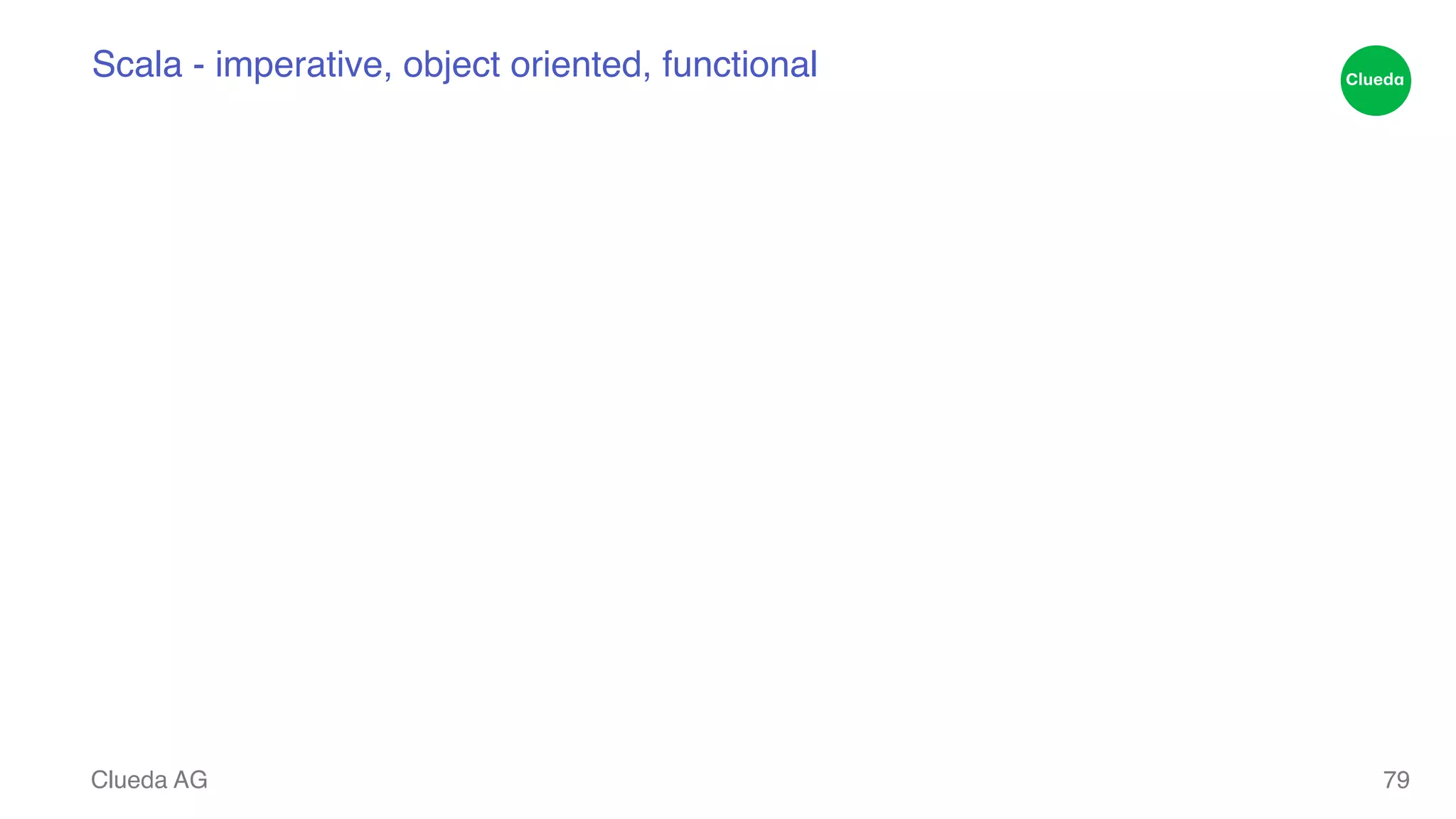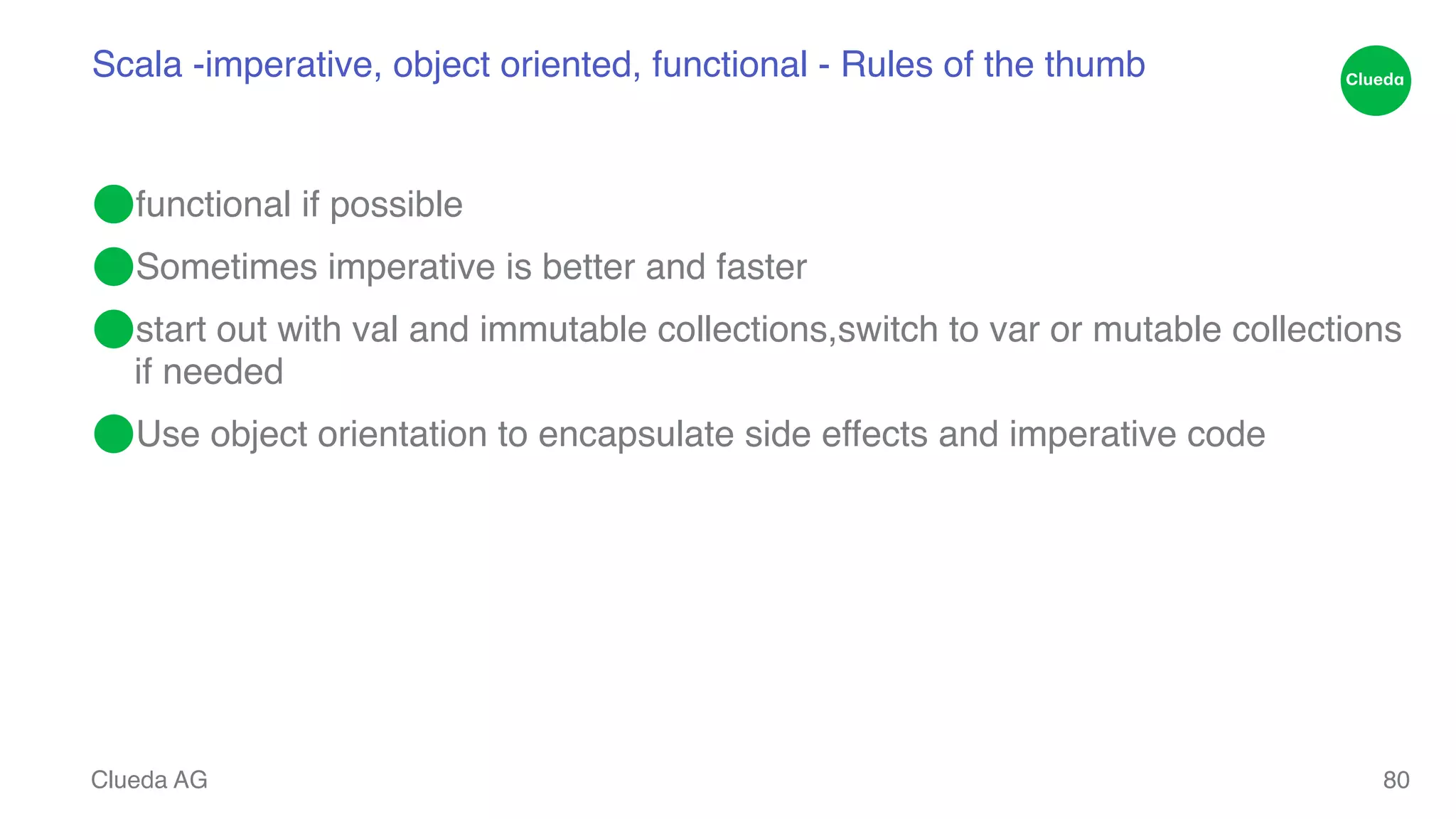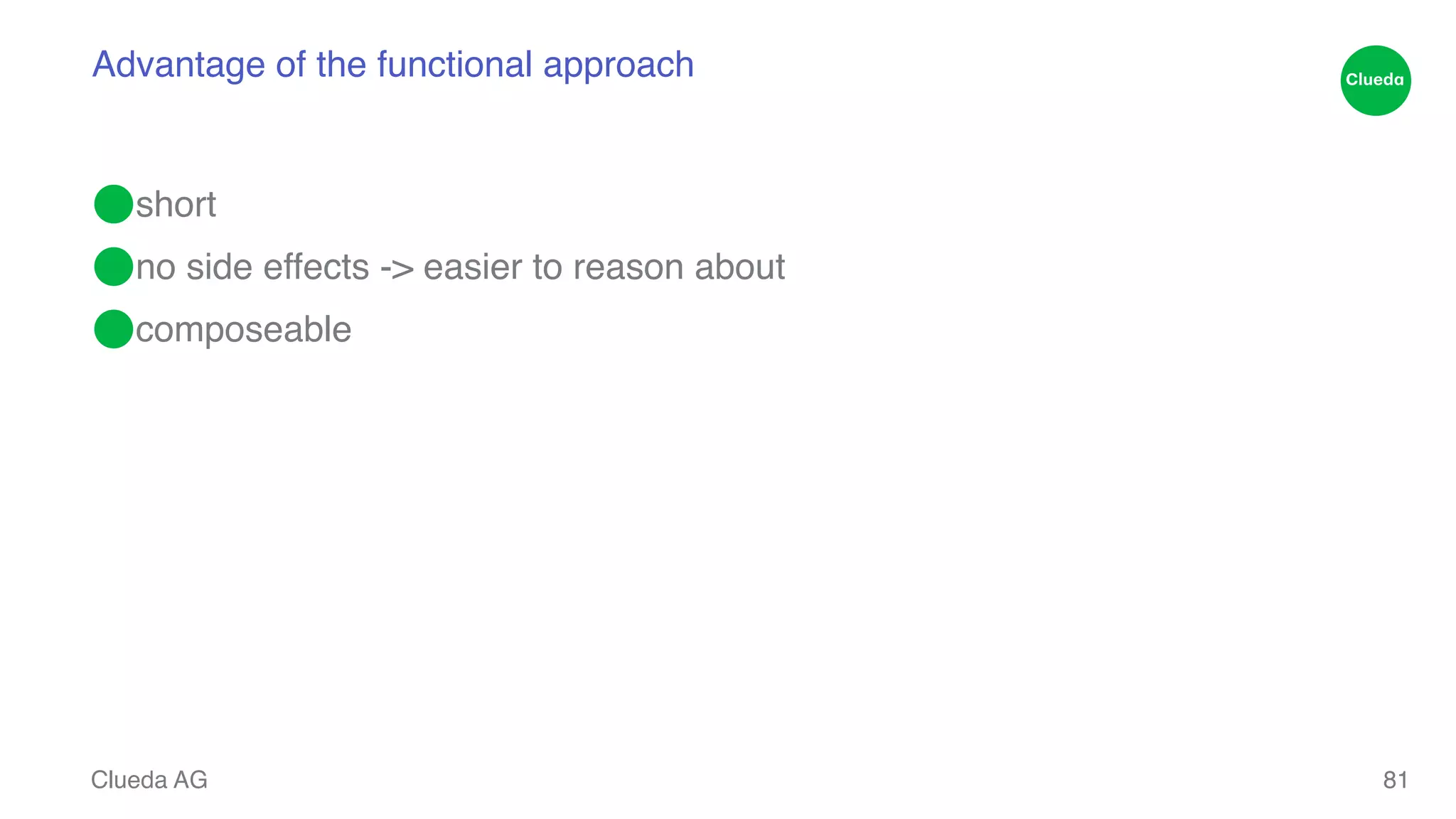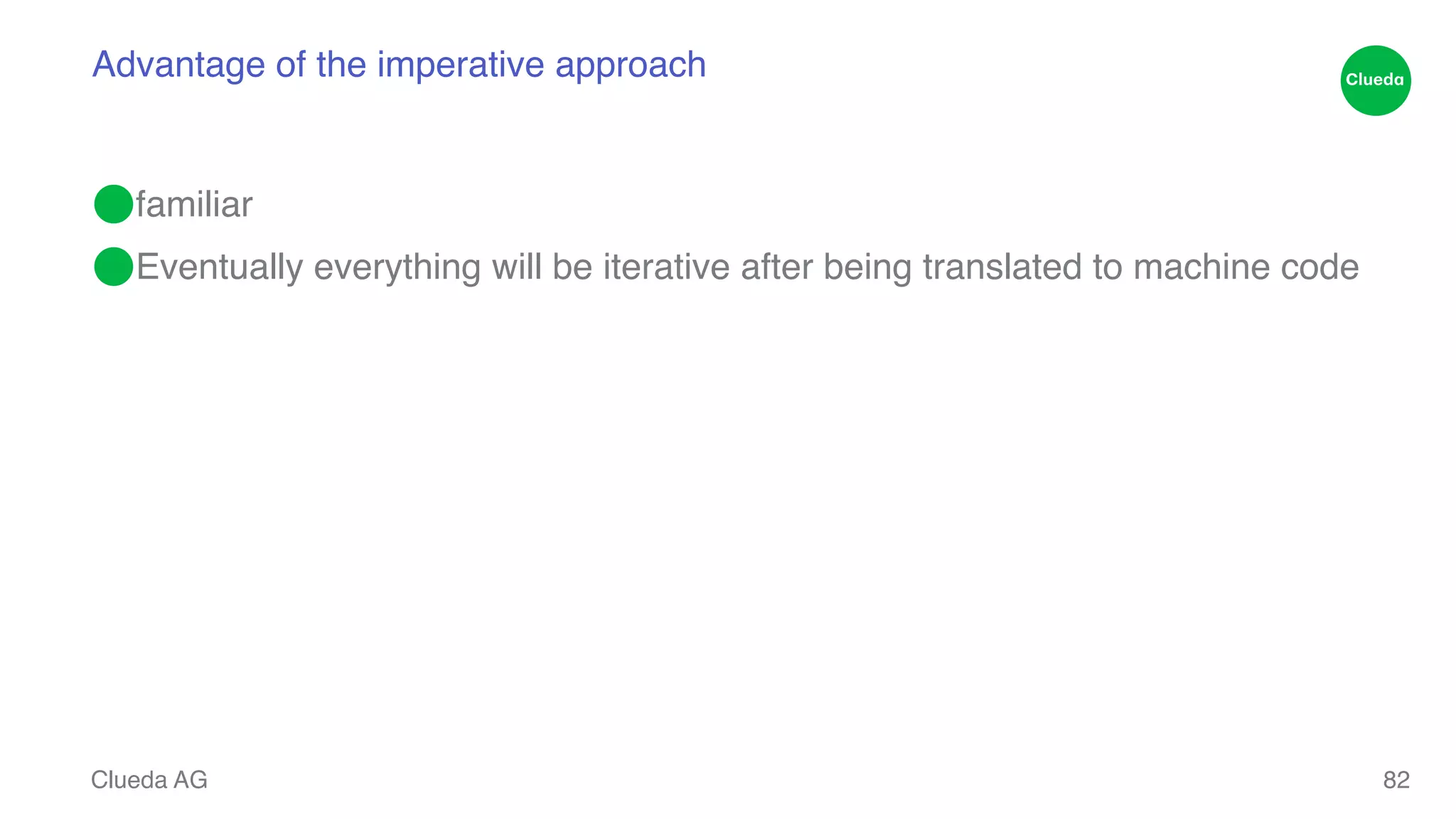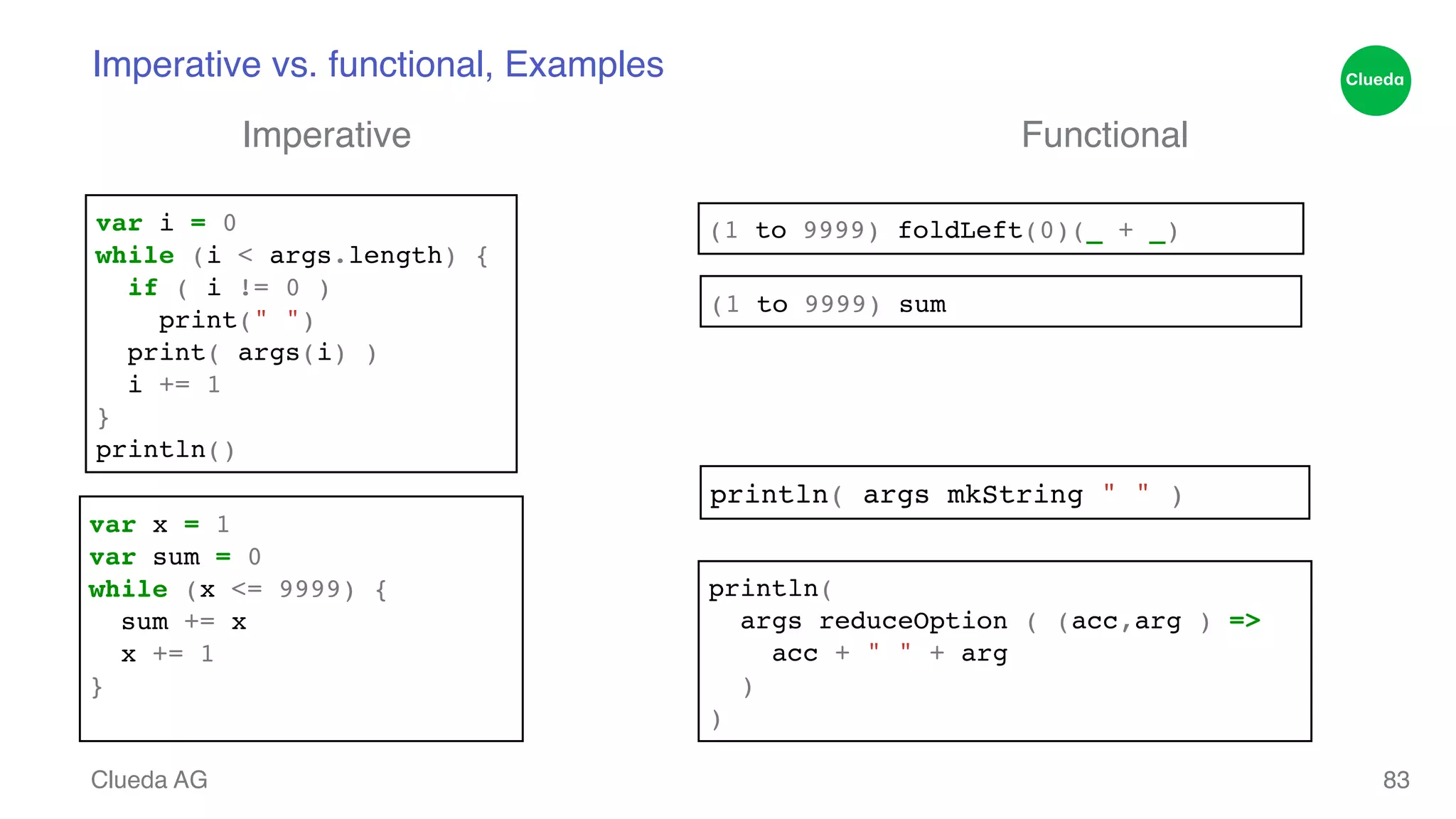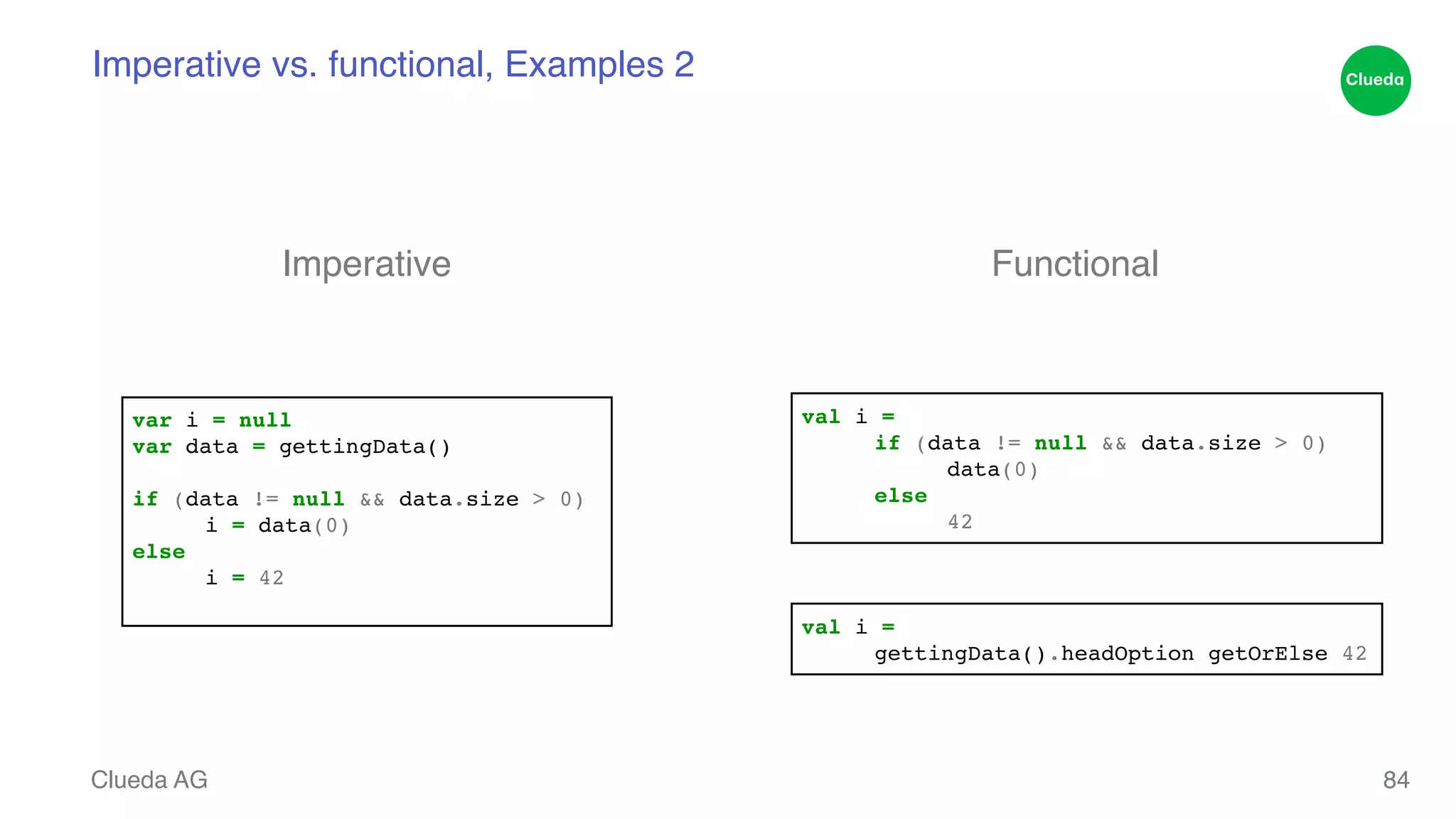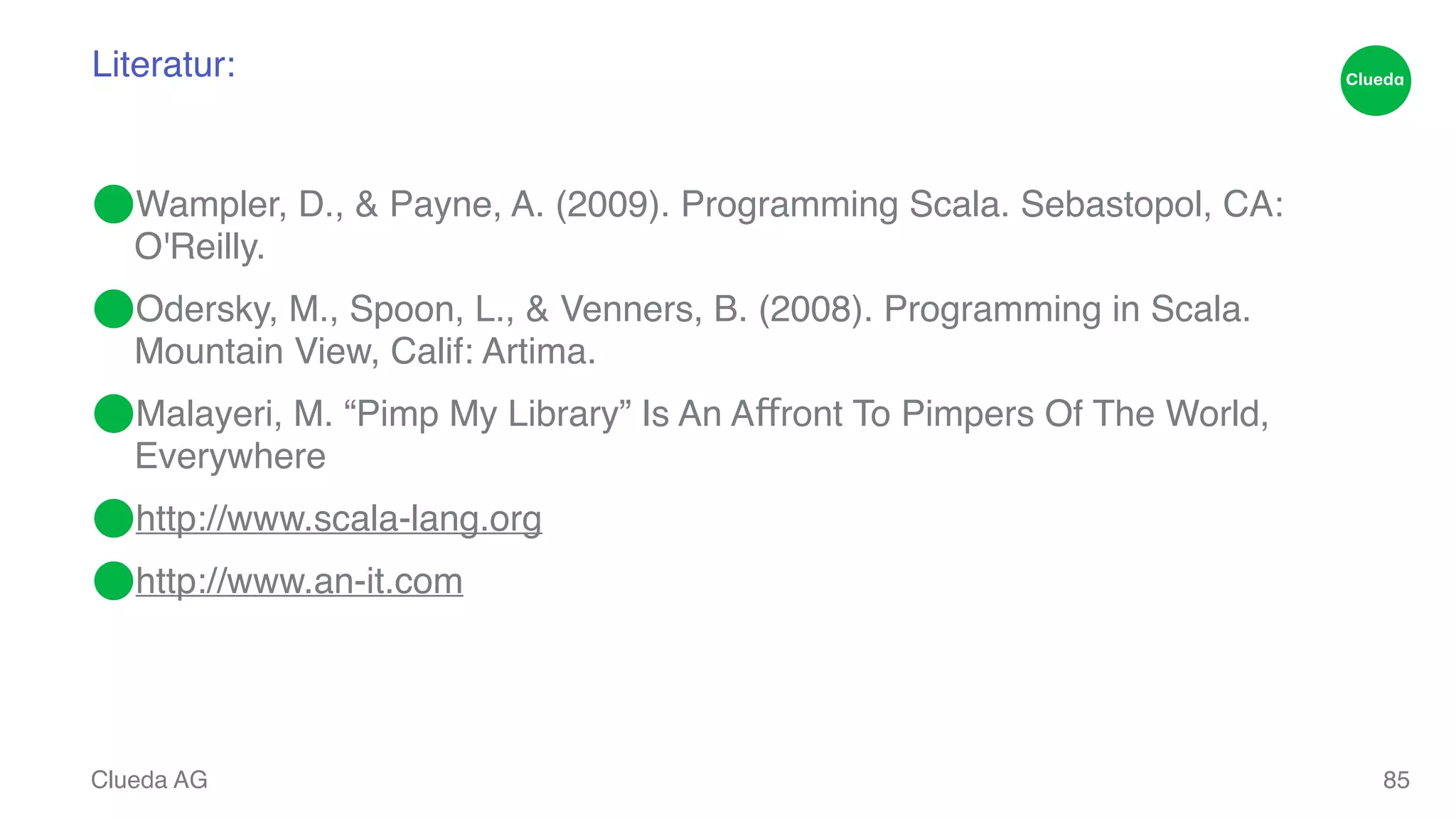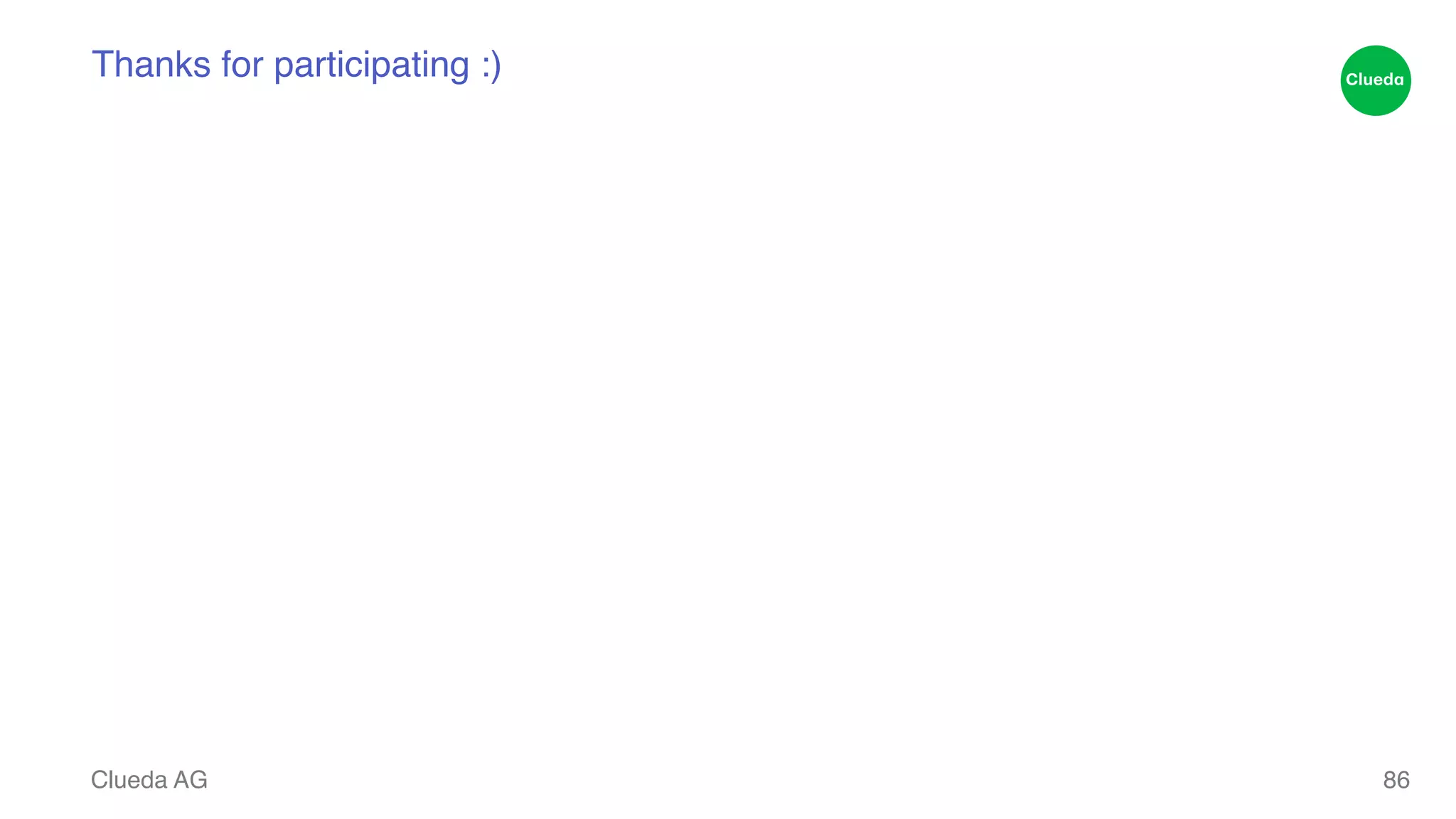This document provides an introduction to the Scala programming language. It begins with a brief history of Scala and overview of its core concepts like vals, classes, objects, traits, and functions. It also covers intermediate concepts like pattern matching, Option, XML and Futures. The document discusses Scala's support for functional and object-oriented programming and how it compiles to Java bytecode. It provides examples of using Scala's collections and control structures and describes features like classes, objects, traits and case classes.
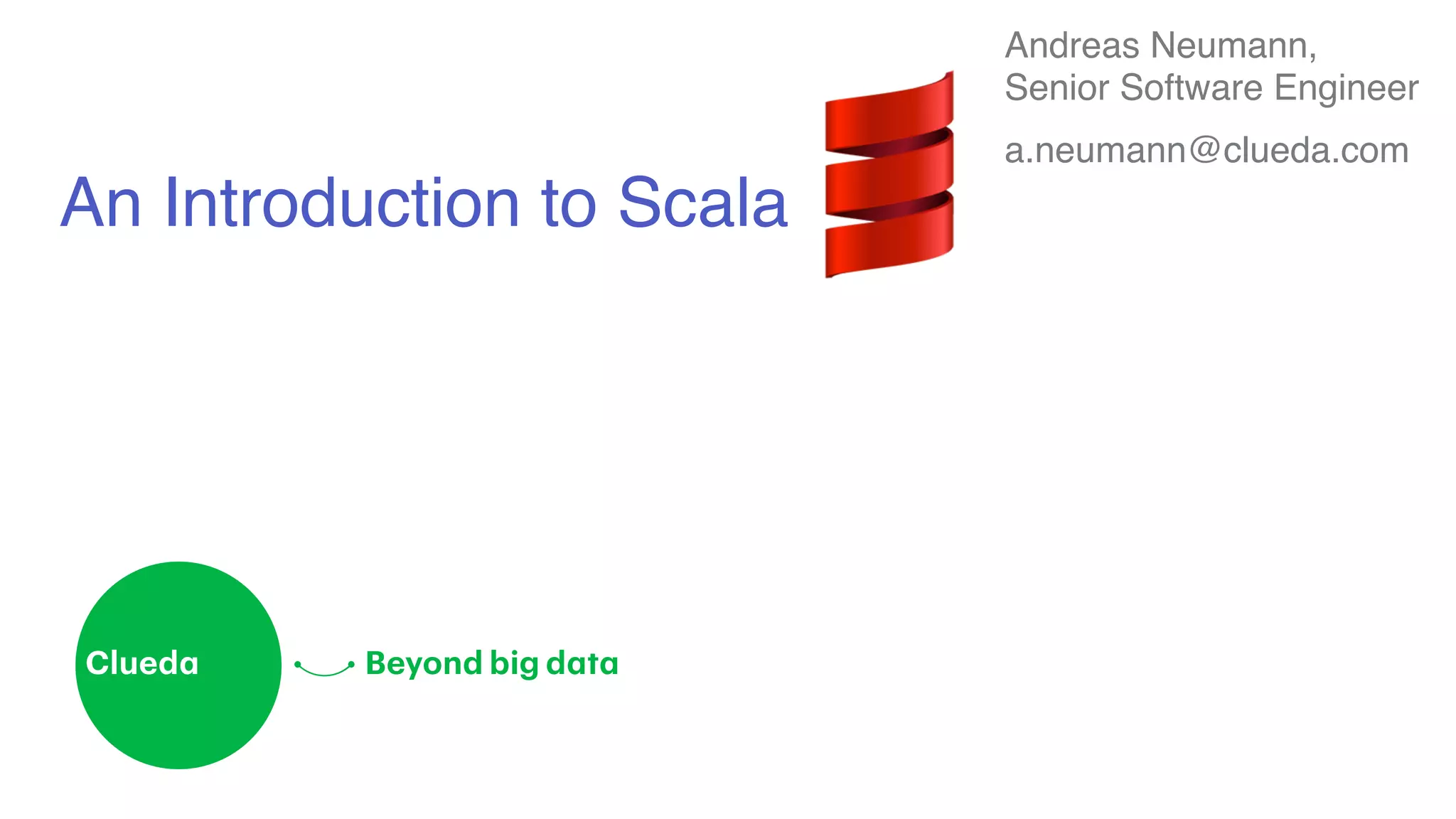
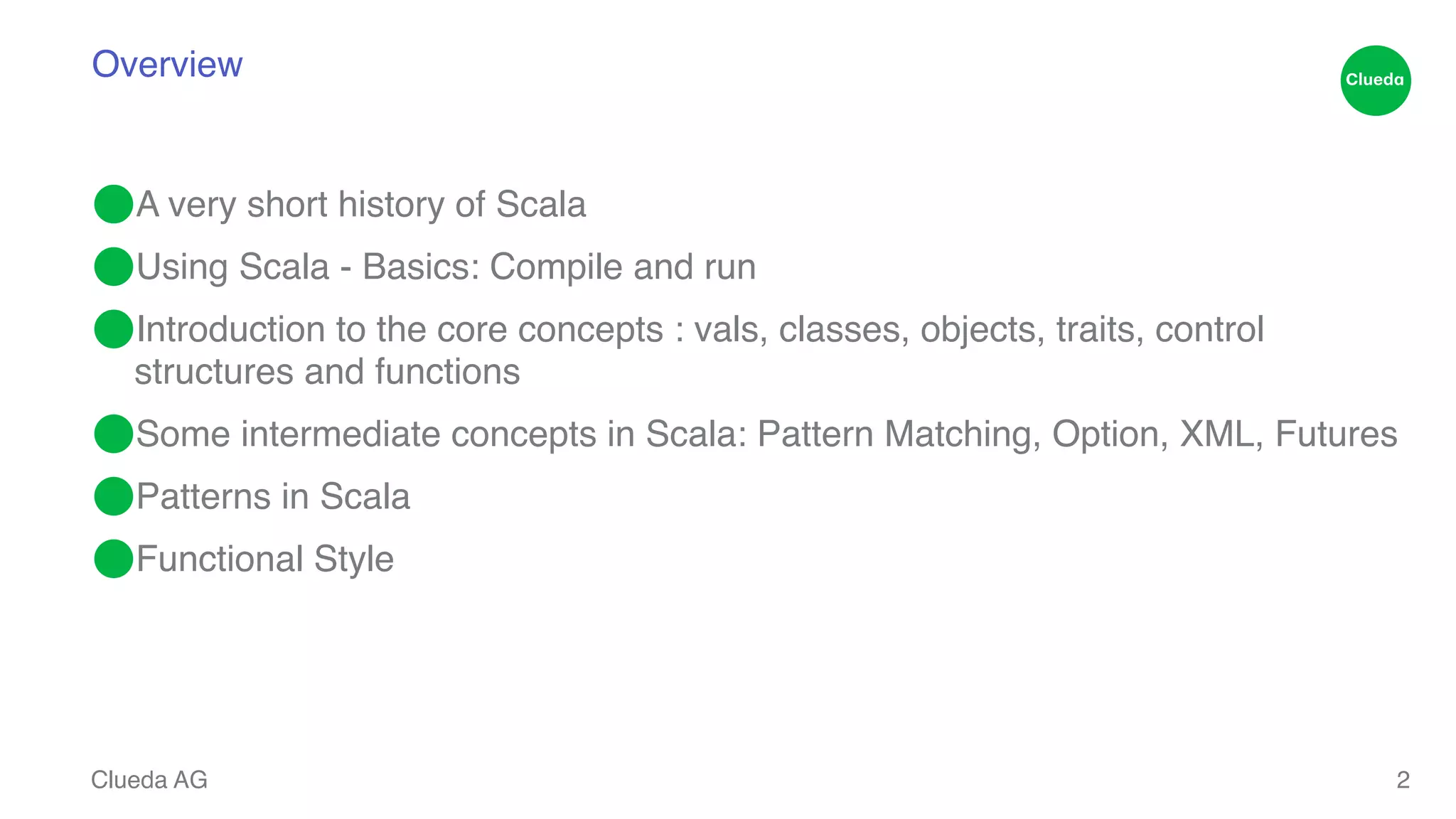
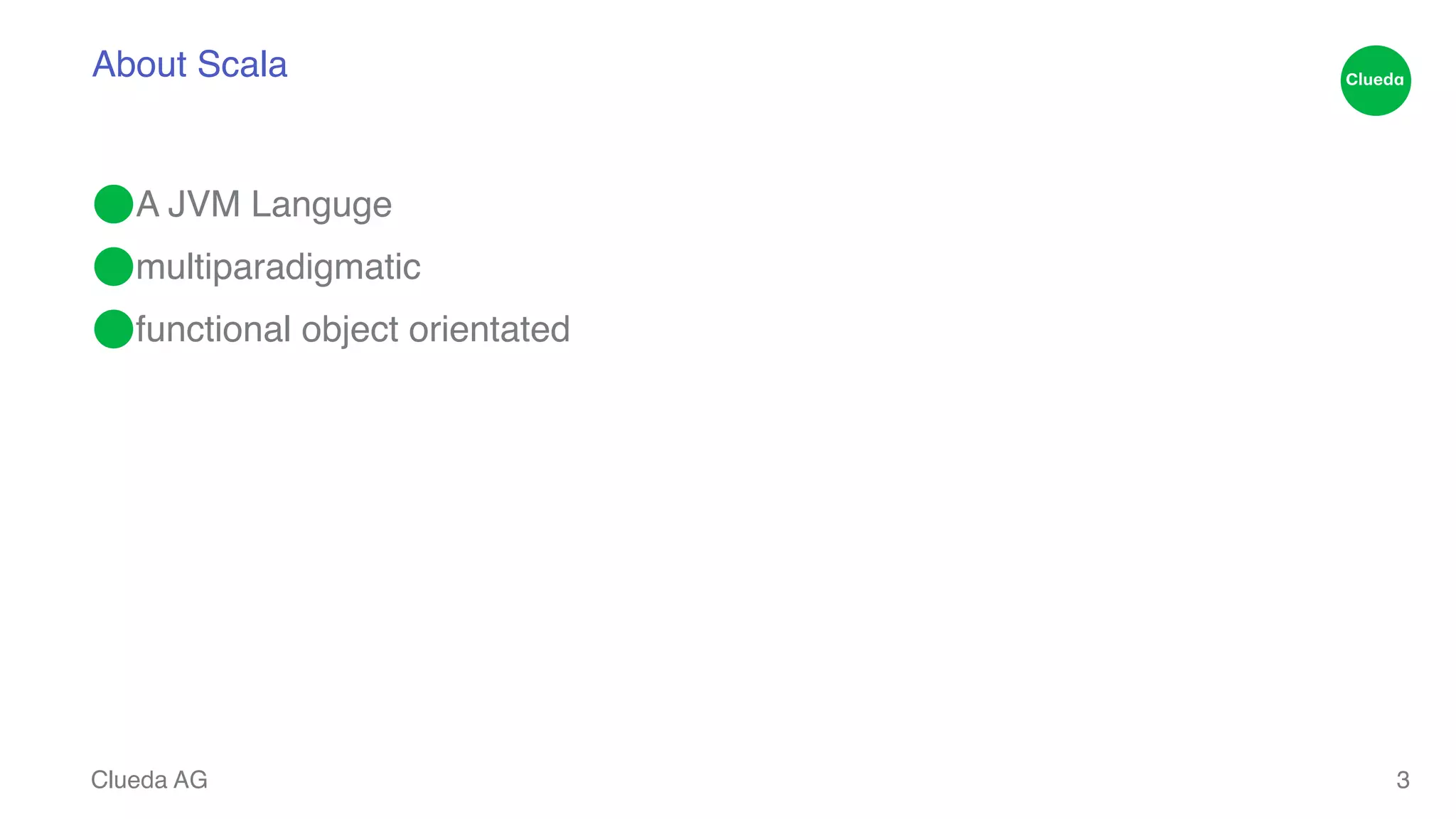
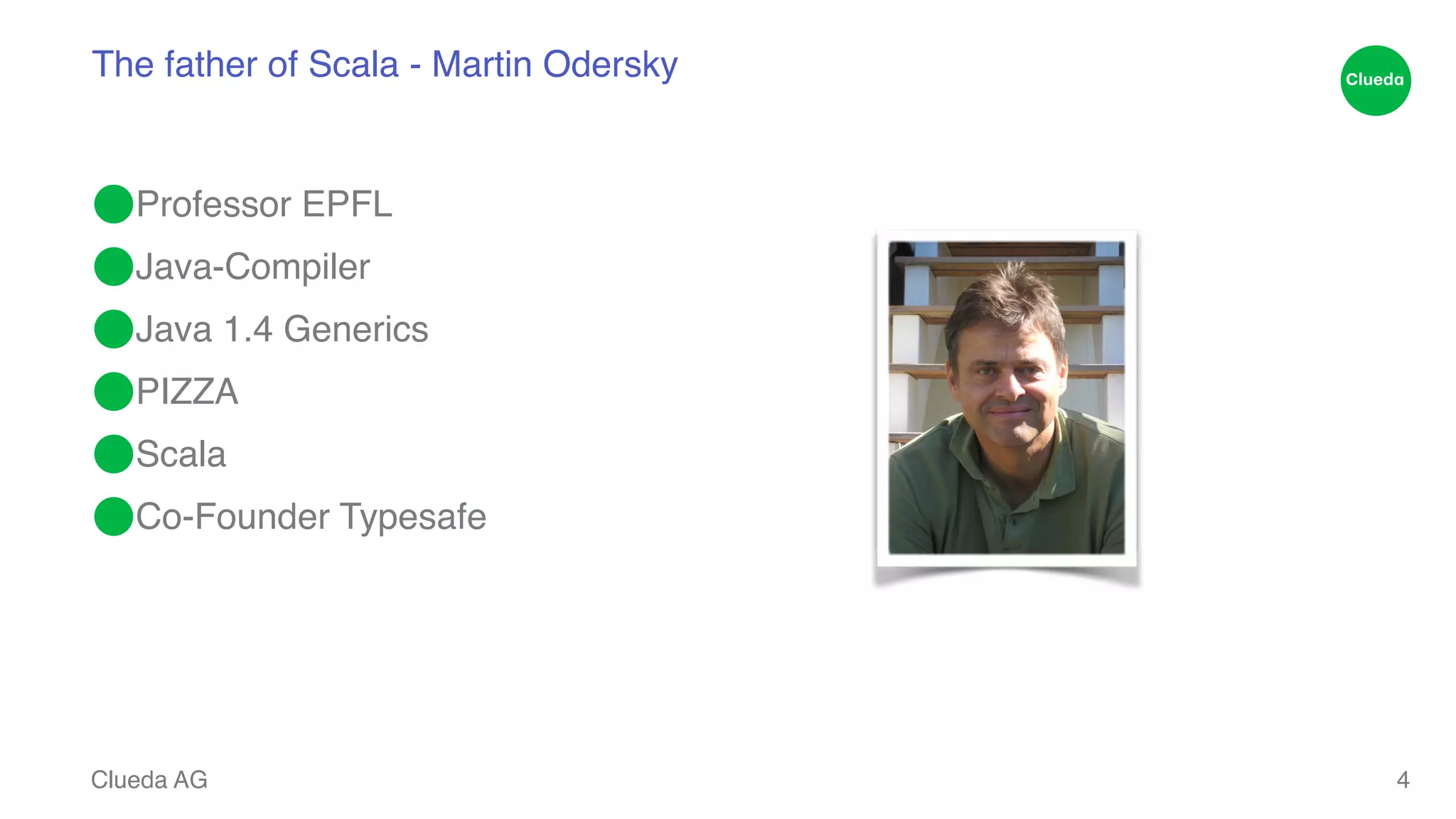
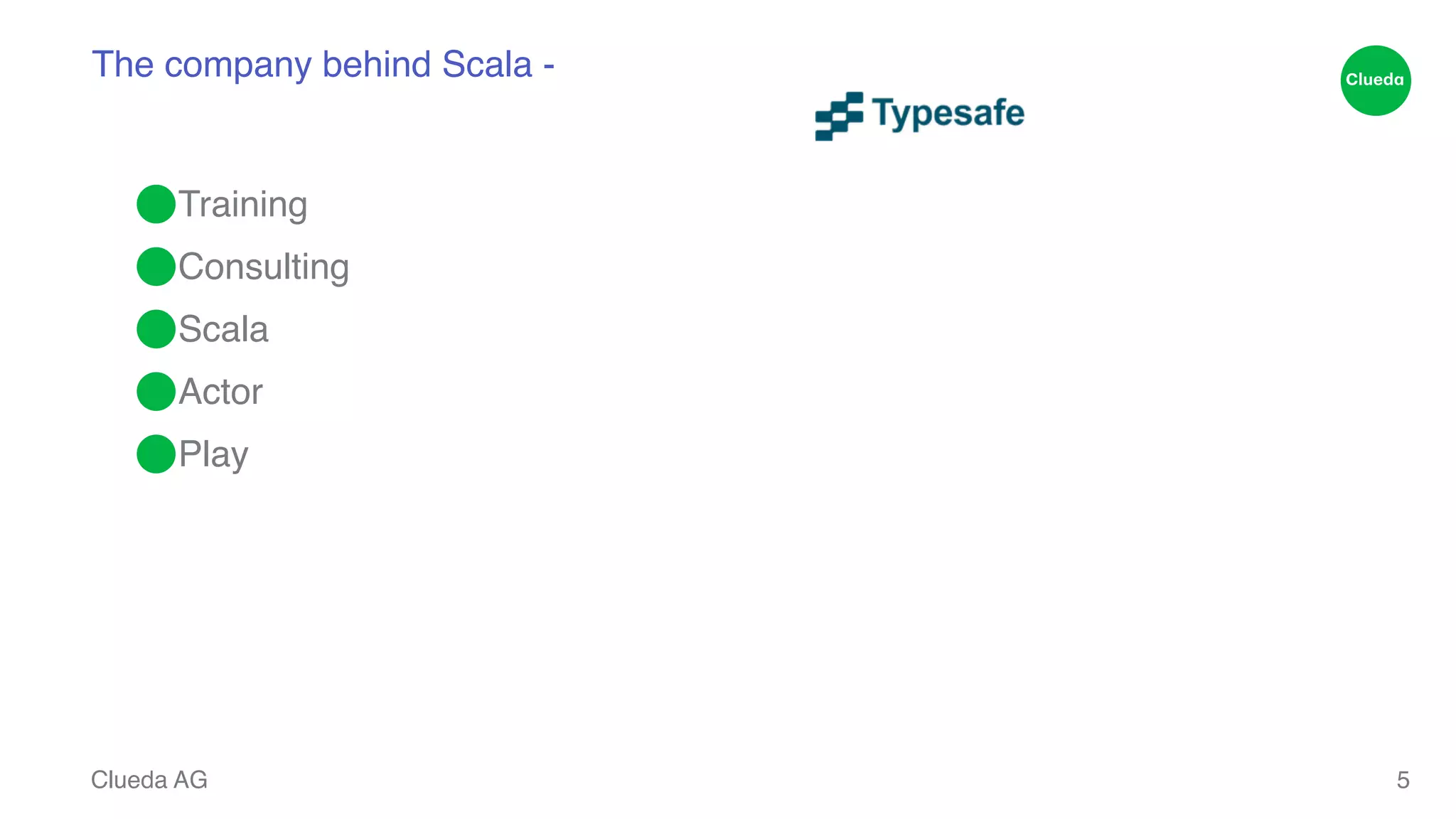
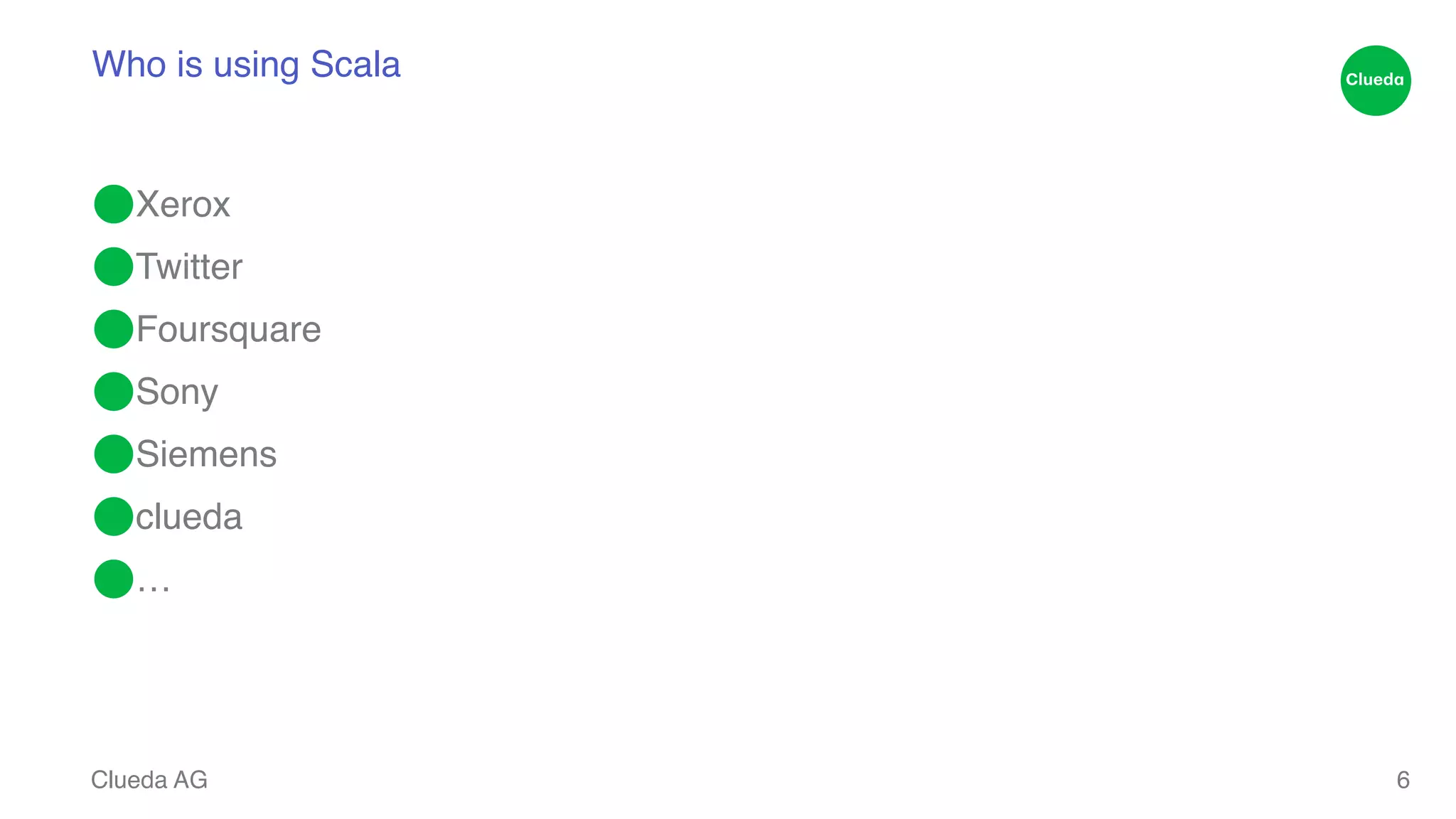
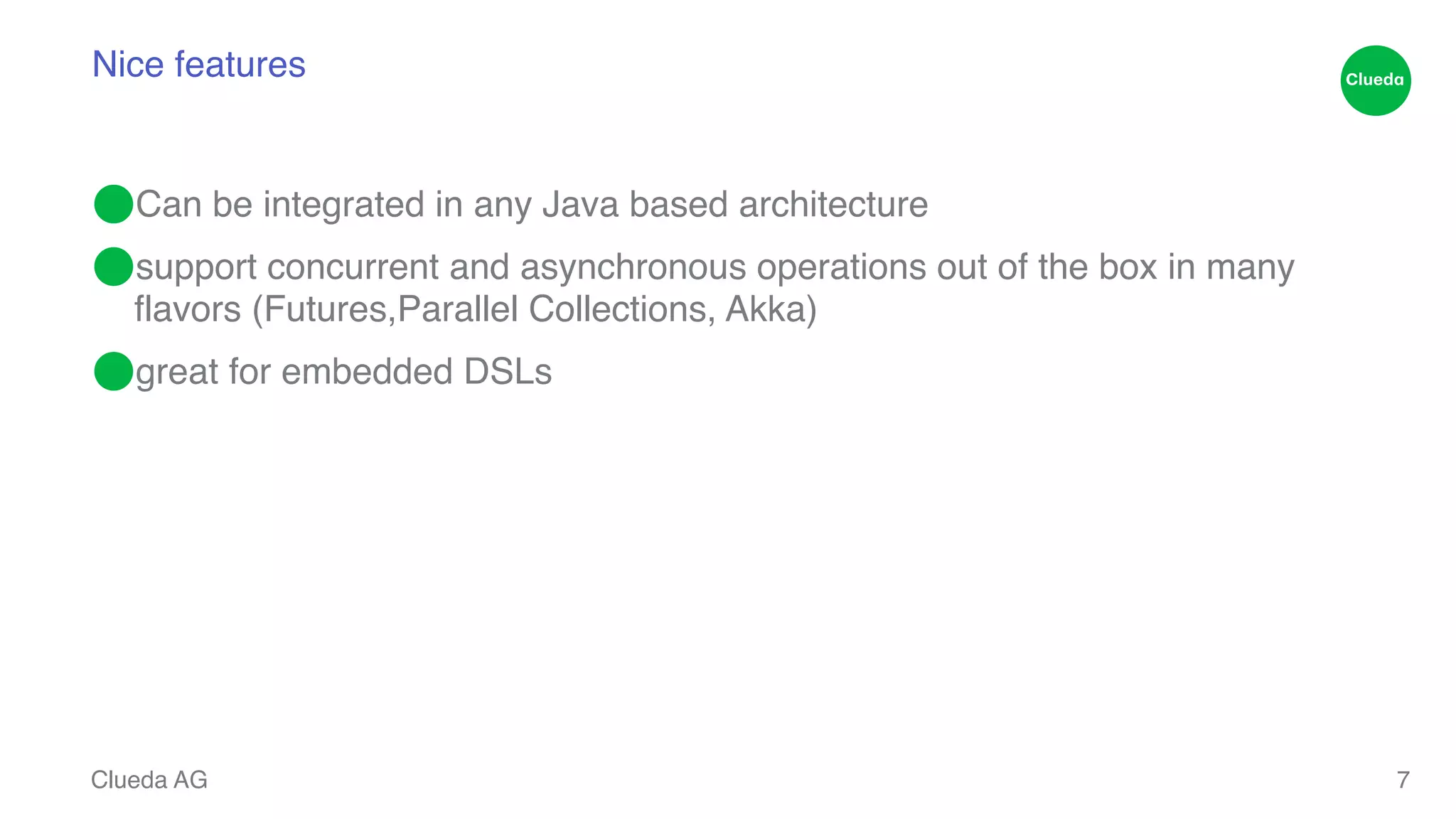
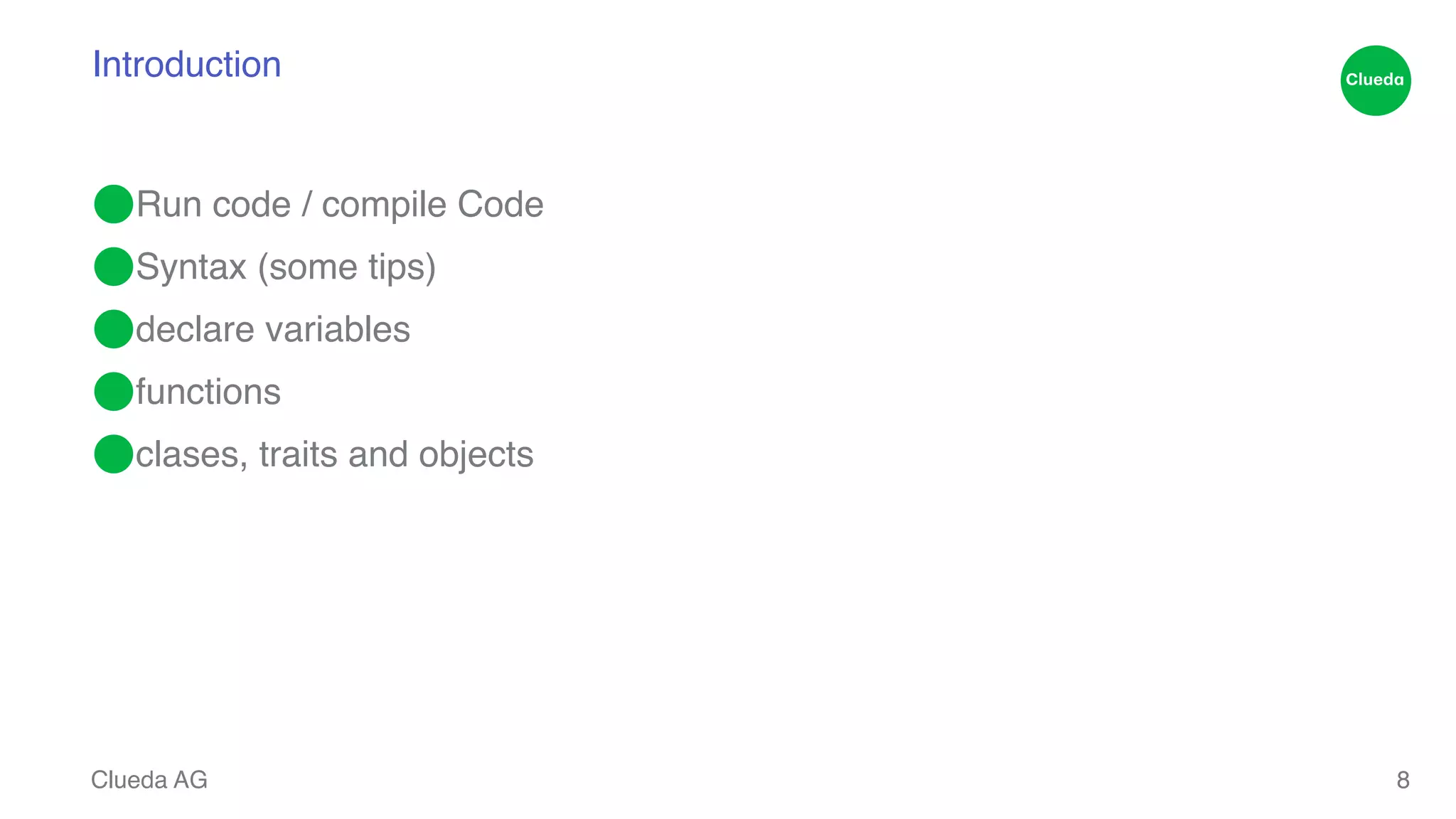
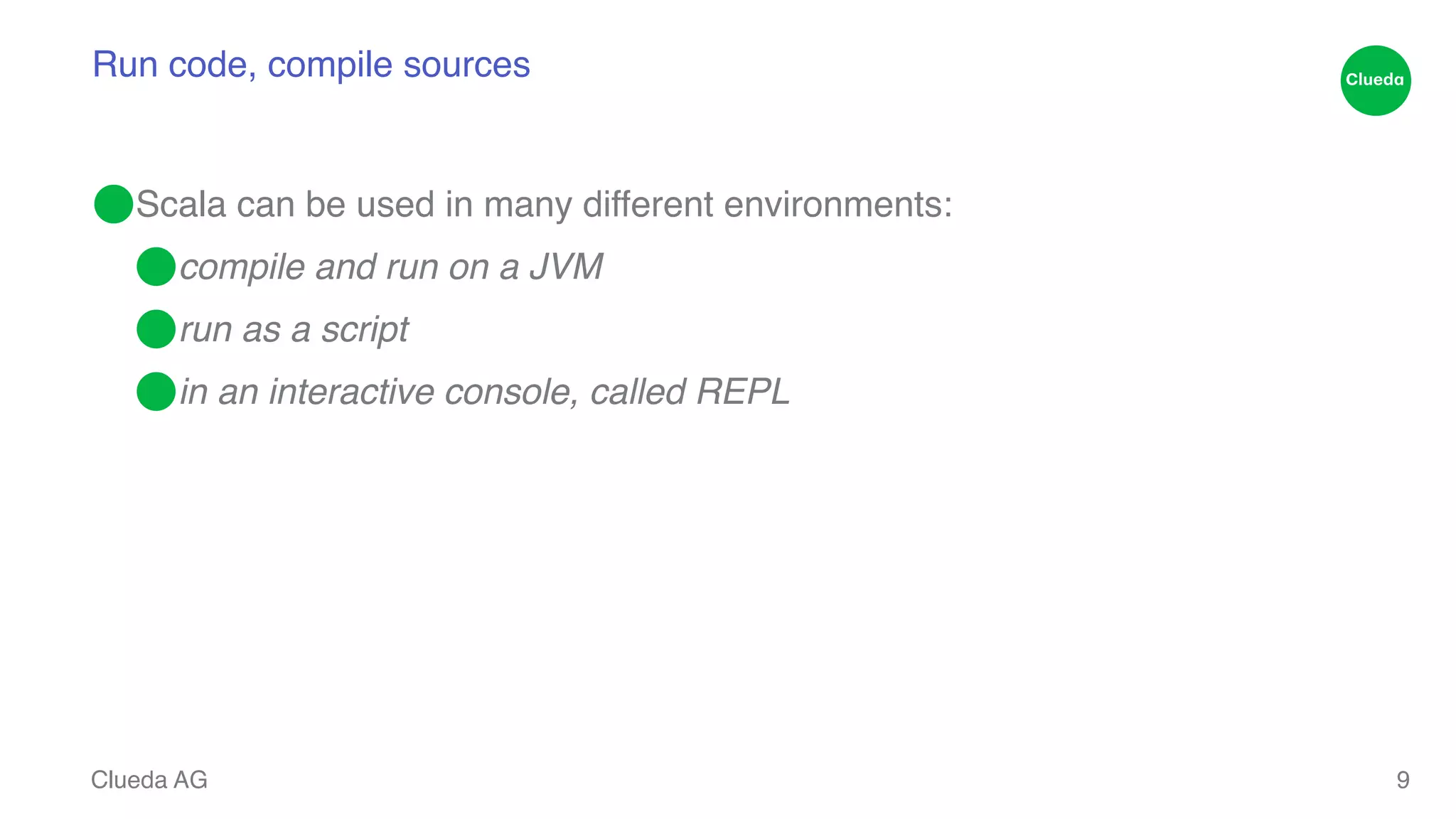
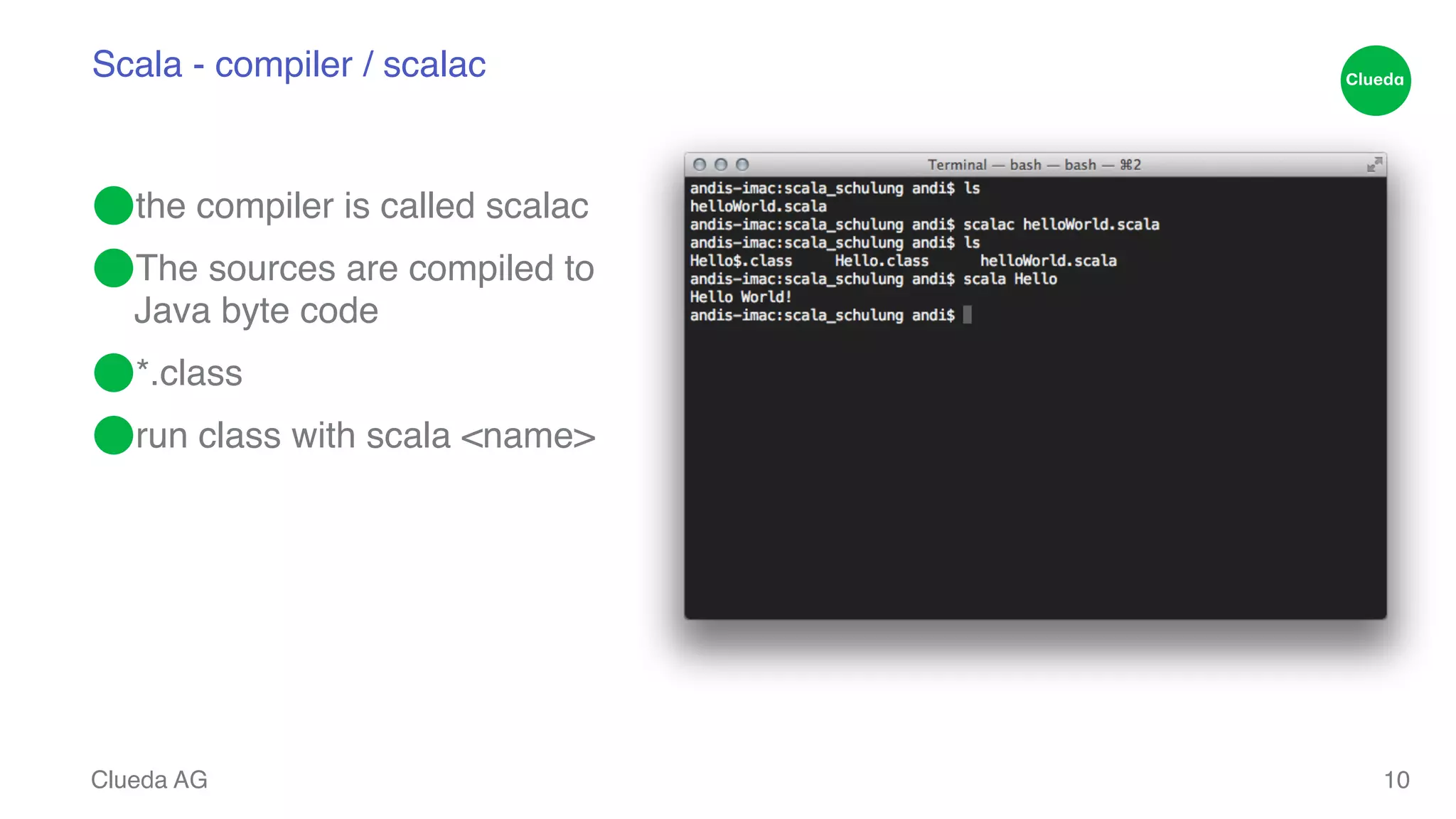
![Scripting with Scala - Unix ⬤Scala can be used as scripting language! ⬤change mode to executeable or run by bash Clueda AG 11 #!/bin/sh exec scala "$0" "$@" !# ! object HelloWorld { def main(args: Array[String]) { println("Hello, world! " + args.toList) } } HelloWorld.main(args)](https://image.slidesharecdn.com/clueda-scala-workshop-ci-141022021937-conversion-gate02/75/Scala-Workshop-11-2048.jpg)
![Scripting with Scala - Windows ⬤Resembles UNIX use a batch script instead! ⬤*.bat! ⬤run Clueda AG 12 ::#!! @echo off! call scala %0 %*! goto :eof! ::!#! ! object HelloWorld {! def main(args: Array[String]) {! println("Hello, world! " +! args.toList)! }! }! ! HelloWorld.main(args)](https://image.slidesharecdn.com/clueda-scala-workshop-ci-141022021937-conversion-gate02/75/Scala-Workshop-12-2048.jpg)
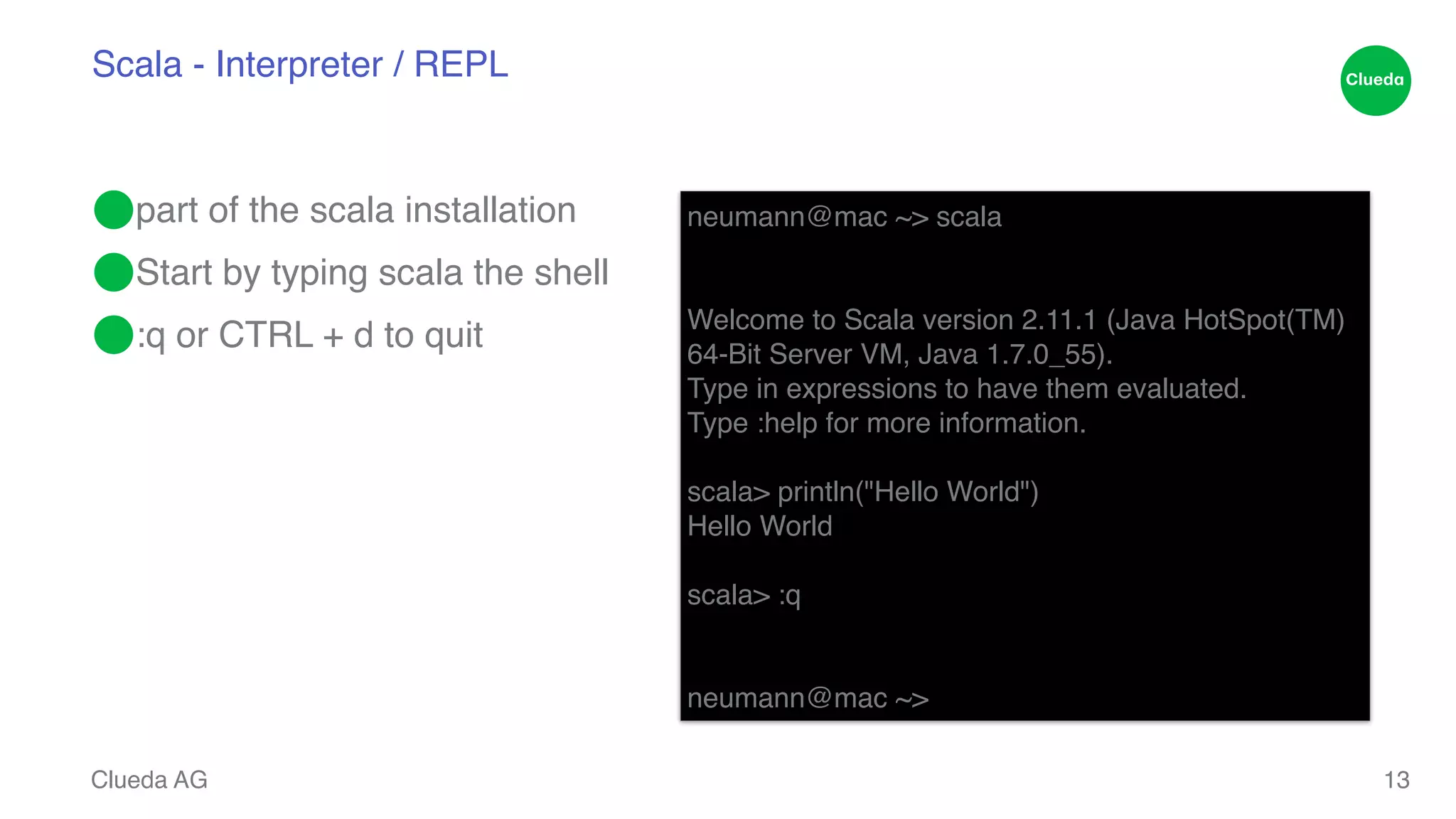
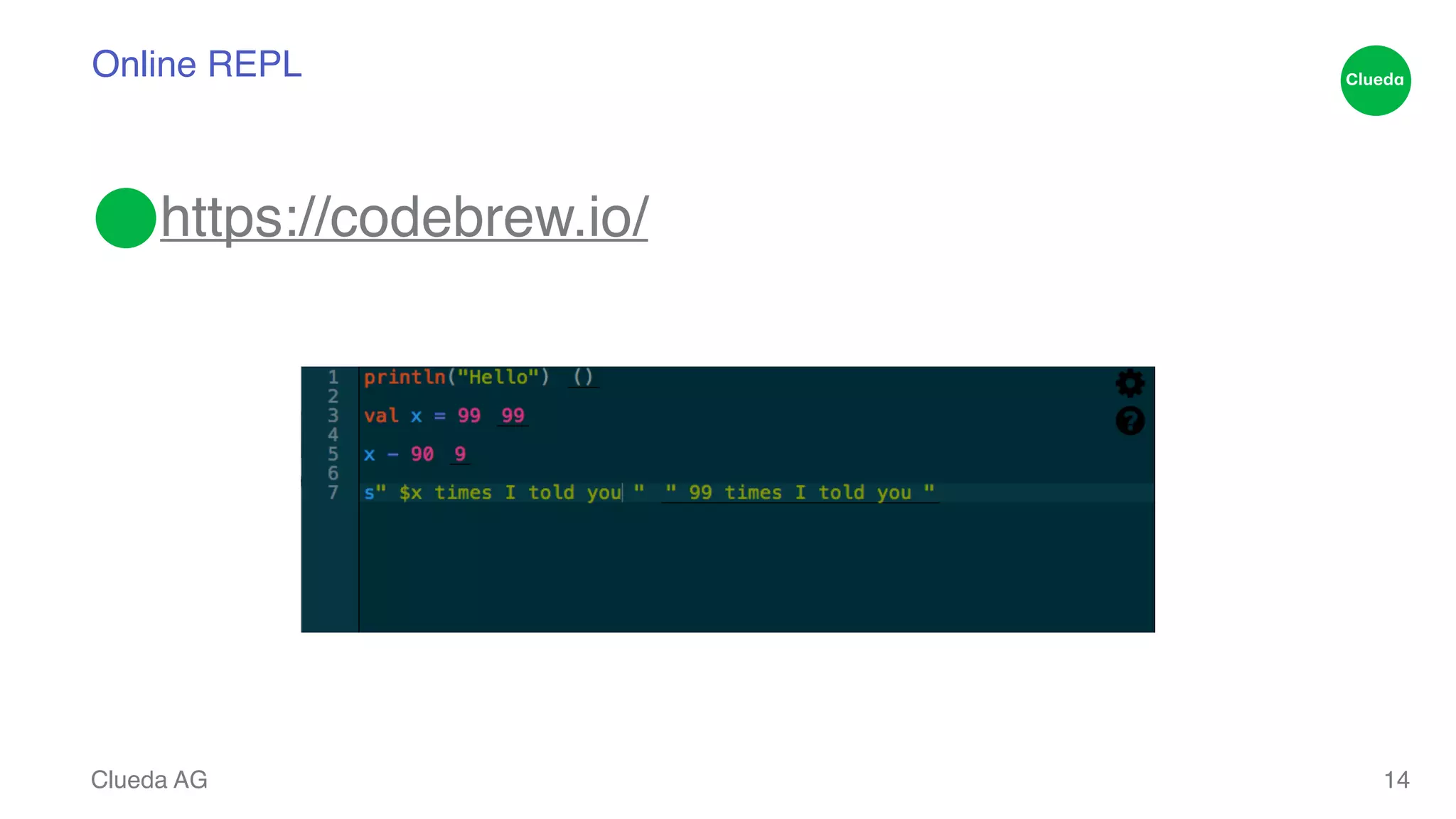
![Syntax ⬤No need for „;“ , one expression per line ! ⬤Still possible to add ; if for example you want several expression within one line! ⬤The dot on method invocations can be dropped. It is best practice to do so with infix invocation but not with postfix operations. Clueda AG 15 "Hallo Welt !".split(" ")! //res0: Array[String] = Array(Hallo, Welt, !)! ! scala> "Hallo Welt !" split " " ! //res2: Array[String] = Array(Hallo, Welt, !) scala> List(1,2.3).map(_ * 3).head! //res3: Double = 3.0! ! scala> ( List(1,2.3) map (_ * 3) ).head! //res4: Double = 3.0](https://image.slidesharecdn.com/clueda-scala-workshop-ci-141022021937-conversion-gate02/75/Scala-Workshop-15-2048.jpg)
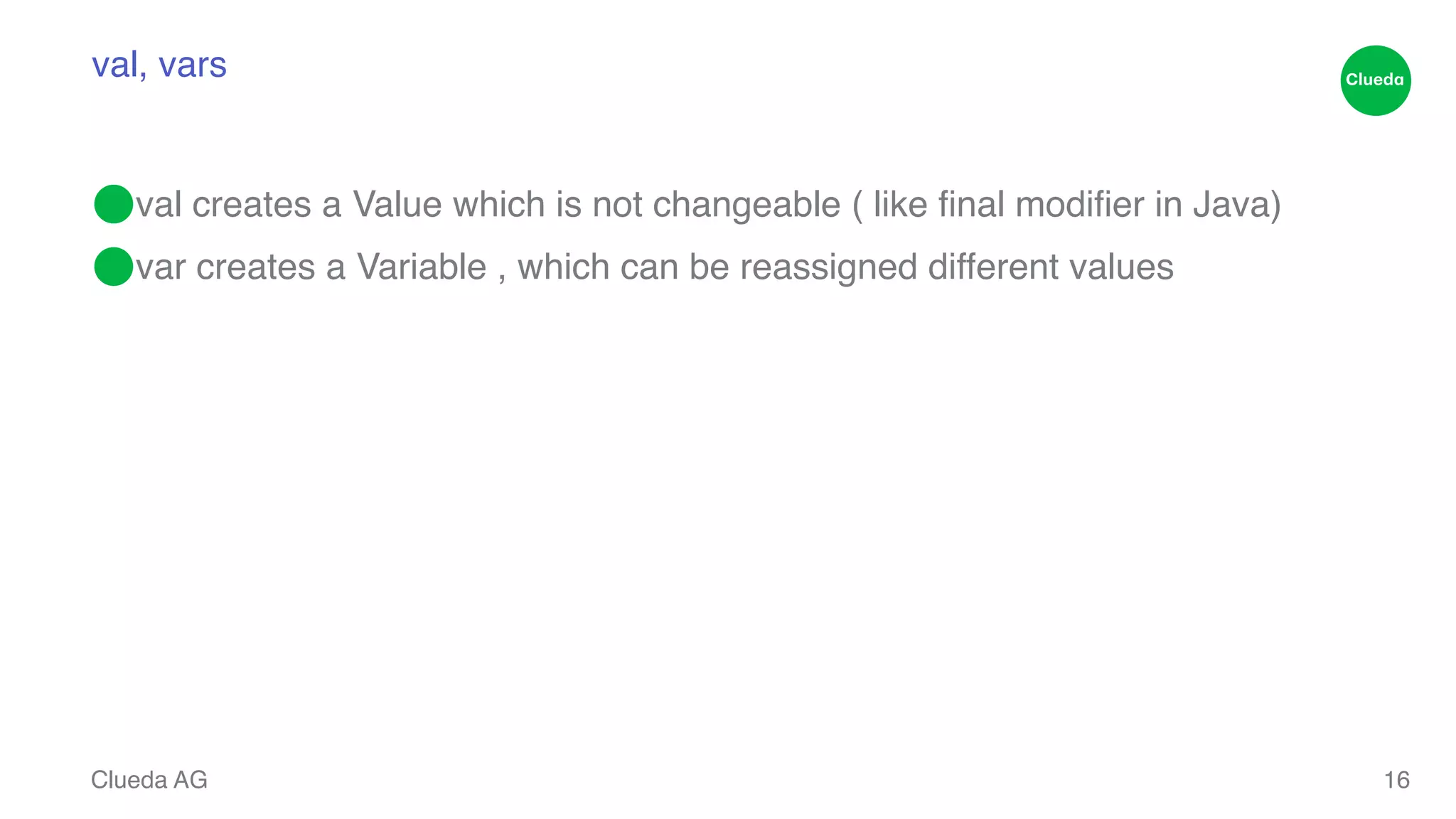
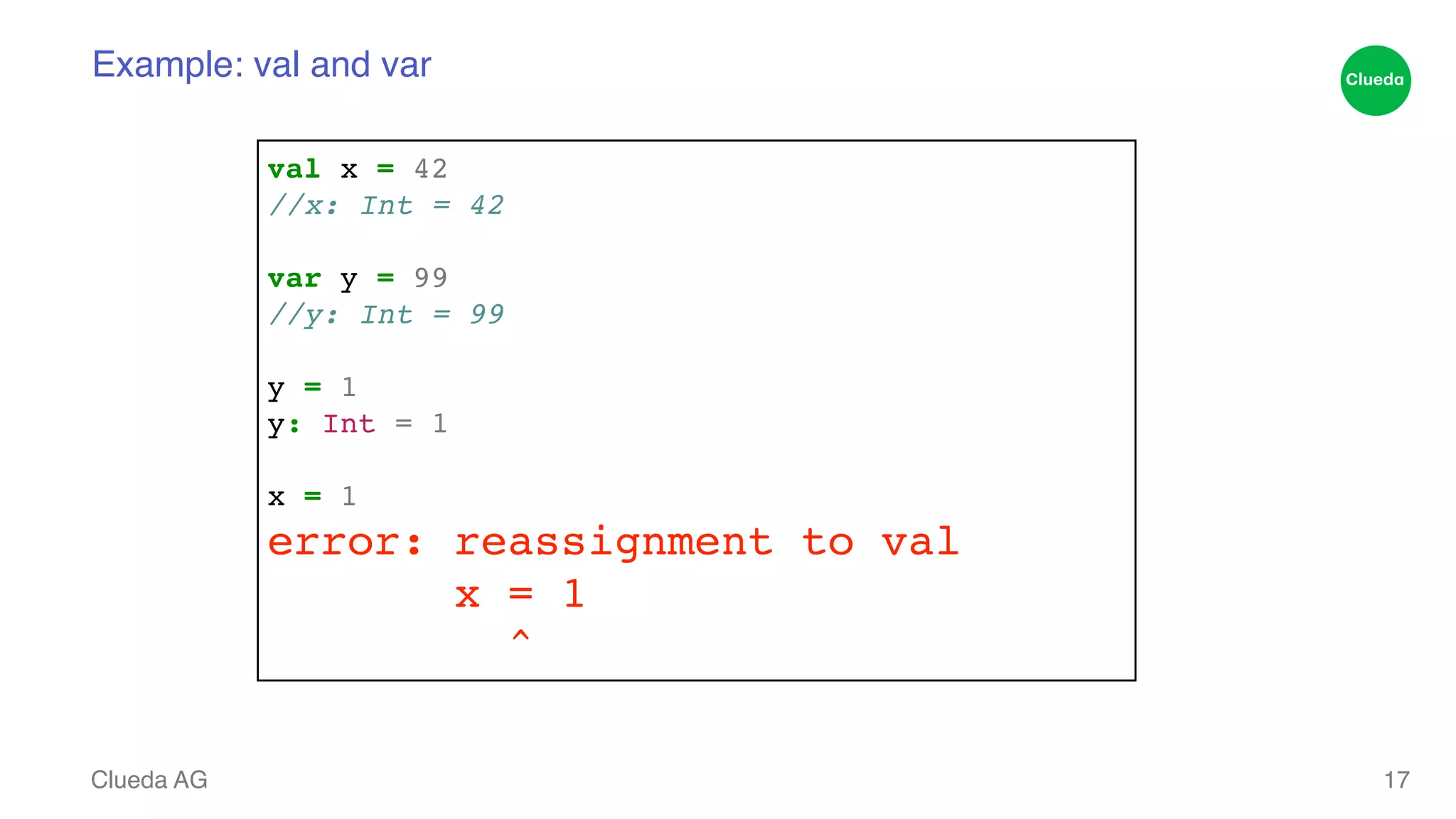
![Types and type inferrence ⬤Types are introduced after : which is written behind the var/val! ! ⬤Giving the type explicitly is optional as the type inference can infer the type. It’s considered good style to add the type information nonetheless. Clueda AG 18 s : String = "ein String" val a = "Hallo"! //a: java.lang.String = Hallo! ! val b = 1! //b: Int = 1! ! val c = 3.5! //c: Double = 3.5! ! val d = List(1,2.0)! //d: List[Double] = List(1.0, 2.0)](https://image.slidesharecdn.com/clueda-scala-workshop-ci-141022021937-conversion-gate02/75/Scala-Workshop-18-2048.jpg)
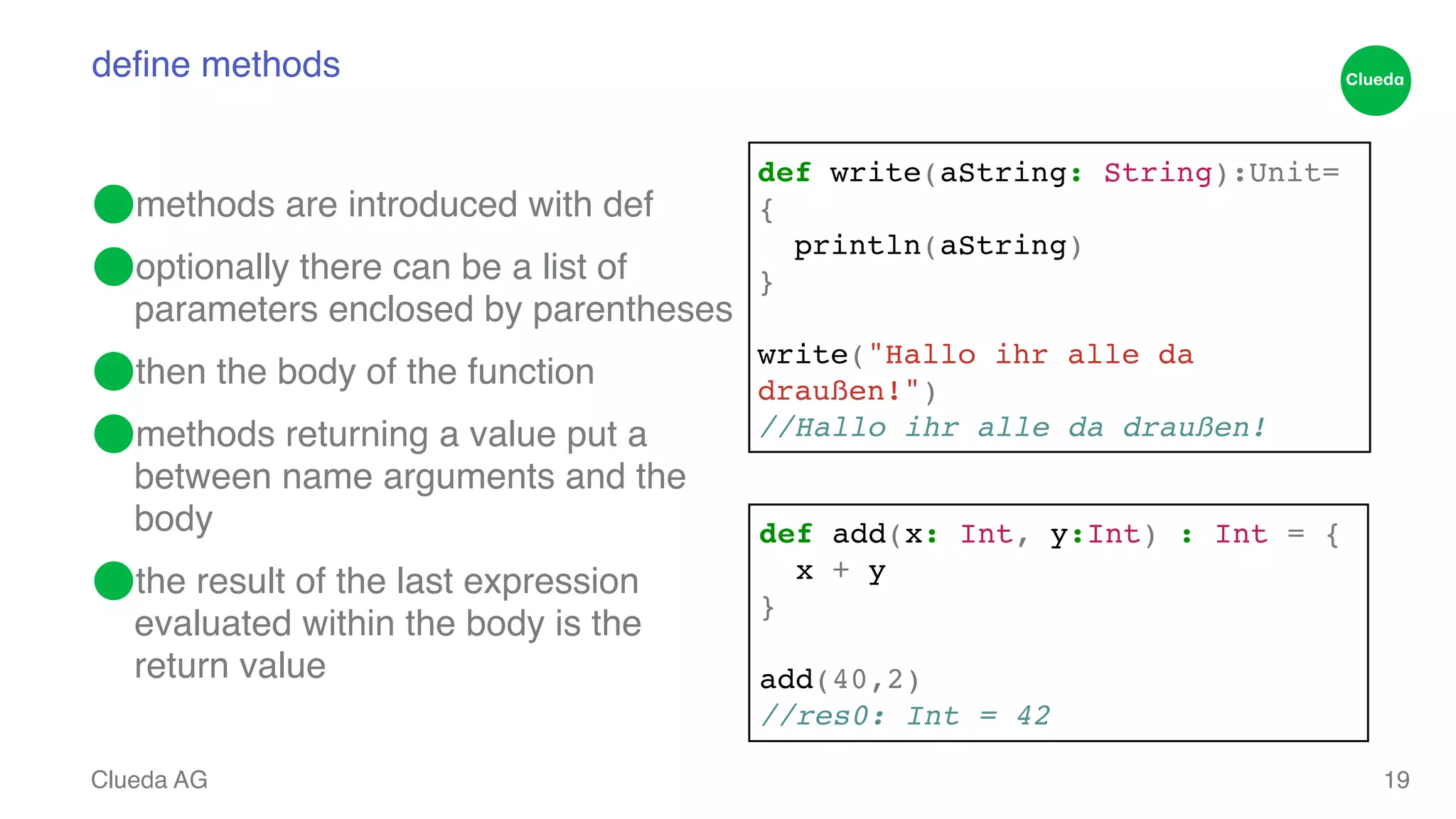
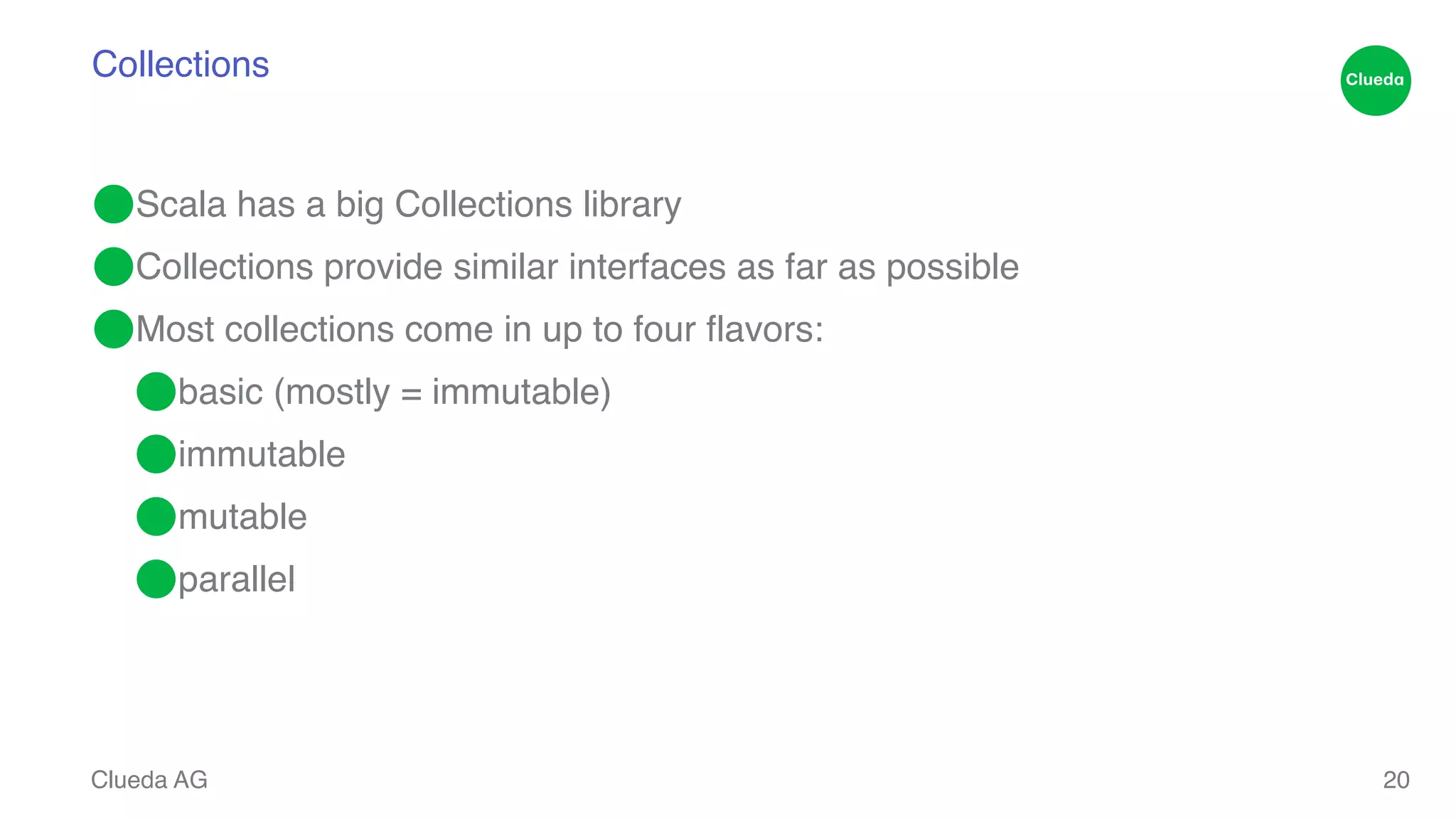
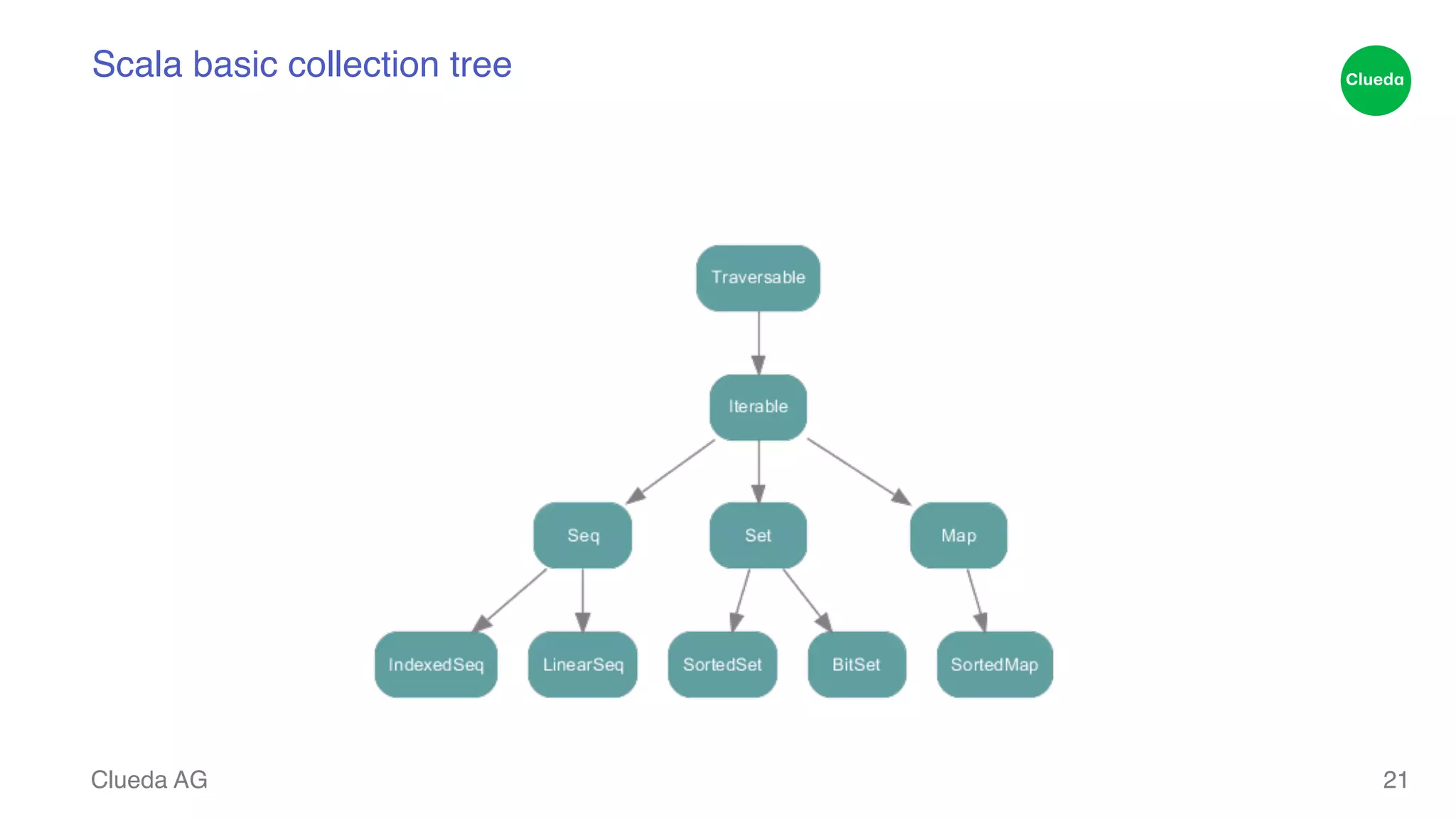
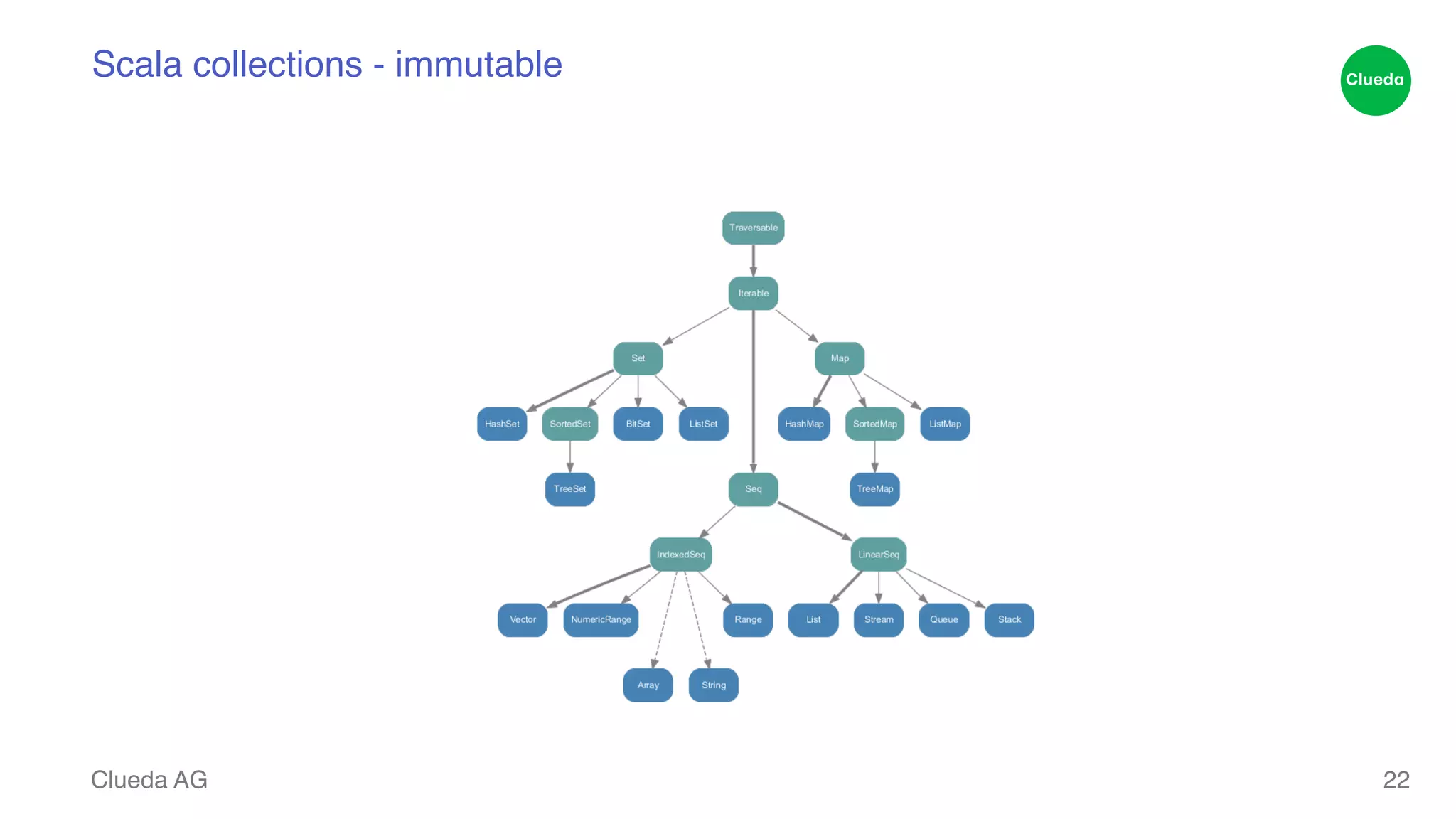
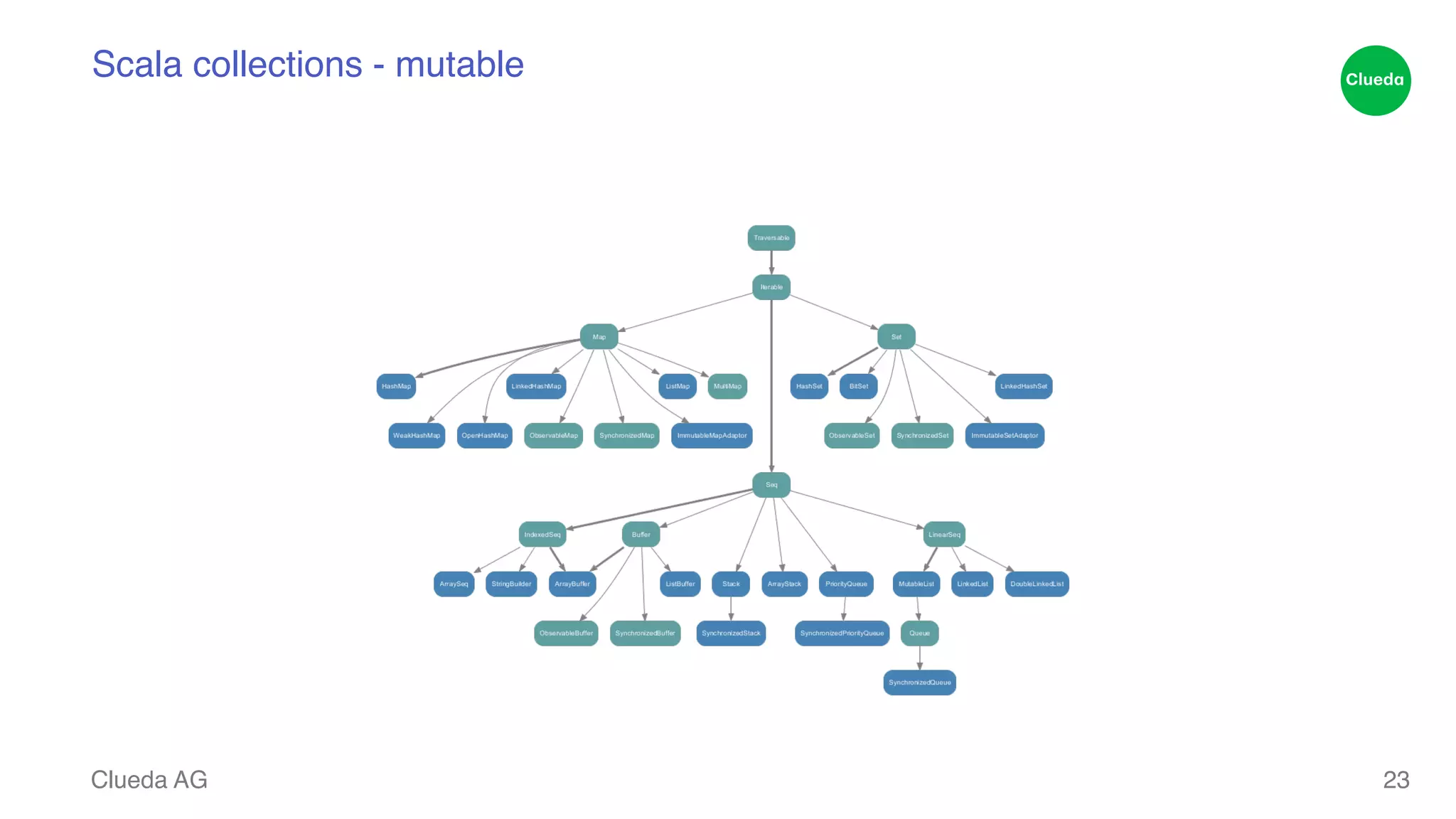
![Scala Collections Example : List (1 / 2) Clueda AG 24 val a = List("a","b","c")! // a: List[java.lang.String] = List(a, b, c)! val b = List(1,2,3)! //b: List[Int] = List(1, 2, 3)! ! a.head! // java.lang.String = a! a.tail! // List[java.lang.String] = List(b, c)! ! 0 :: b! // List[Int] = List(0, 1, 2, 3)! a ++ b! // List[Any] = List(a, b, c, 1, 2, 3)! a zip b! // List[(java.lang.String, Int)] = List((a,1), (b,2), (c,3))! a.sliding(2).toList! // List[List[String]] = List(List(a, b), List(b, c))!](https://image.slidesharecdn.com/clueda-scala-workshop-ci-141022021937-conversion-gate02/75/Scala-Workshop-24-2048.jpg)
![Scala Collections : Map Clueda AG 25 val counting = Map(1 -> "eins", 2 -> "zwei", 3 -> "drei")! // counting: scala.collection.immutable.Map[Int,java.lang.String] =! // Map((1,eins), (2,zwei), (3,drei))! ! counting(2)! //java.lang.String = zwei! ! counting.get(2)! //Option[java.lang.String] = Some(zwei)! ! counting get 99! // Option[java.lang.String] = None!](https://image.slidesharecdn.com/clueda-scala-workshop-ci-141022021937-conversion-gate02/75/Scala-Workshop-25-2048.jpg)
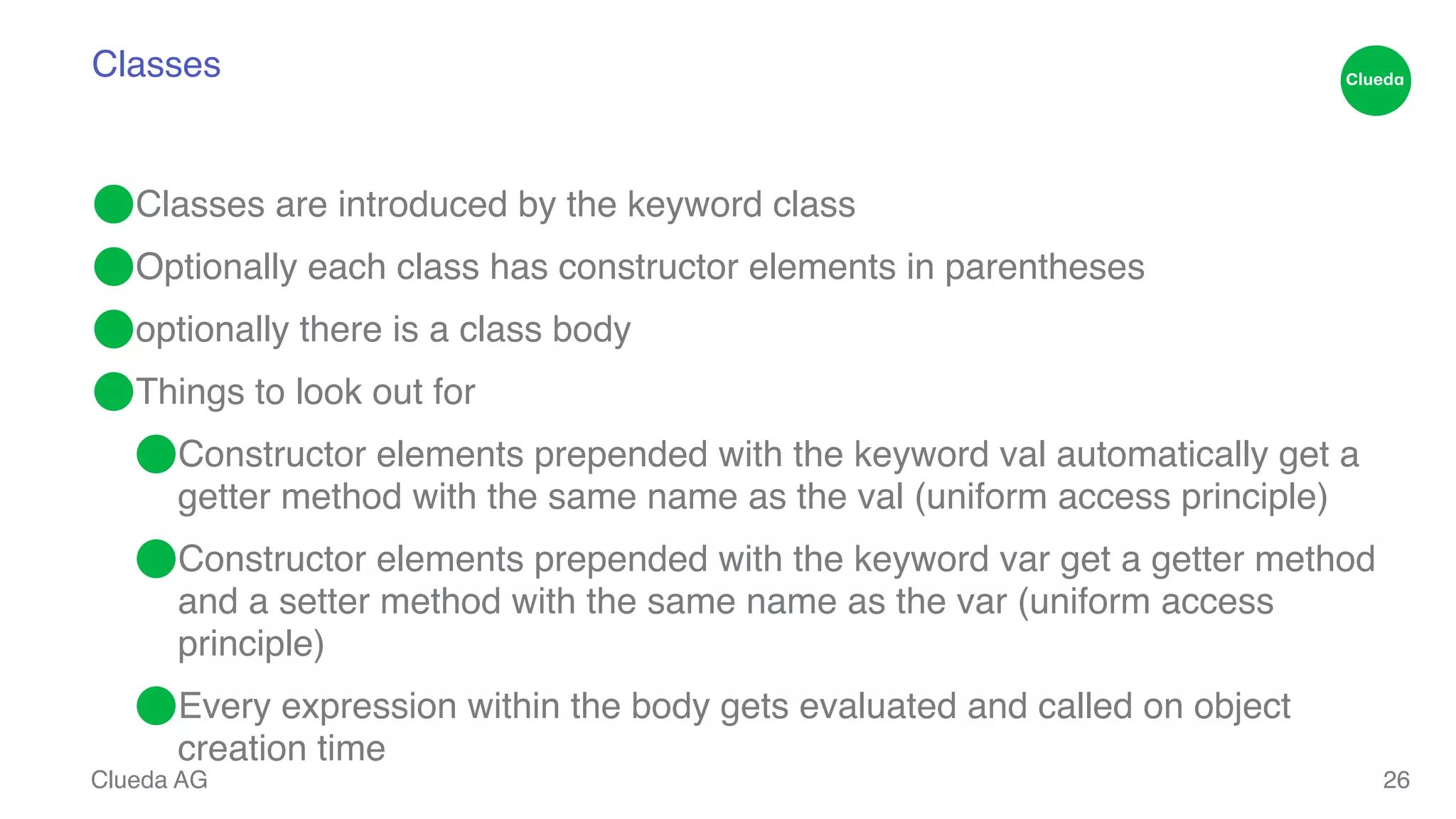
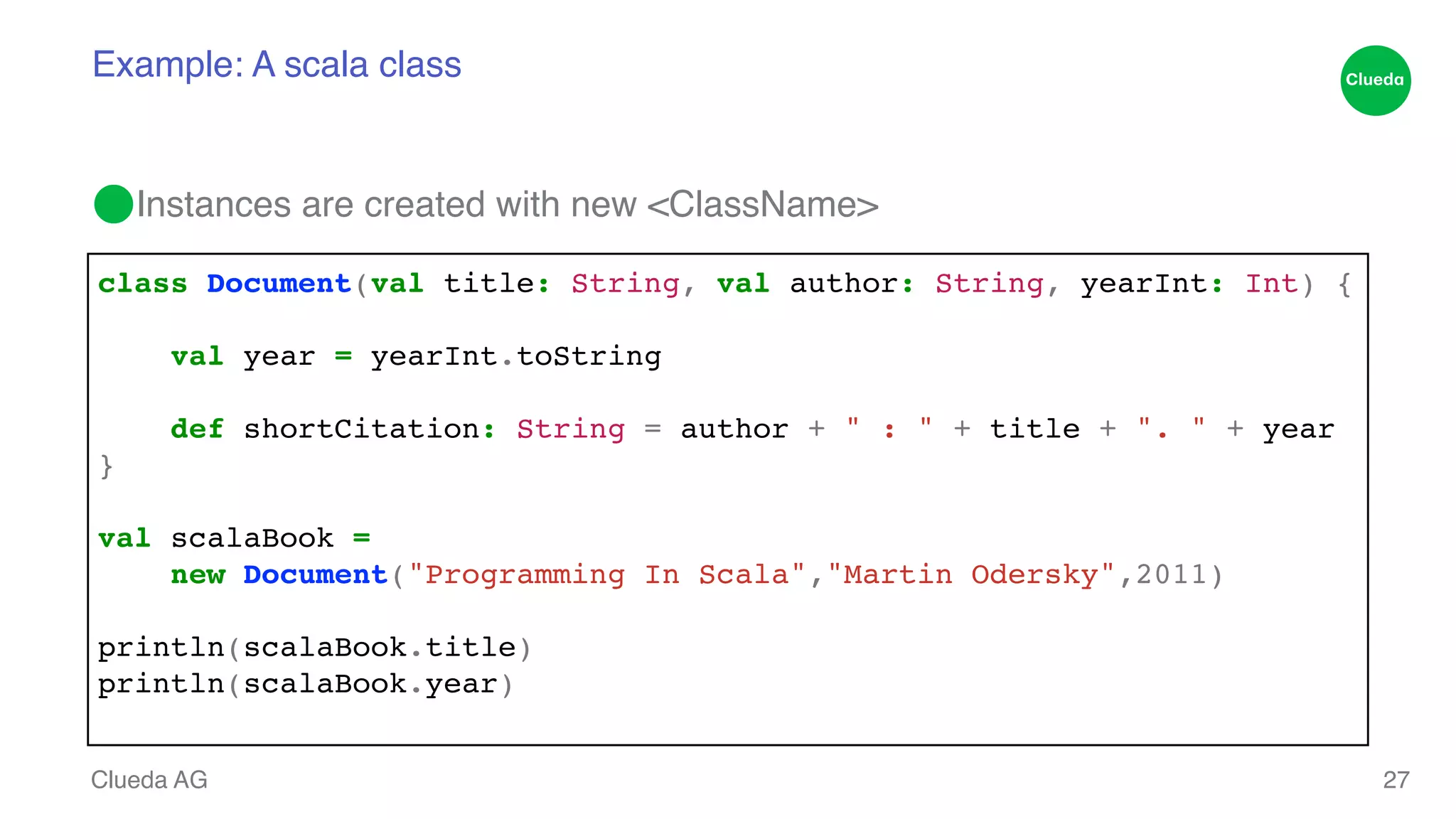
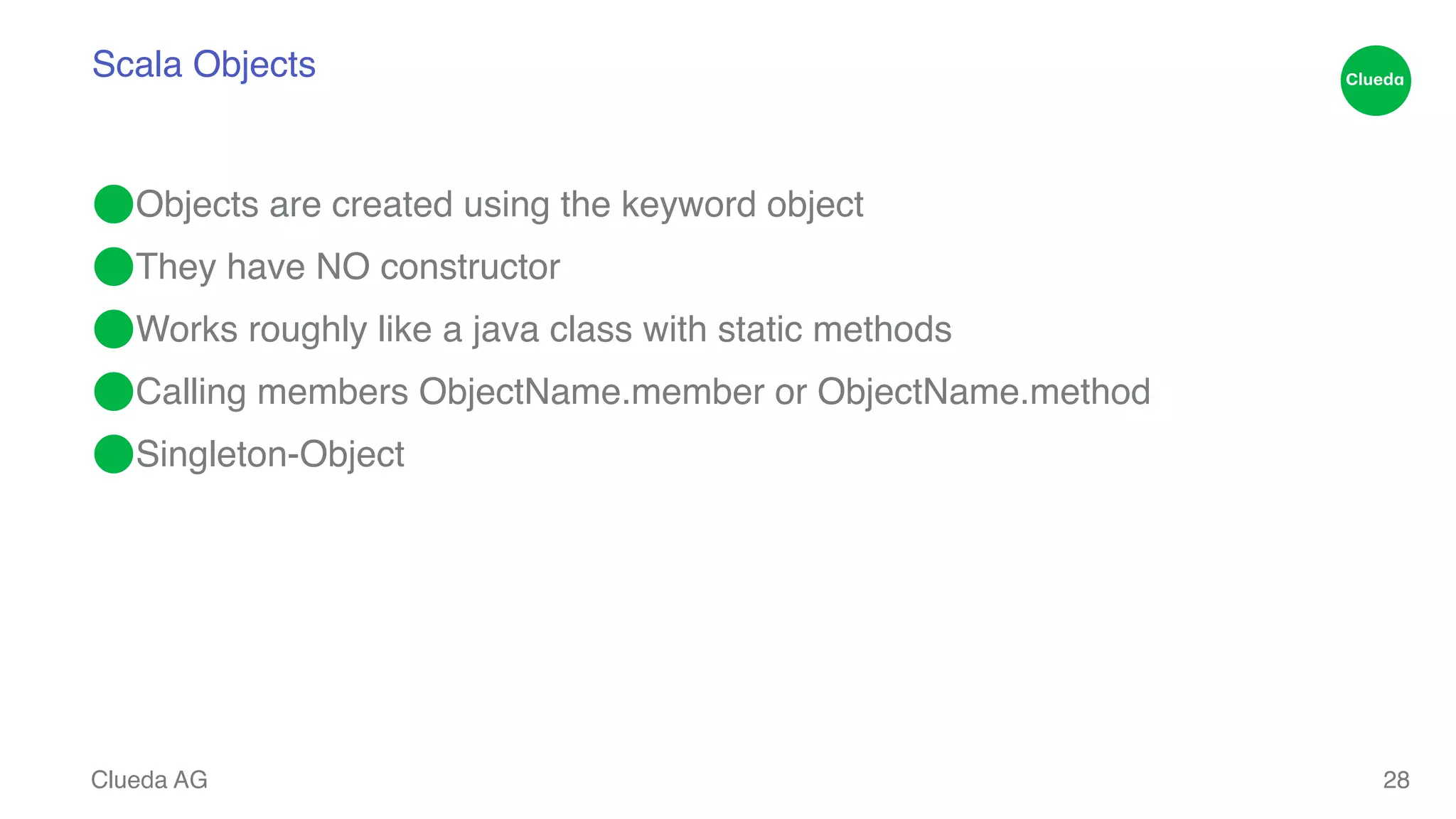
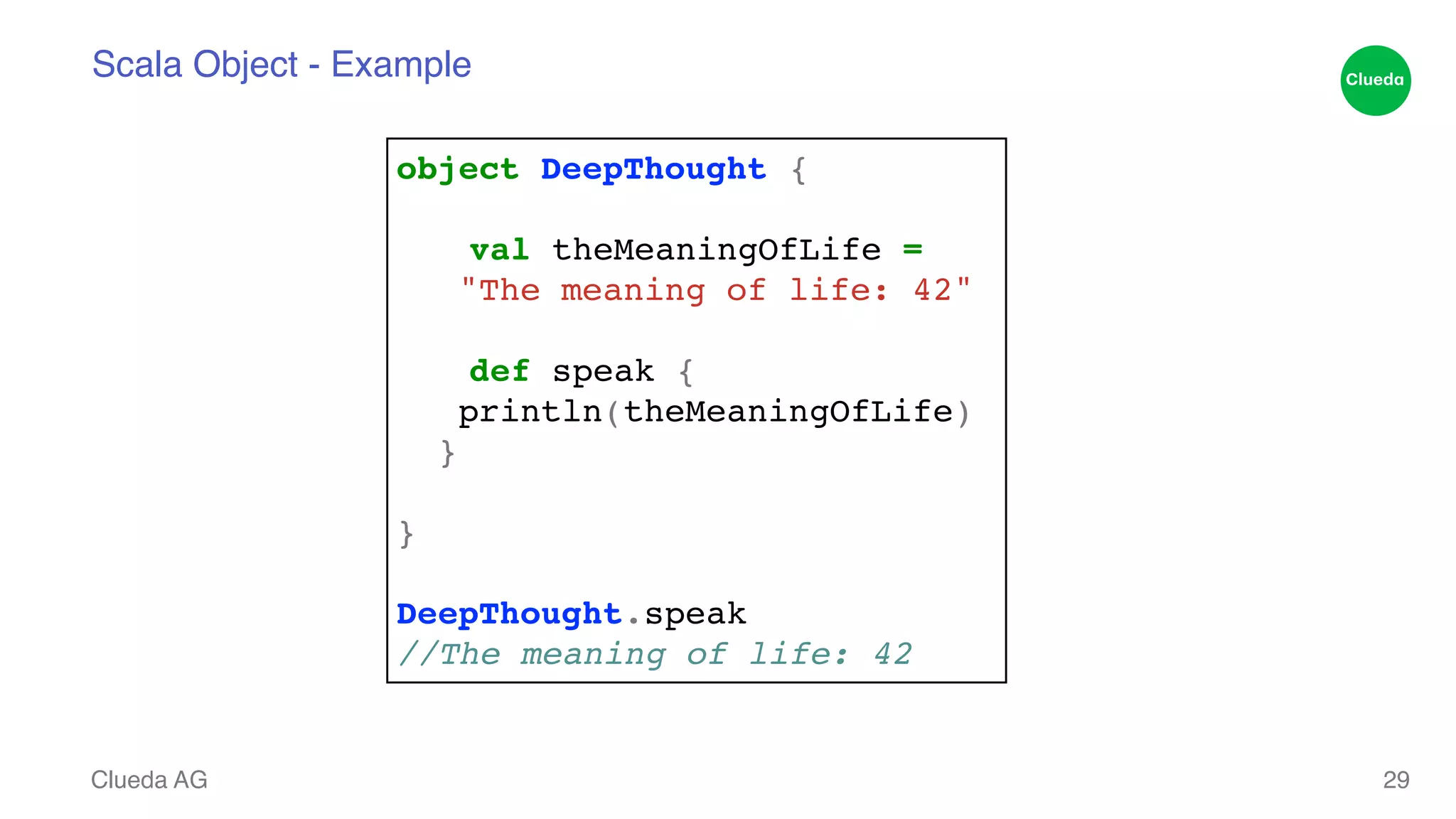
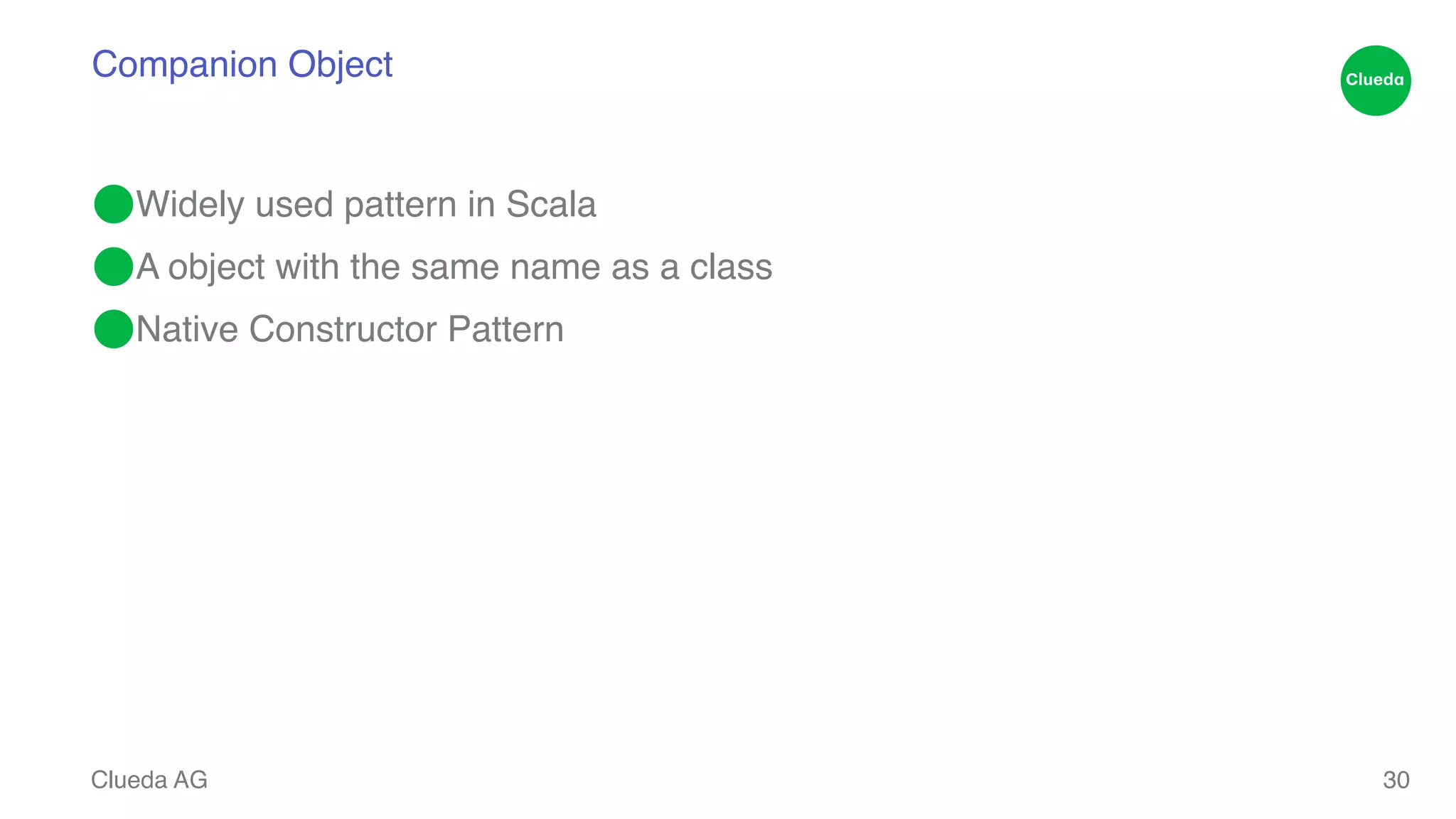
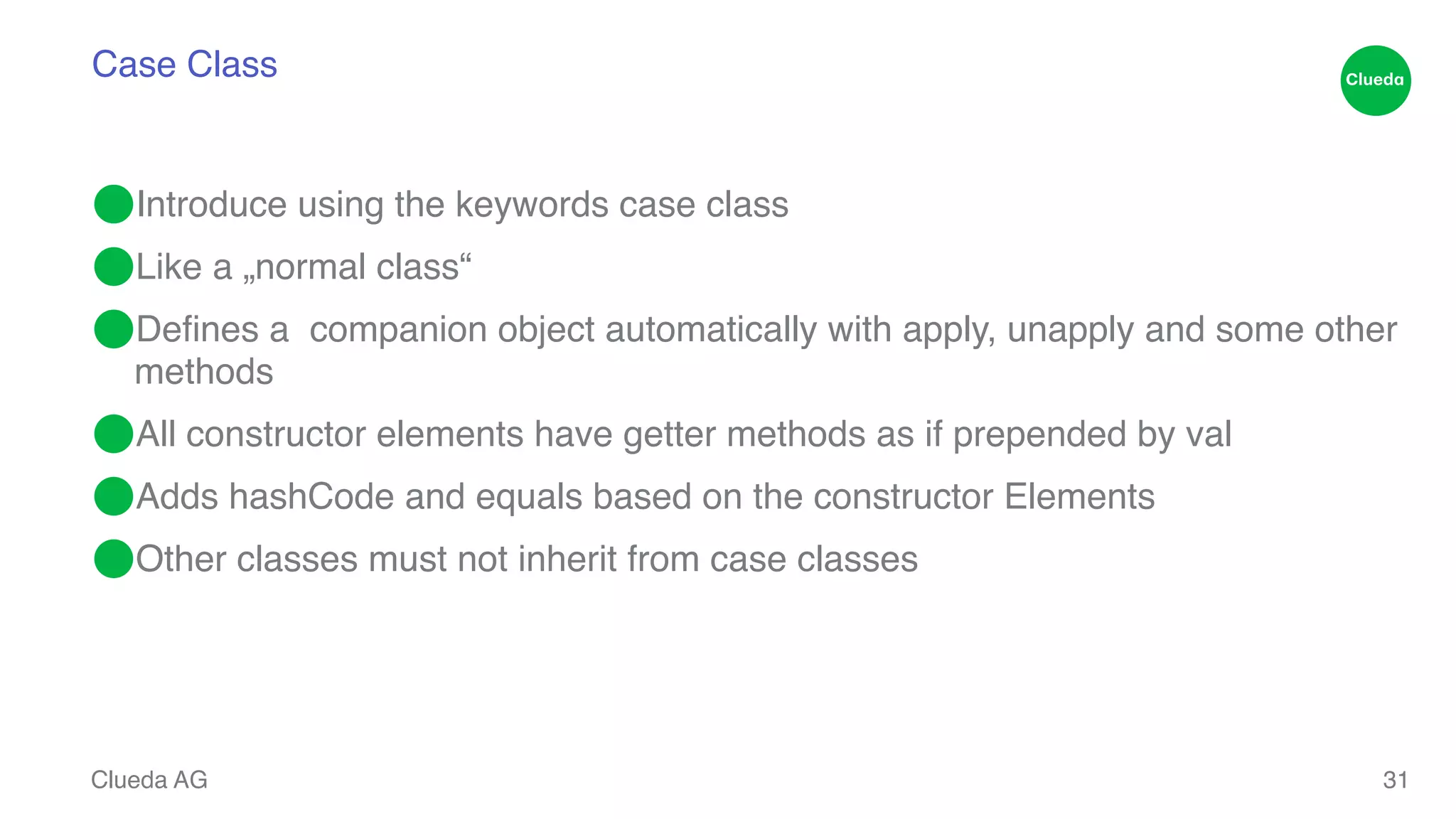
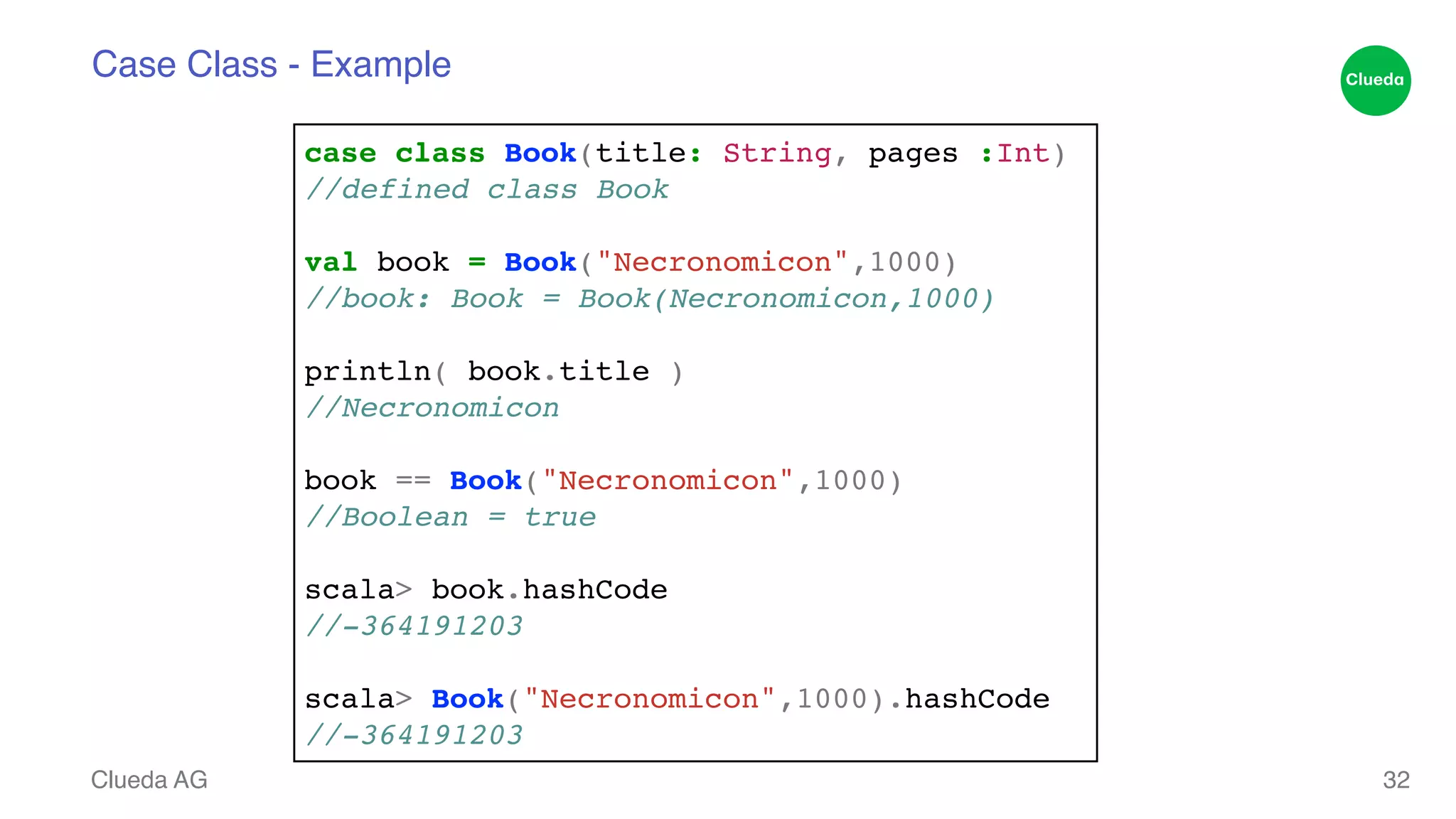
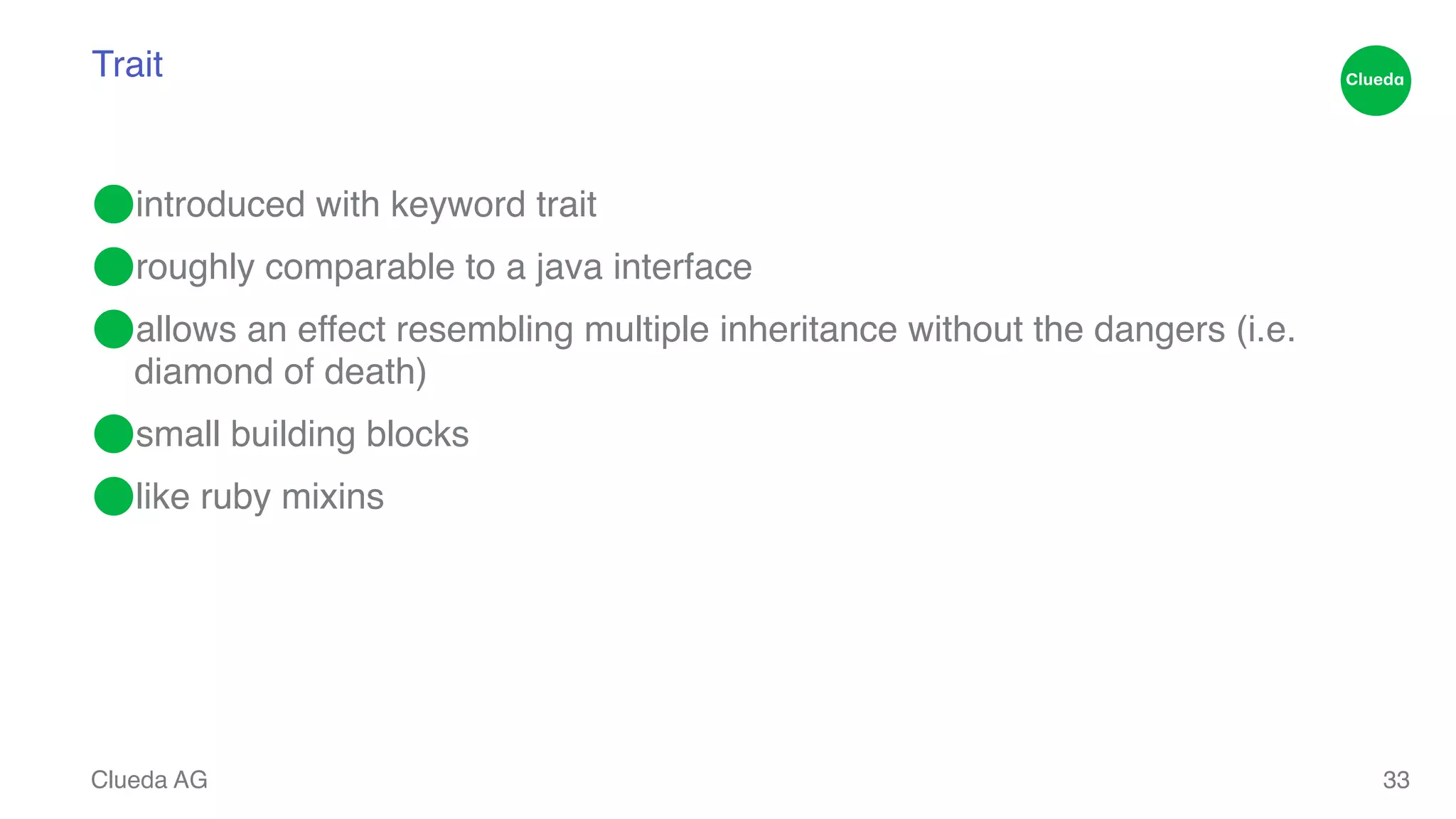
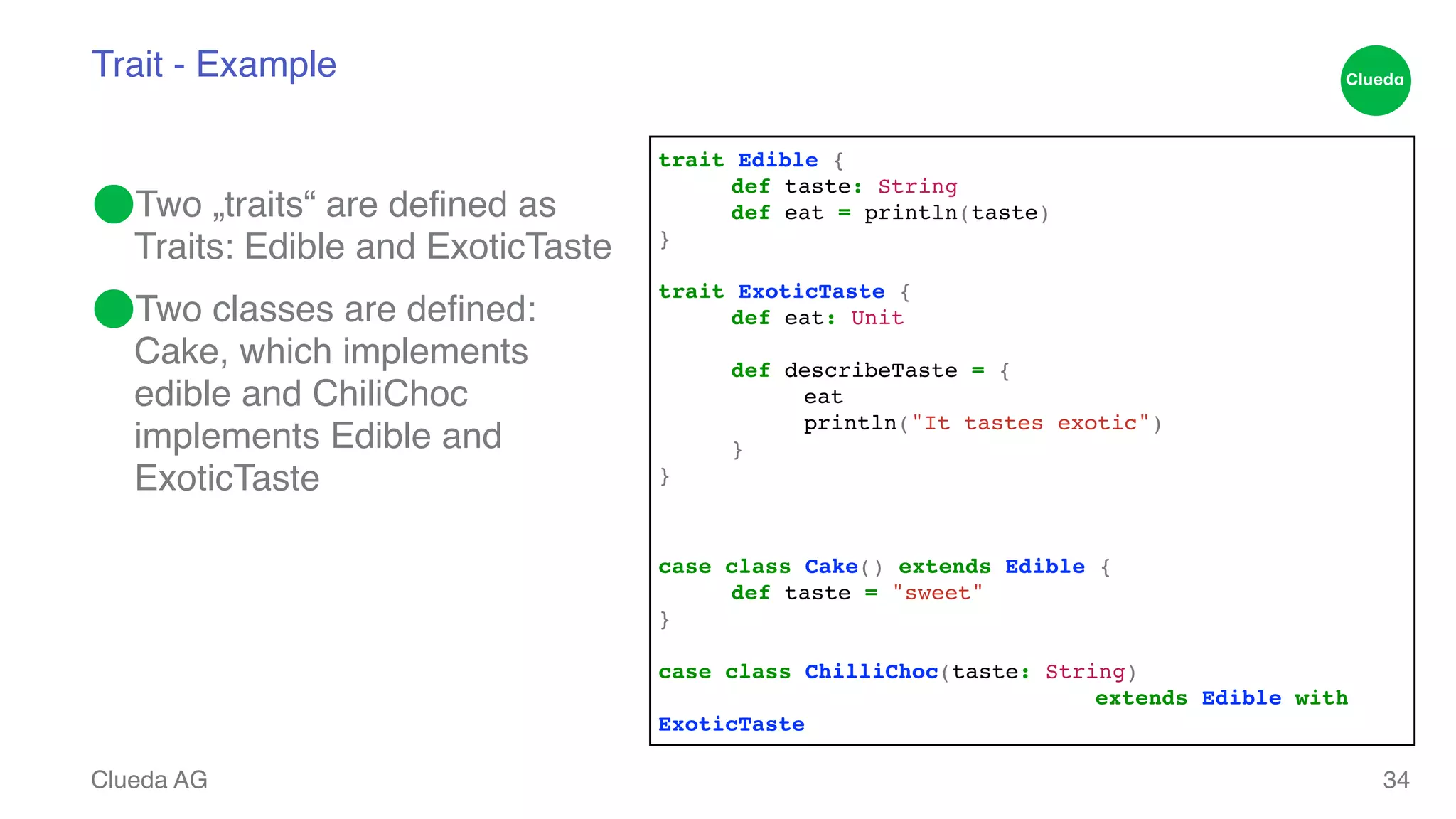
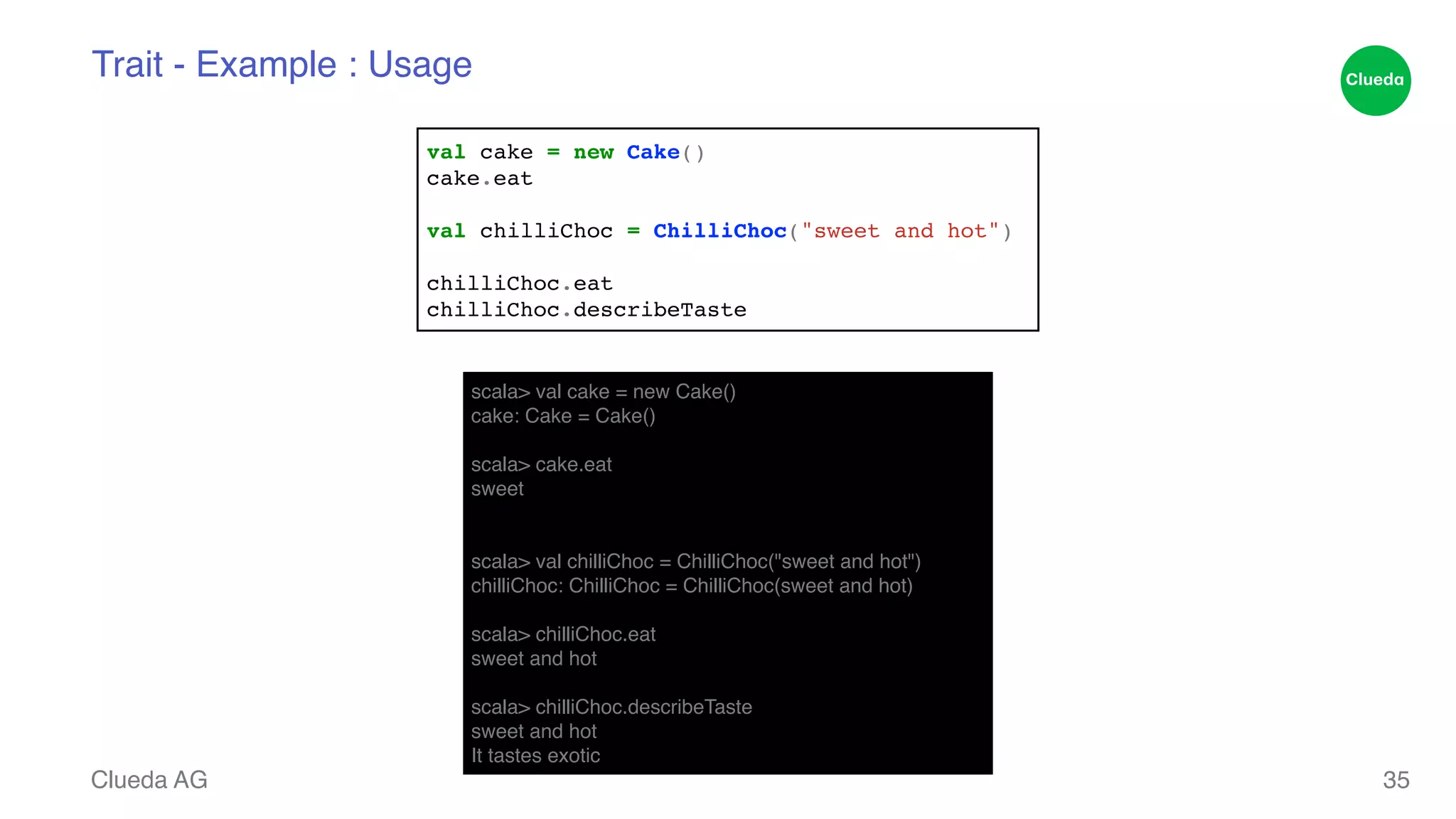
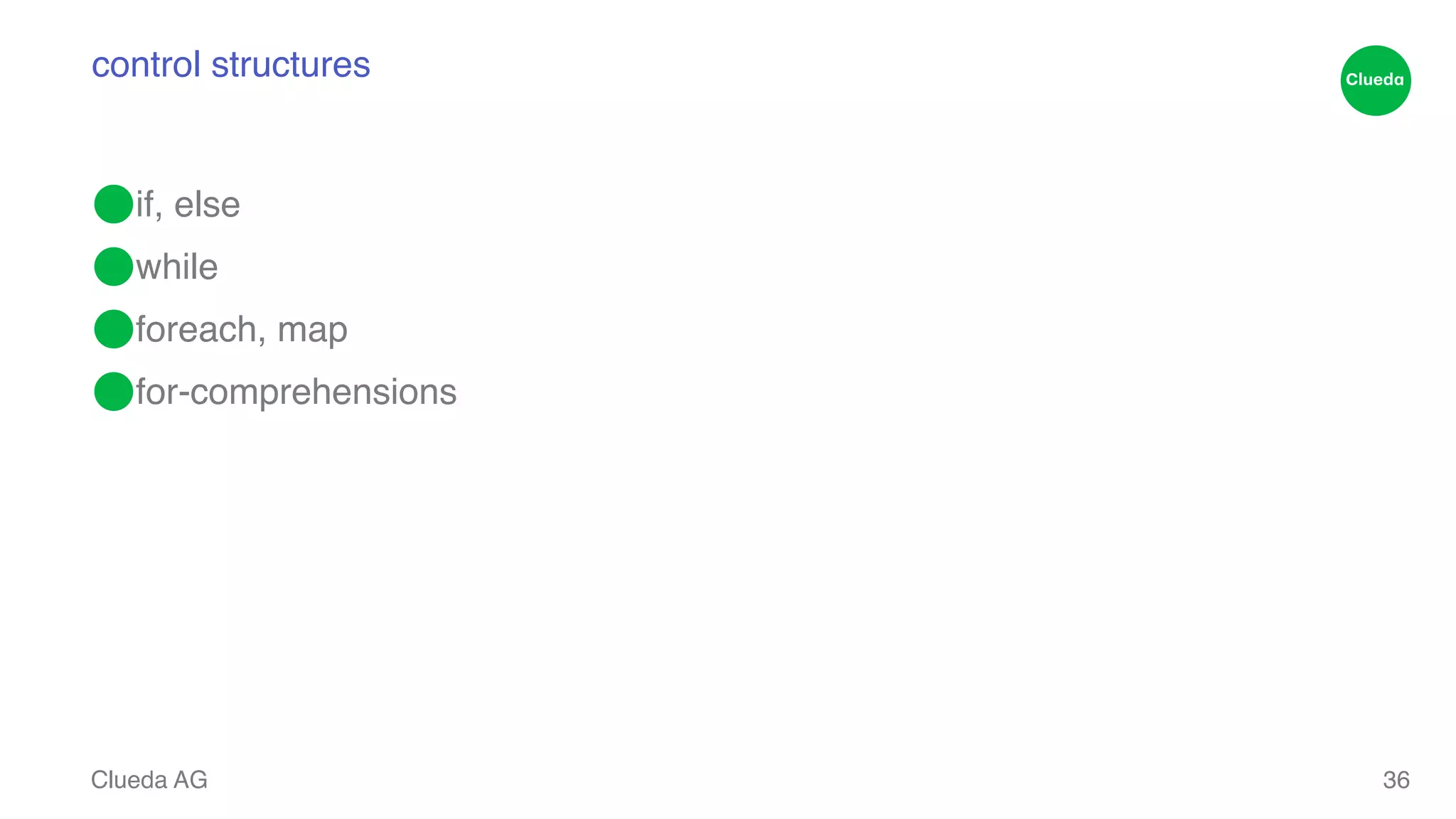
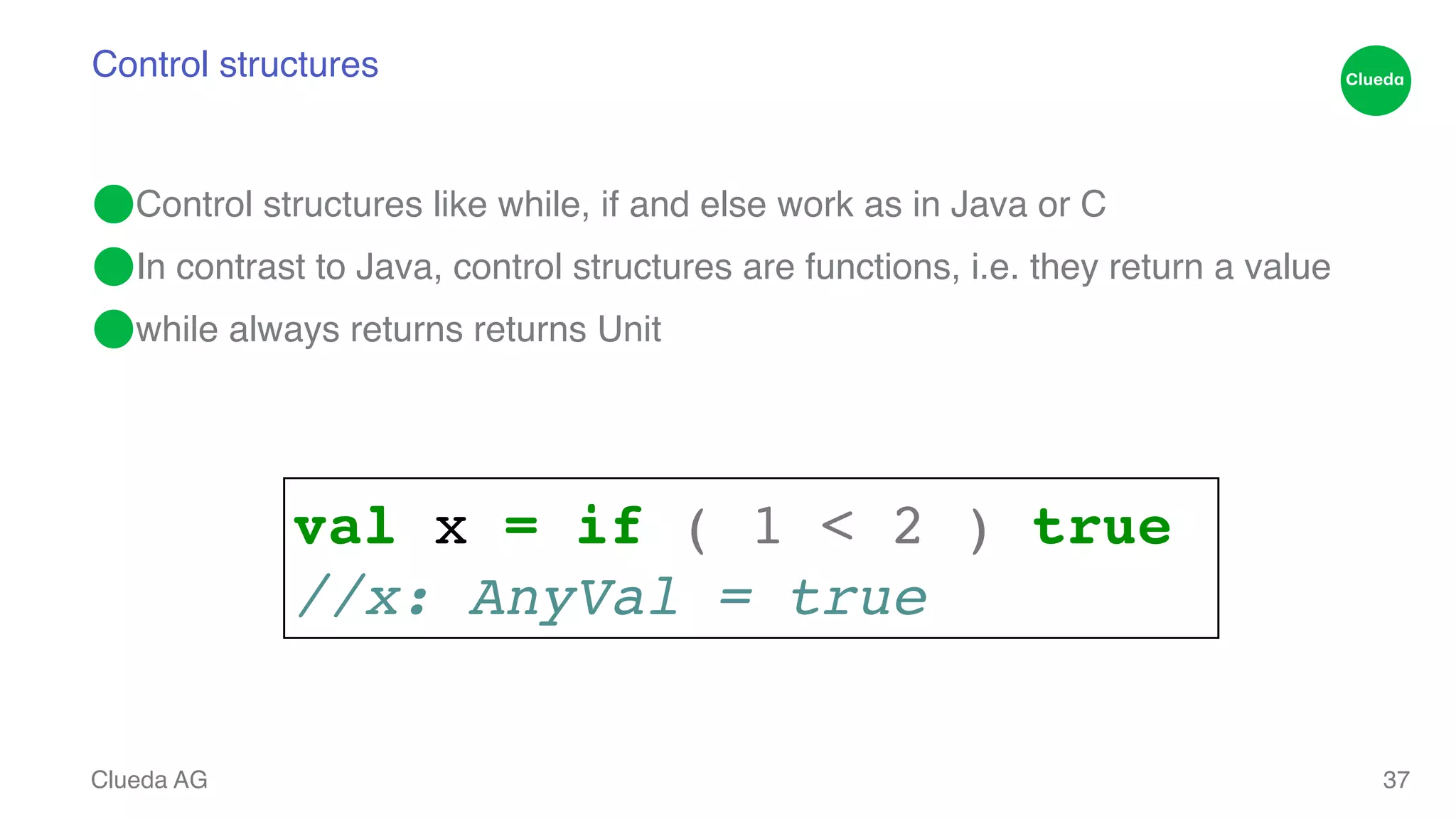
![functional control structures ⬤some Examples! ⬤map : Apply function to each given element , keep result (like looping and collecting the results)! ! ! ⬤foreach: Apply function to each given element , drop result Clueda AG 38 List(1,2,3,4) map (x => x + 1)! //res1: List[Int] = List(2, 3, 4, 5) List(1,2,3) foreach ( x => println(s"And a $x") )! ! //And a 1! //And a 2! //And a 3](https://image.slidesharecdn.com/clueda-scala-workshop-ci-141022021937-conversion-gate02/75/Scala-Workshop-38-2048.jpg)
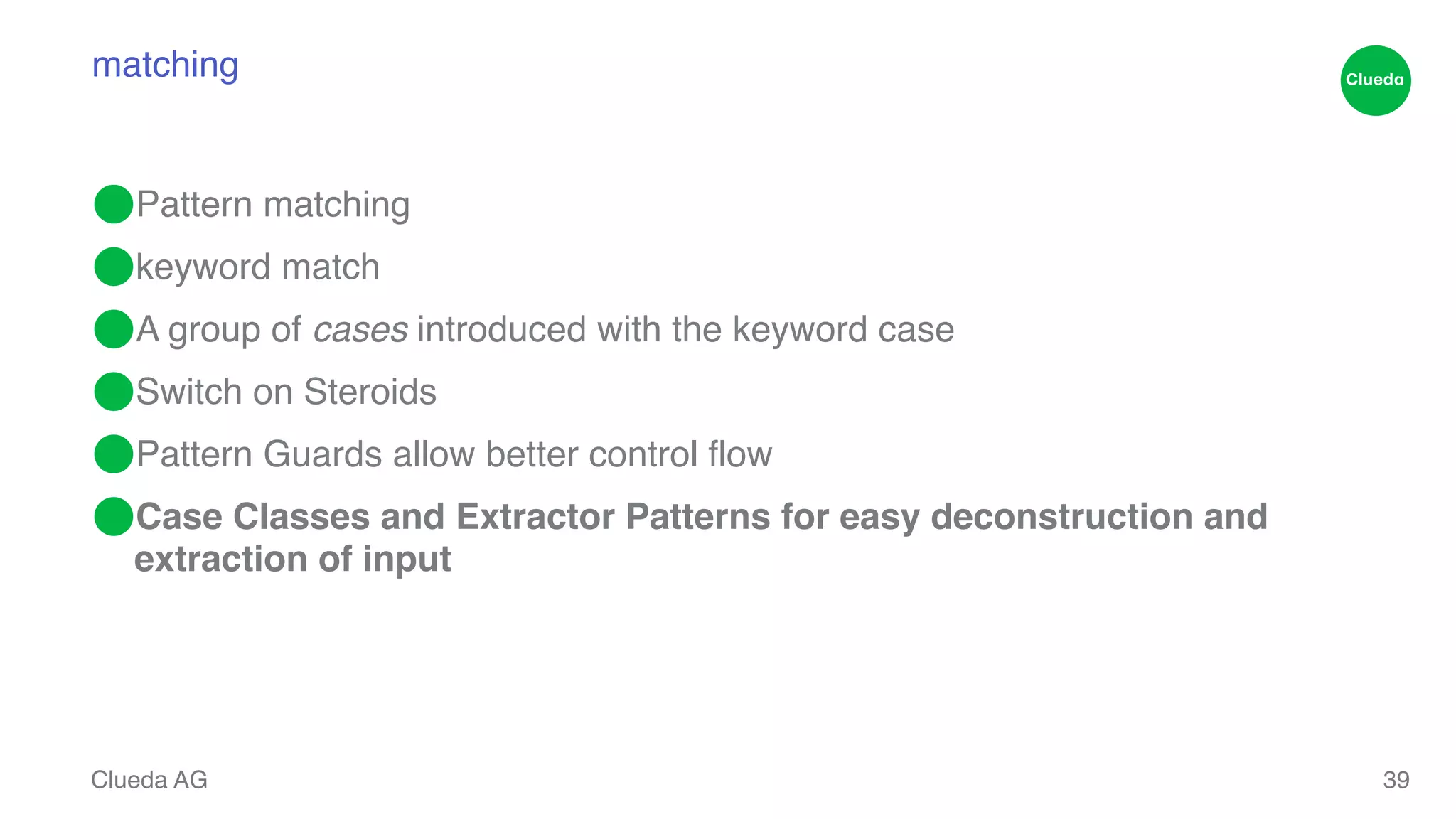
![Matching Example Clueda AG 40 books: List[Any] = ! List(Book(Programming Scala,883,2012), Book(Programming Pearl,1104,2000), Book(Necronomicon, 666,666), Ein String, 5, 42)! !b ookComments: List[String] = ! List(New Scala Book by Martin Odersky from 2012, Programming Pearl 1104 2000, Necronomicon 666 666, Something else, Something else, an integer bigger than 10)! case class Book( title: String, pages: Int, year: Int)! ! val books = List( ! ! Book("Programming Scala", 883, 2012),! ! Book("Programming Pearl", 1104, 2000),! ! Book("Necronomicon",666,666),! ! "Ein String“, 5, 42! )! ! val bookComments = books map {! ! case Book("Programming Scala", pages, year) => ! ! ! s"New Scala Book by Martin Odersky from $year"! ! case Book(title, pages,year) => ! ! ! s"$title $pages $year"! ! case x: Int if x > 10 => ! ! ! "an integer bigger than 10"! ! case _ => ! ! ! "Something else"! }](https://image.slidesharecdn.com/clueda-scala-workshop-ci-141022021937-conversion-gate02/75/Scala-Workshop-40-2048.jpg)
![For-Comprehensions ⬤program with a DSL that looks a lot like pseudocode! ⬤will be translated to map, filter, flatMap and reduce operations by the compiler Clueda AG 41 def isEven(x: Int) = x % 2 == 0! val integers = for {! x <- 1 to 99! if isEven(x)! if x % 5 == 0! } yield x! //integers: scala.collection.immutable.IndexedSeq[Int] = ! Vector(10, 20, 30, 40, 50, 60, 70, 80, 90) ~ Translated ~! (1 to 99) filter isEven filter ( _ % 5 == 0)](https://image.slidesharecdn.com/clueda-scala-workshop-ci-141022021937-conversion-gate02/75/Scala-Workshop-41-2048.jpg)
![Some language features ⬤Strings: Interpolation and MultilineStrings! ⬤Option[Type]! ⬤Future[X]! ⬤XML erzeugen und bearbeiten! ⬤Reguläre Ausdrücke! ⬤Parallele Collections! ⬤Implicits Clueda AG 42](https://image.slidesharecdn.com/clueda-scala-workshop-ci-141022021937-conversion-gate02/75/Scala-Workshop-42-2048.jpg)
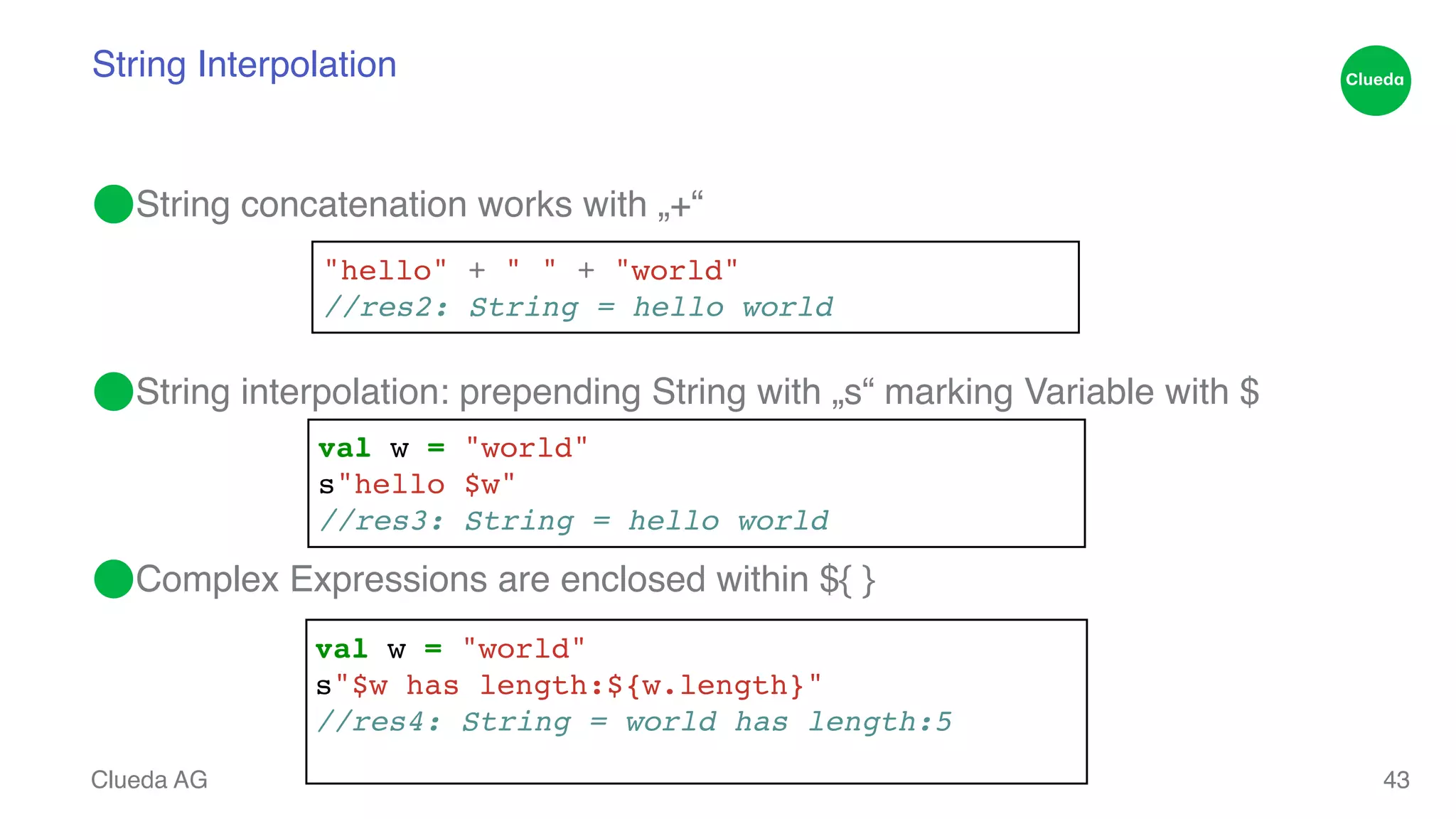
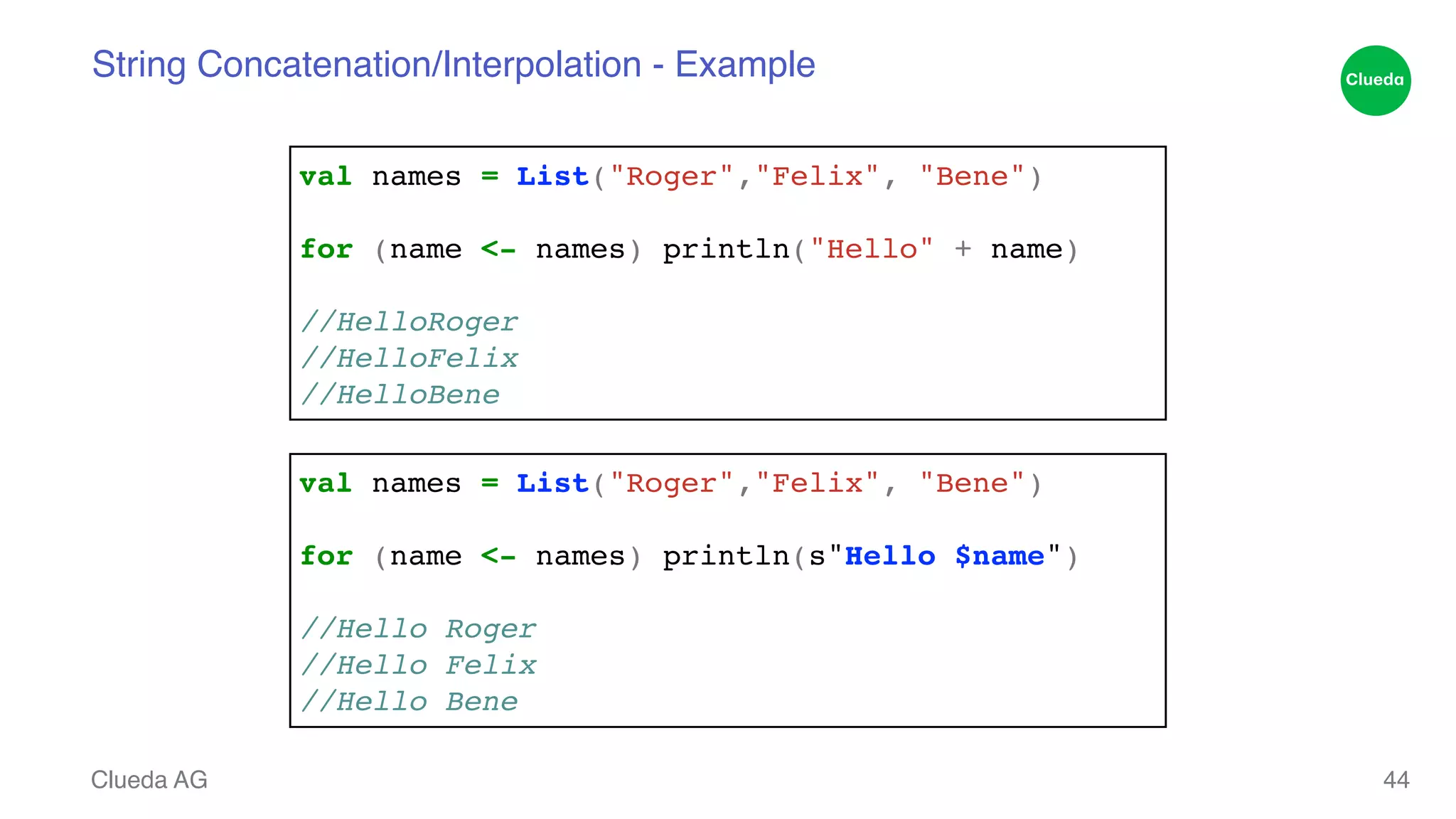
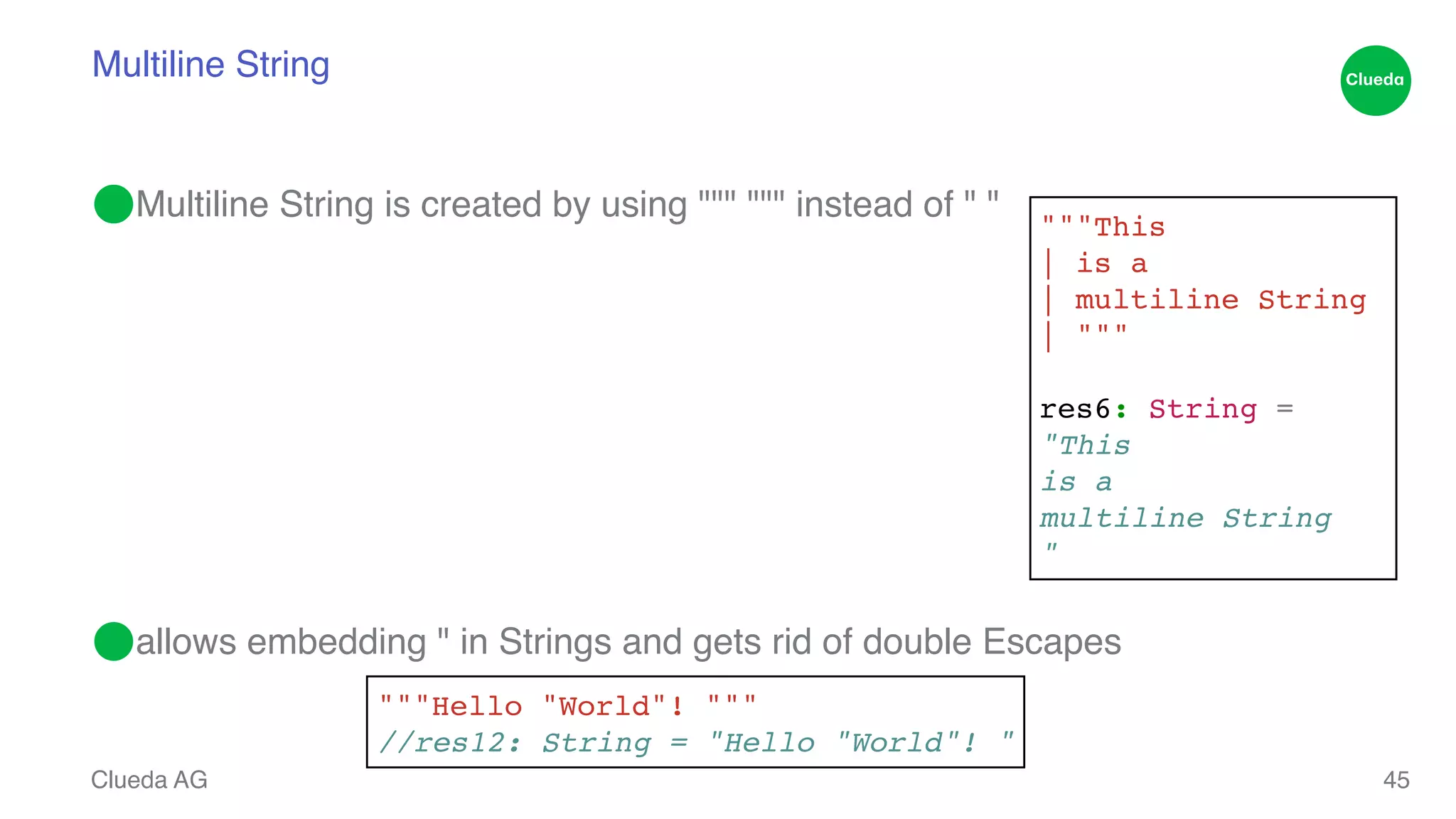
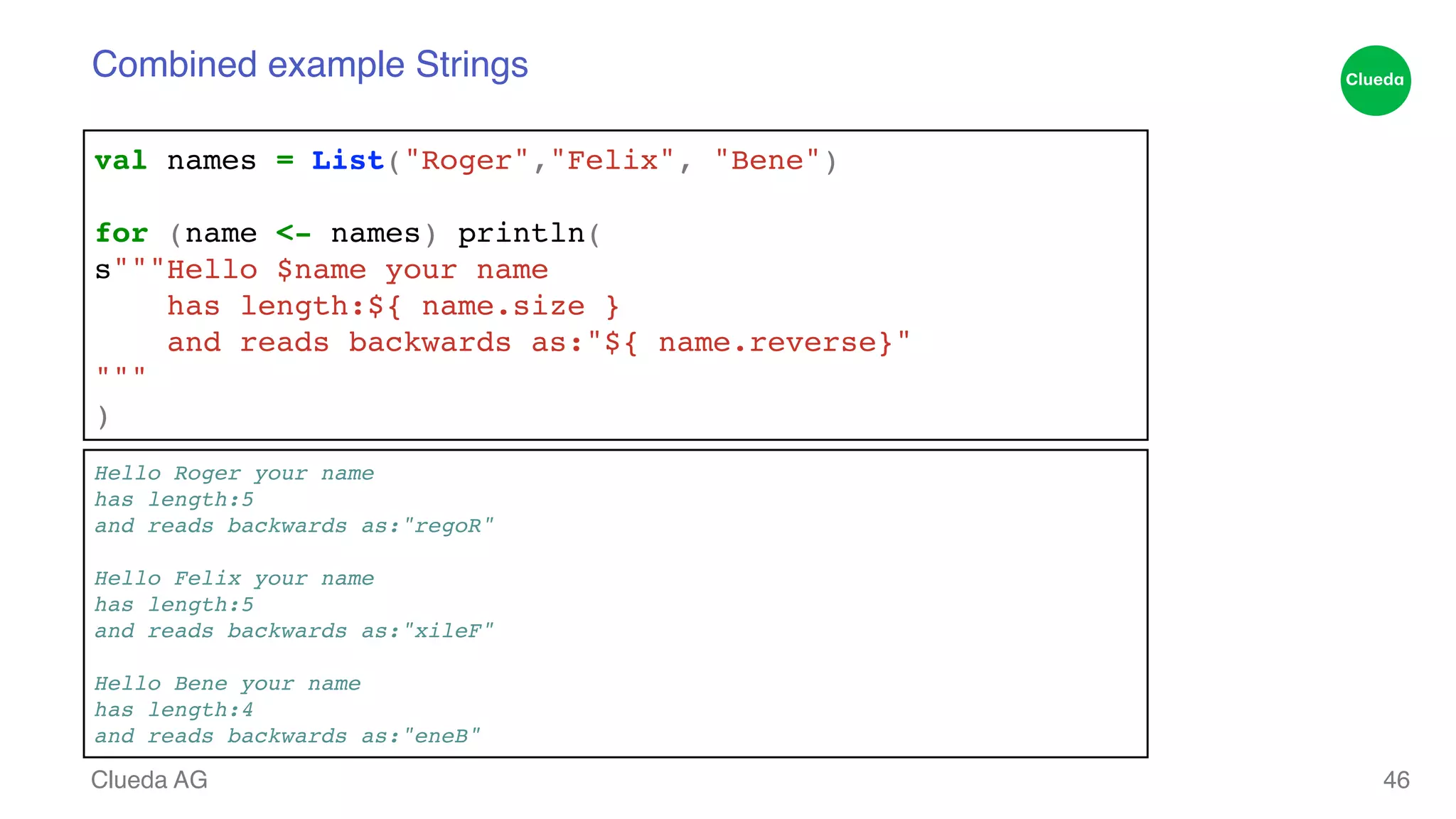
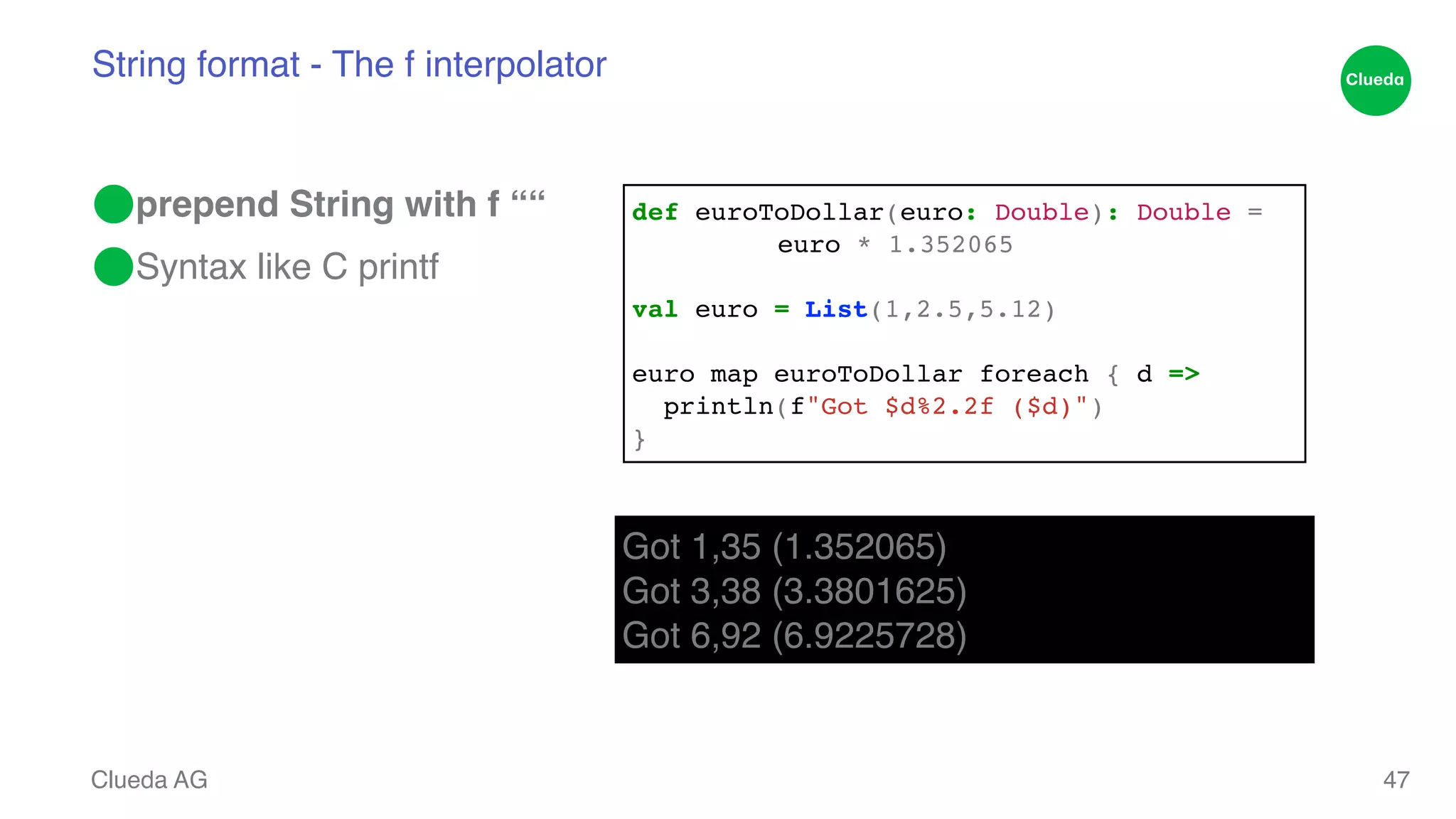
![The Option-Type ⬤Marks functions that may return a result but also may not return a result! ⬤Comes in two flavors: Some and None! ! ! ! ! ⬤like maybe in Haskell! ⬤A way to get around checking for null all the time Clueda AG 48 val x : Option[_] = None! //x: Option[_] = None! ! val x : Option[_] = Some("Hello World!")! //x: Option[_] = Some(Hello World!)](https://image.slidesharecdn.com/clueda-scala-workshop-ci-141022021937-conversion-gate02/75/Scala-Workshop-48-2048.jpg)
![Option / List Comparison ⬤Option behaves like a list with one element! ! ! ⬤An empty Option is called None. None behaves like an empty list. Clueda AG 49 List( 1 ) map (i => i + 0.5 ) ! //List[Double] = List(1.5) Some( 1 ) map (i => i + 0.5 )! //Option[Double] = Some(1.5) val y : List[Int] = List()! //y: List[Int] = List()! ! y map (i => i+ 0.5)! //List[Double] = List() // Like an empty List! val x : Option[Int] = None ! //x: Option[Int] = None! x map (i => i+ 0.5)! // Option[Double] = None](https://image.slidesharecdn.com/clueda-scala-workshop-ci-141022021937-conversion-gate02/75/Scala-Workshop-49-2048.jpg)
![Option-Type Beispiel: Option vs. null Clueda AG 50 val bigBangPHD = Map(! "Leonard" -> "Ph.D.",! "Sheldon" -> "Ph.D.,Sc.D",! "Rajesh" -> "Ph.D"! )! ! val friends = List("Leonard","Sheldon","Rajesh","Howard") bigBangPHD("Leonard")! //res0: java.lang.String = Ph.D.! ! bigBangPHD("Howard")! java.util.NoSuchElementException: key not found: Howard! ! at scala.collection.MapLike $class.default(MapLike.scala:223)! ! at scala.collection.immutable.Map $Map3.default(Map.scala:132) bigBangPHD get "Leonard"! //res1: Option[java.lang.String] ! = Some(Ph.D.)! ! bigBangPHD.get("Sheldon")! //res2: Option[java.lang.String] ! = Some(Ph.D., Sc.D)! ! bigBangPHD.get("Howard")! //res3: Option[java.lang.String] ! = None](https://image.slidesharecdn.com/clueda-scala-workshop-ci-141022021937-conversion-gate02/75/Scala-Workshop-50-2048.jpg)
![Option -Type :Examples 1 ⬤Used widely throughout Scala! ⬤many builtin methods to handle Option Clueda AG 51 // Liste mit Options erzeugen ! friends map (bigBangPHD.get(_))! friends map bigBangPHD.get! //List[Option[java.lang.String]] = ! //List(Some(Ph.D.), Some(Ph.D.,Sc.D), Some(Ph.D), None)! !! // flatten entfernt None und „entpackt“ Some(thing)! friends map bigBangPHD.get flatten! friends flatMap (f => bigBangPHD.get(f))! /!/res5: List[java.lang.String] = List(Ph.D., Ph.D.,Sc.D, Ph.D)! // for comprehensions wenden Operationen nur auf Some() an und verwerfen None! for {! ! person <- friends! ! phd <- bigBangPHD get person! } yield s"$person has a $phd"! //List[java.lang.String] = ! //List(Leonard has a Ph.D., Sheldon has a Ph.D.,Sc.D, Rajesh has a Ph.D)](https://image.slidesharecdn.com/clueda-scala-workshop-ci-141022021937-conversion-gate02/75/Scala-Workshop-51-2048.jpg)
![Option -Type : Examples 2‚ ⬤Option ist tief in Scala integriert! ⬤Es existieren viele Methoden die mit Option umgehen können // getOrElse erlaubt es einen Standardrückgabewert für None anzugeben, ansonsten wird Some(thing) „ausgepackt“! friends! ! .map( n =>(n,bigBangPHD.get(n)) ) // creates Tuple! ! .map{ case (n,d) => ! ! ! ! ! n + " " + d.getOrElse("Sheldon tells me you only have a master's degree.") ! ! }! //res7: List[java.lang.String] = ! //List(Leonard Ph.D.,! //Sheldon Ph.D.,Sc.D,! //Rajesh Ph.D,! //Howard Sheldon tells me you only have a master's degree.)! ! // Option Types besitzen Extraktoren für Pattern Matching! friends map bigBangPHD.get zip friends map {! Clueda AG 52 case (Some(phd), name ) => name + " : " + phd! case (None, name) => name + " is just an engineer"! }! ! //res10: List[java.lang.String] = List(Leonard : Ph.D.,! //Sheldon : Ph.D.,Sc.D,! //Rajesh : Ph.D,! //Howard is just an engineer)](https://image.slidesharecdn.com/clueda-scala-workshop-ci-141022021937-conversion-gate02/75/Scala-Workshop-52-2048.jpg)
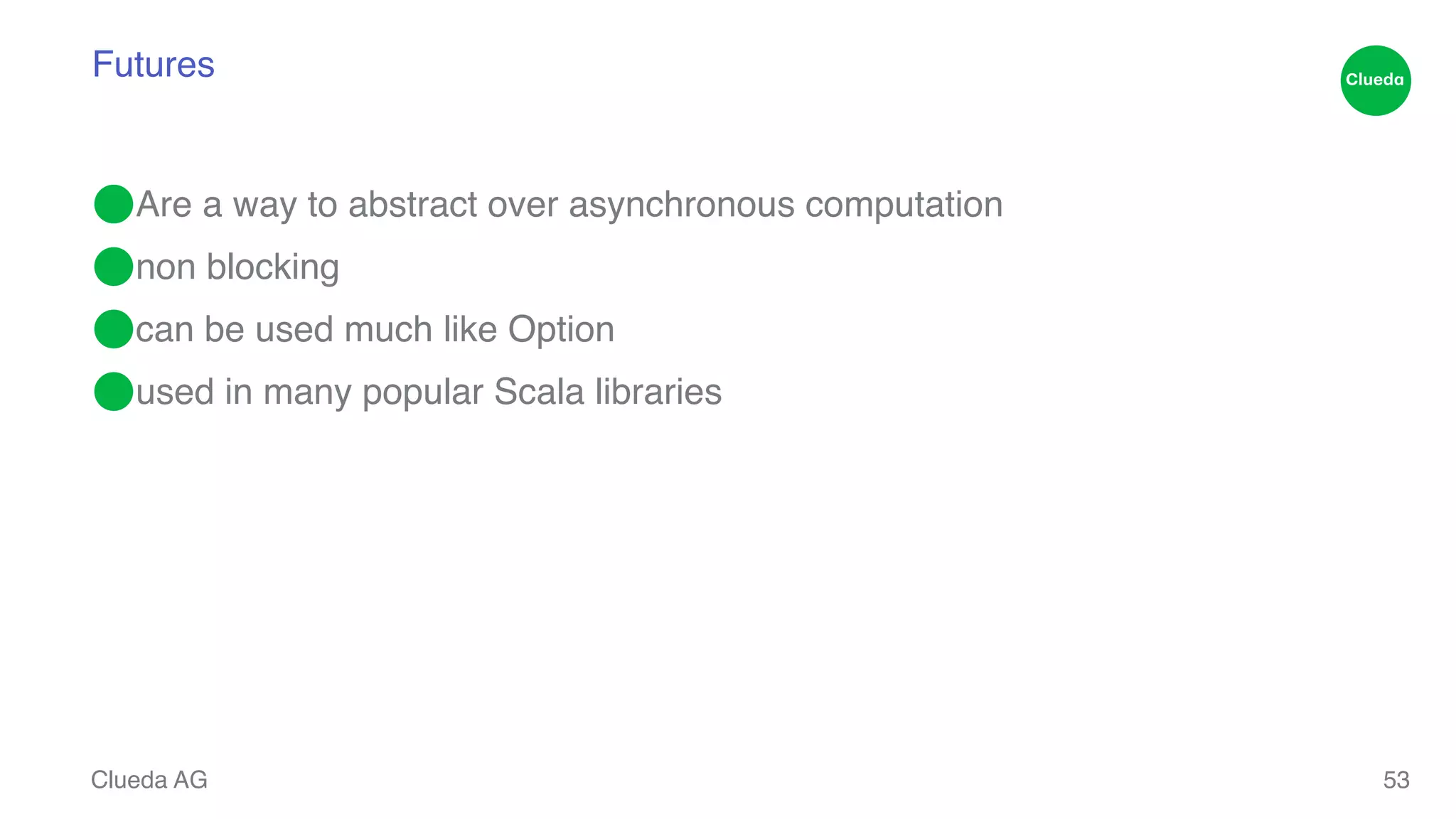
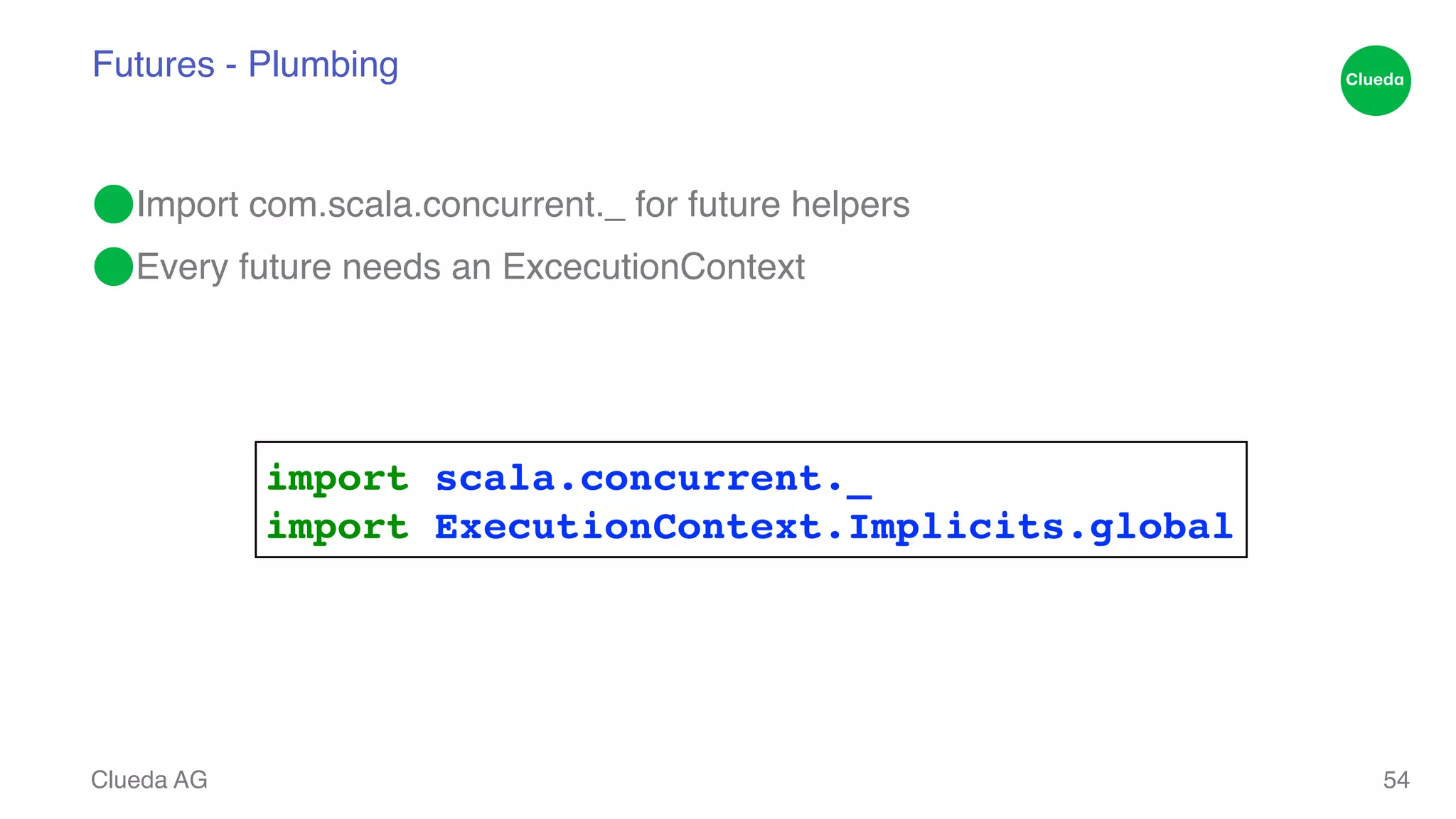
![Using Futures - Example val urls = ! List("http://www.clueda.de","http://www.neumann.biz","http://www.an-it.com")! ! def takeTime = { code to measure time }! def extractURLs(data: String) : Iterator[String] = …! def printURLs(data: String) : Unit = extractURLs(data) foreach println! def printLinks = urls map ( url => printURLs( getData(url) ) )! ! takeTime( printLinks )! takeTime( future { printLinks } )! Clueda AG 55 scala> takeTime( printLinks )! Url -> /favicon.gif! Url -> /stylesheets/refinery/style.css! Url -> /stylesheets/style.css?1380179036! …! res9: (String, List[Unit]) = ! ! (! ! ! took 2.109 s,! ! ! List((), (), ())! ! ) takeTime( future { printLinks } )! res10: (String, scala.concurrent.Future[List[Unit]]) = ! ! (! ! ! took 0.0 s,! ! ! scala.concurrent.impl.Promise$DefaultPromise@..! ! )! scala> Url -> /favicon.gif! Url -> /stylesheets/refinery/style.css! Url -> /stylesheets/style.css?1380179036! Url -> /stylesheets/flexslider.css?1349423712! …](https://image.slidesharecdn.com/clueda-scala-workshop-ci-141022021937-conversion-gate02/75/Scala-Workshop-55-2048.jpg)
![Futures - Getting the result ⬤To get the result of a Future you have to block and wait! ! ! ⬤This is usually bad! ⬤Awaiting the result should happen as late as possible as it negates the benefits one gets using futures Clueda AG 56 import scala.concurrent.duration._! ! takeTime( Await.result( Future(printLinks), 10 seconds )) scala> takeTime( Await.result( Future(printLinks), 10 seconds )) warning: there were 1 feature warning(s); re-run with -feature for details Url -> /favicon.gif Url -> /stylesheets/refinery/style.css Url -> /stylesheets/style.css?1380179036 Url -> /stylesheets/flexslider.css?1349423712 … res30: (String, List[Unit]) = (took 1.976 s,List((), (), ()))](https://image.slidesharecdn.com/clueda-scala-workshop-ci-141022021937-conversion-gate02/75/Scala-Workshop-56-2048.jpg)
![Futures - Composing ⬤As futures are Monads ( said it, done! ) they can be composed! ⬤The futures run asynchronously and will not wait for each other but await will wait till the last of the futures has completed or the timeout is reached. Clueda AG 57 def composedFutures: Future[(Unit,Unit,Unit)] = {! ! val f1 = Future( getAndPrintLinks("http://www.an-it.com") )! ! val f2 = Future( getAndPrintLinks("http://www.neumann.biz") )! ! val f3 = Future( getAndPrintLinks("http://www.clueda.com") )! ! ! for ( d1 <- f1 ; d2 <- f2 ; d3 <- f3) yield (d1,d2,d3)! } takeTime { Await.result(composedFutures,10 seconds) } warning: there were 1 feature warning(s); re-run with -feature for details Url -> /stylesheets/an-it.css?1339665275 Url -> mobile_stylesheets/mobile.css Url -> / Url -> ethnologie-studium res21: (String, (Unit, Unit, Unit)) = (took 0.834 s,((),(),()))](https://image.slidesharecdn.com/clueda-scala-workshop-ci-141022021937-conversion-gate02/75/Scala-Workshop-57-2048.jpg)
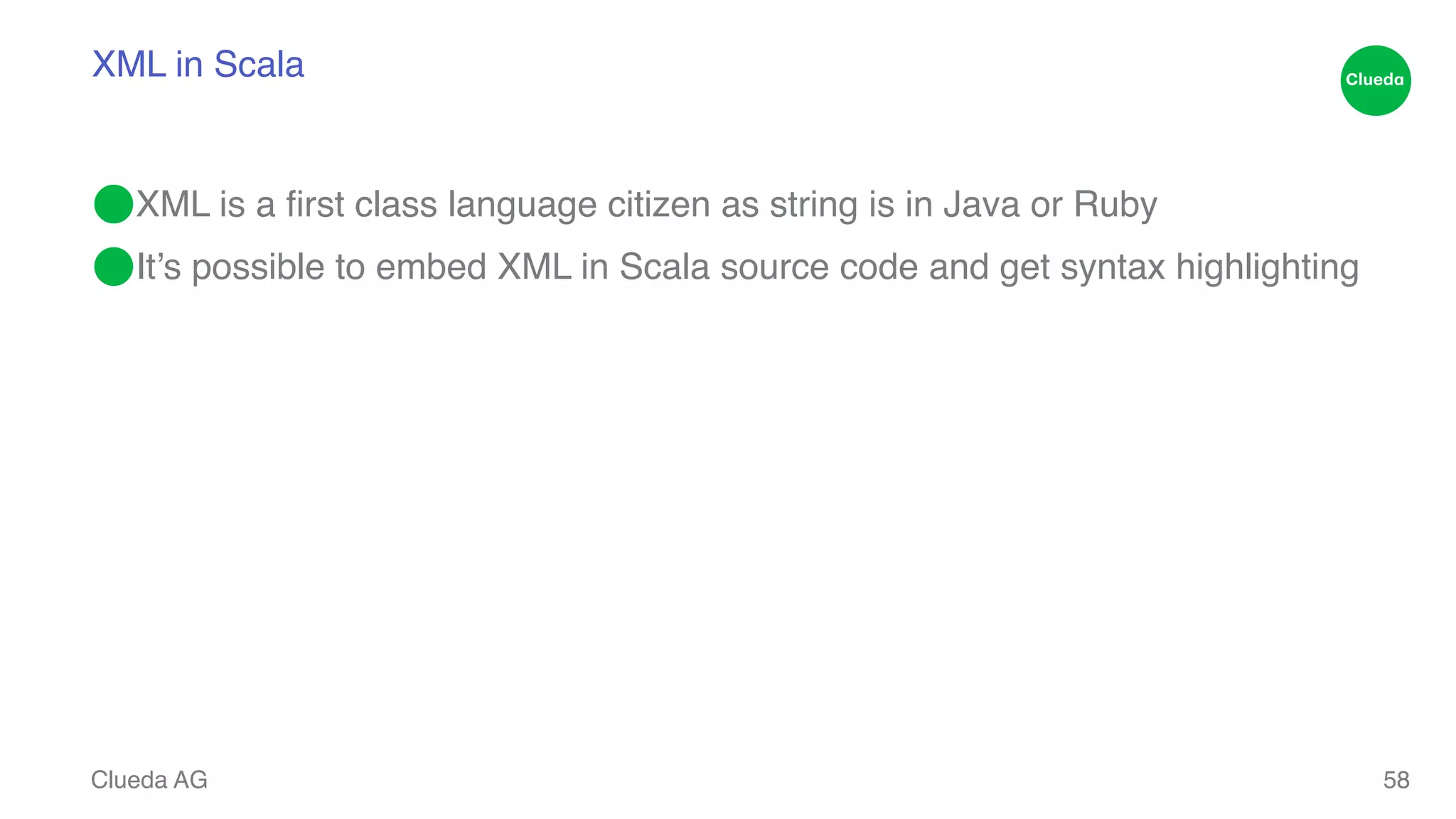
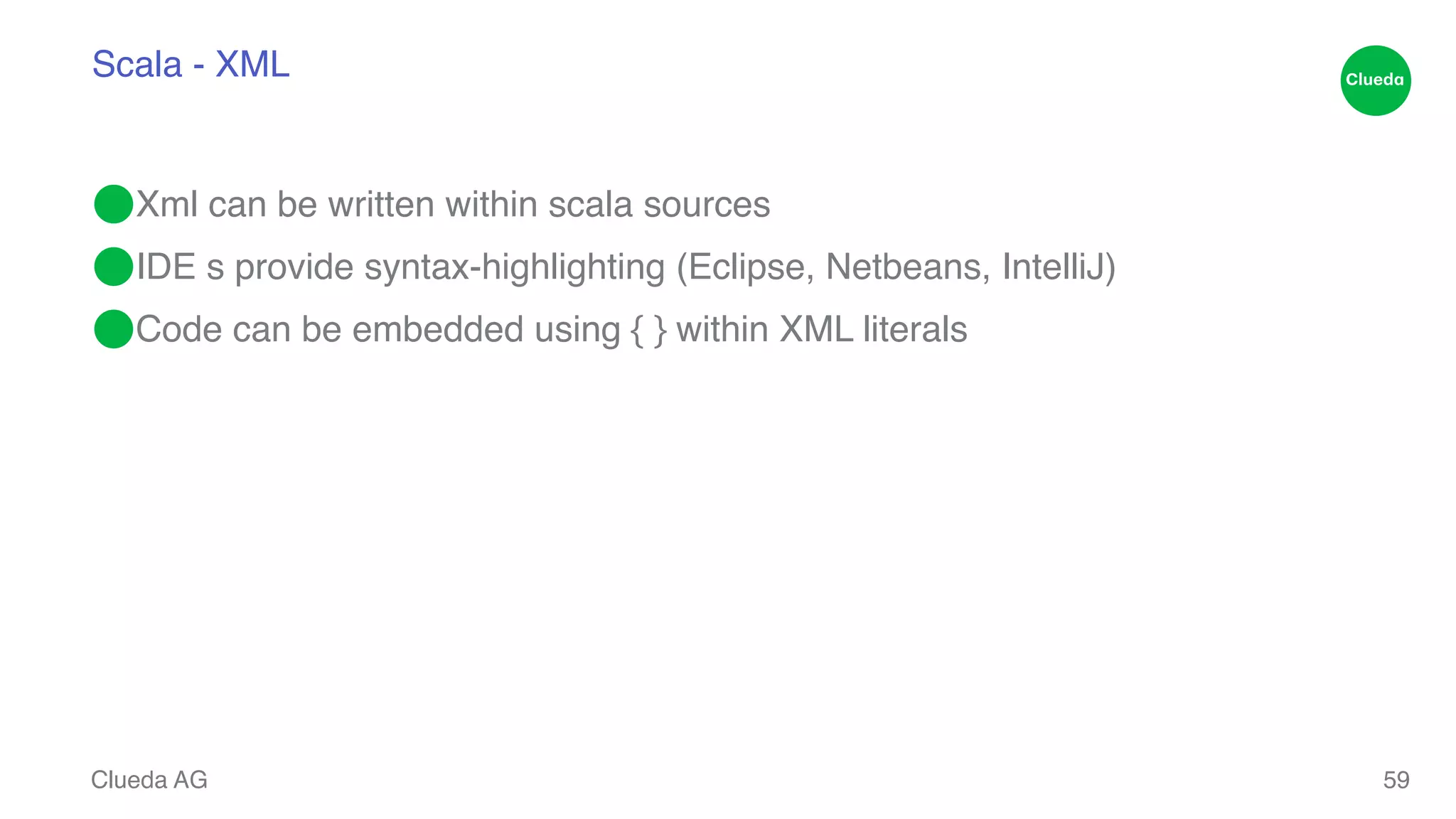
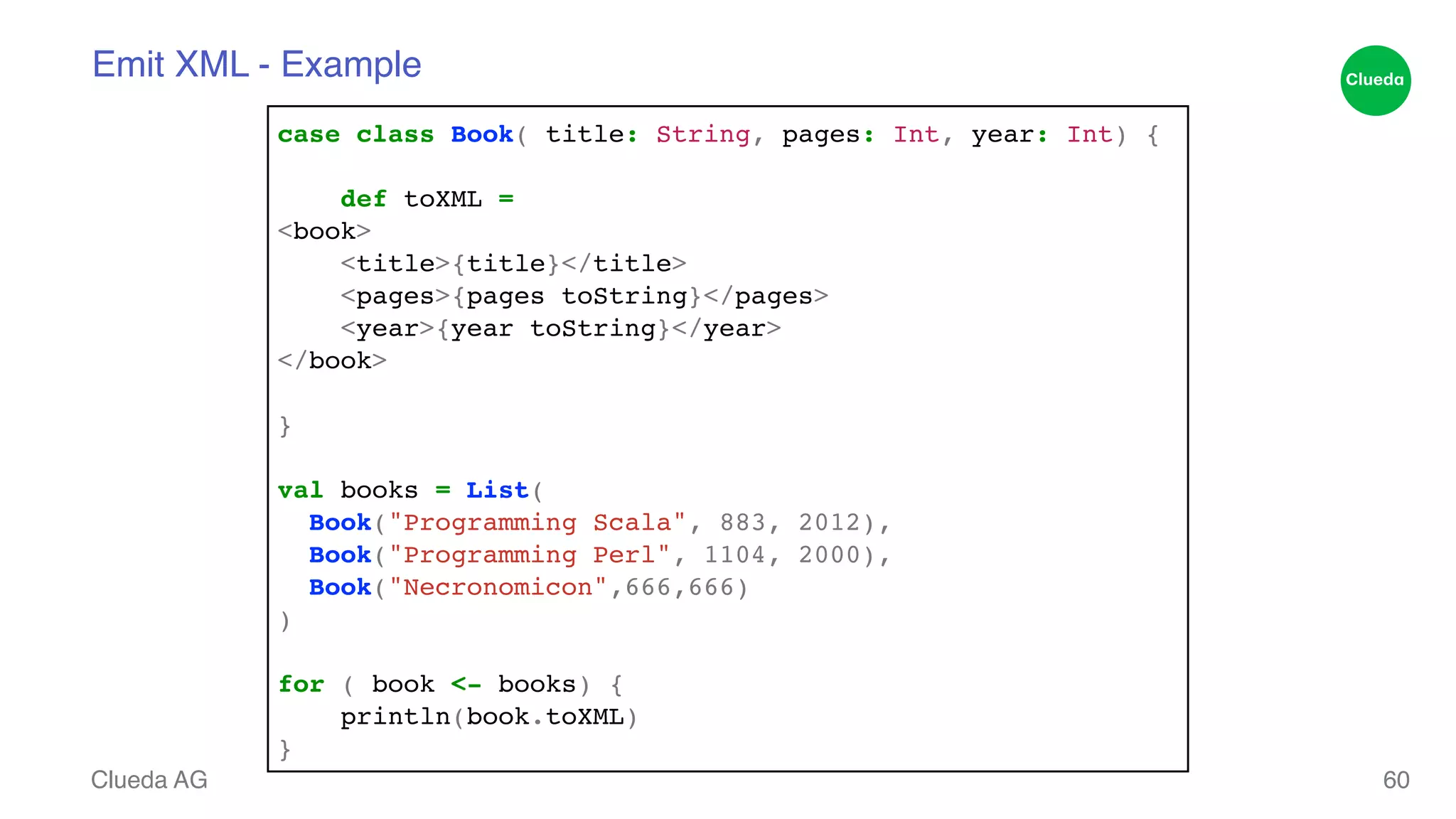
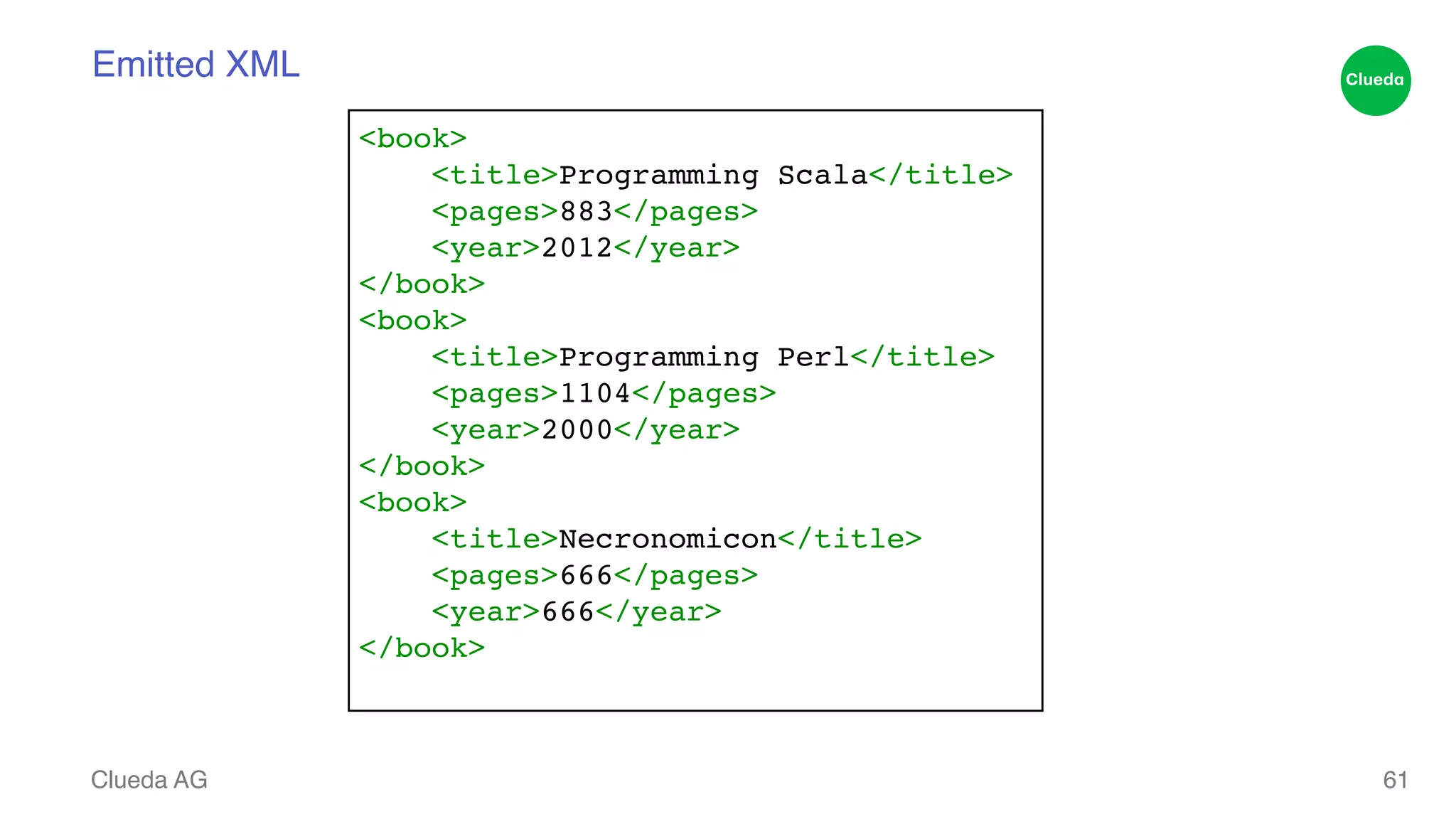
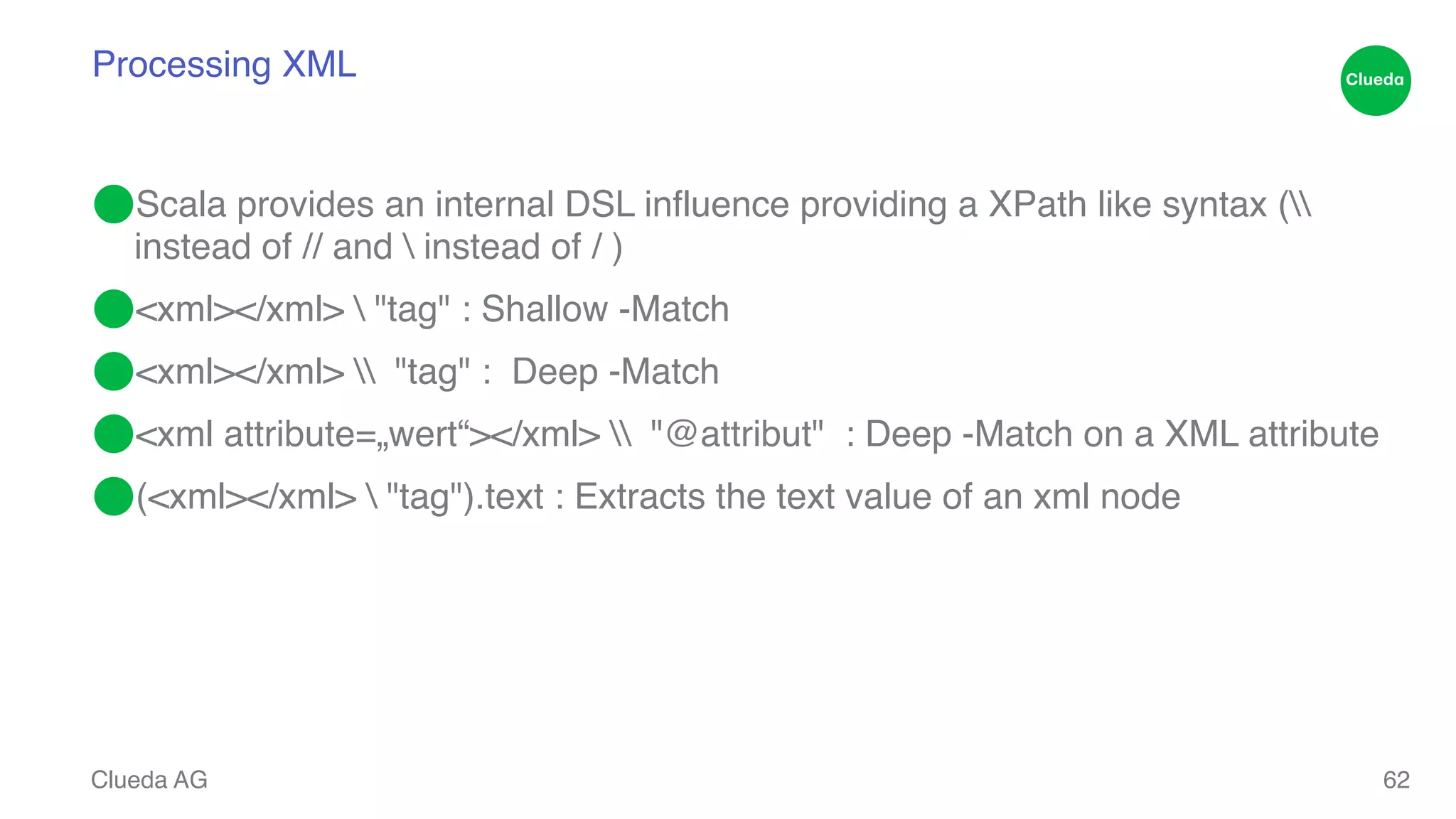
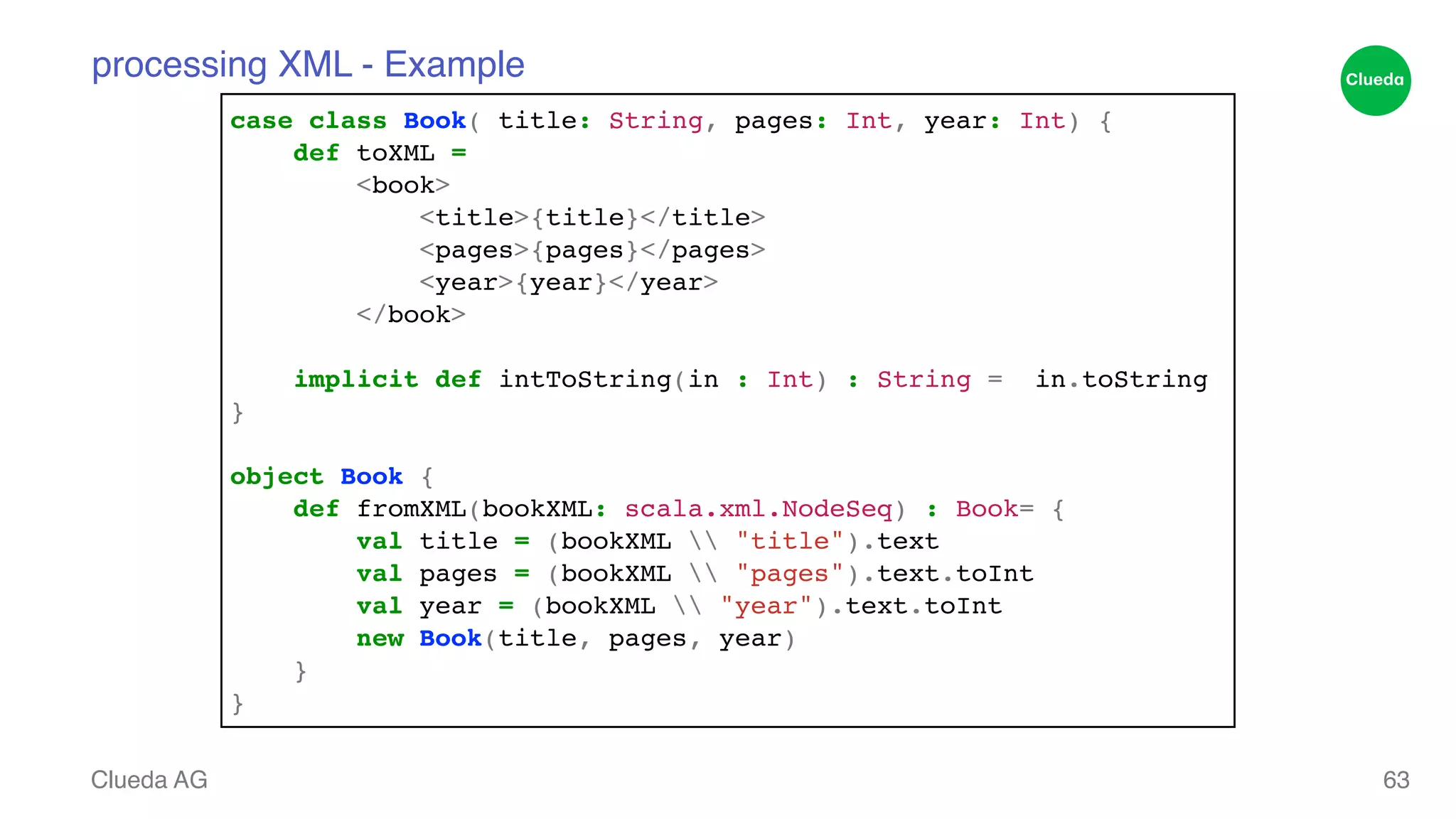
![processing XML - Result Clueda AG 64 val books = ! <books>! <book>! <title>Programming Scala</title>! <pages>883</pages>! <year>2012</year>! </book>! <book>! <title>Programming Perl</title>! <pages>1104</pages>! <year>2000</year>! </book>! <book>! <title>Necronomicon</title>! <pages>666</pages>! <year>666</year>! </book>! </books>! ! val booksInstances = (books „book") map Book.fromXML! val booksPages = (books "pages").map(_.text.toInt)! booksInstances: scala.collection.immutable.Seq[Book] = ! List(Book(Programming Scala,883,2012), Book(Programming Perl,1104,2000), Book(Necronomicon,666,666))! booksPages: scala.collection.immutable.Seq[Int] = List(883, 1104, 666)](https://image.slidesharecdn.com/clueda-scala-workshop-ci-141022021937-conversion-gate02/75/Scala-Workshop-64-2048.jpg)
![Regular Expressions ⬤Creating a regular Expression:.r aus einem String erzeugen: ! ! ! ! ! ! ⬤Uses Java-Regex-Engine to create a NFA! ⬤Regex-Object also implement extractors for pattern matching Clueda AG 65 // Using the Constructor! new scala.util.matching.Regex("hrefs?=s?"([^"]+)"")! //Changing a string to a regex with the .r method! "hrefs?=s?"([^"]+)"".r! // Using """ , no need to escape " and double escaping of ! """hrefs?=s?"([^"]+)"""".r !](https://image.slidesharecdn.com/clueda-scala-workshop-ci-141022021937-conversion-gate02/75/Scala-Workshop-65-2048.jpg)
![Regex - Usage Clueda AG 66 import scala.io.Source! ! val html = (Source fromURL "http://www.clueda.com").getLines mkString ""! ! val urlExtractor = """hrefs?=s?"([^"]+)"""".r! ! for ( urlExtractor(url) <- urlExtractor findAllIn html ) { ! ! println(s"Url -> $url")! }](https://image.slidesharecdn.com/clueda-scala-workshop-ci-141022021937-conversion-gate02/75/Scala-Workshop-66-2048.jpg)
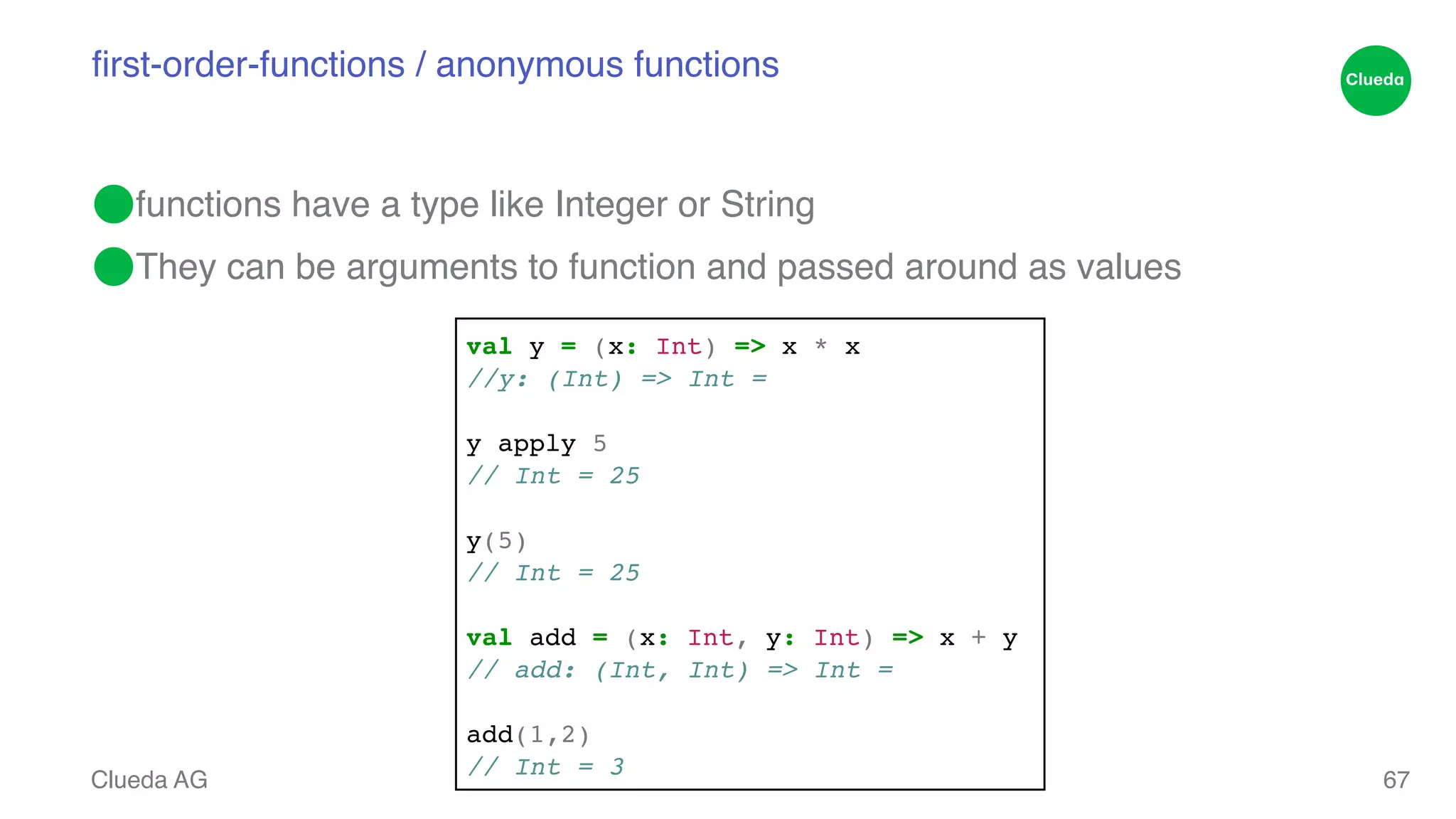
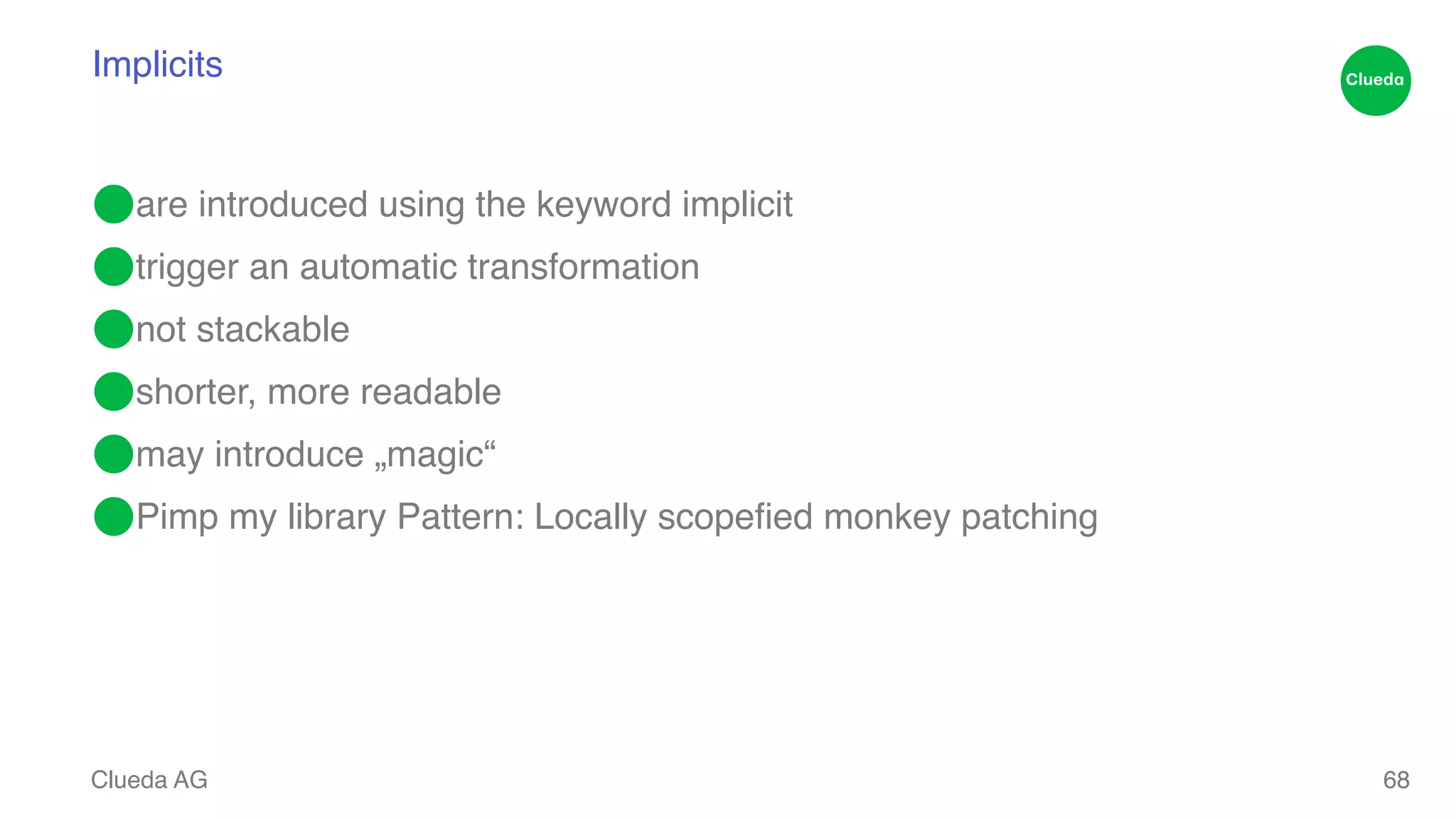
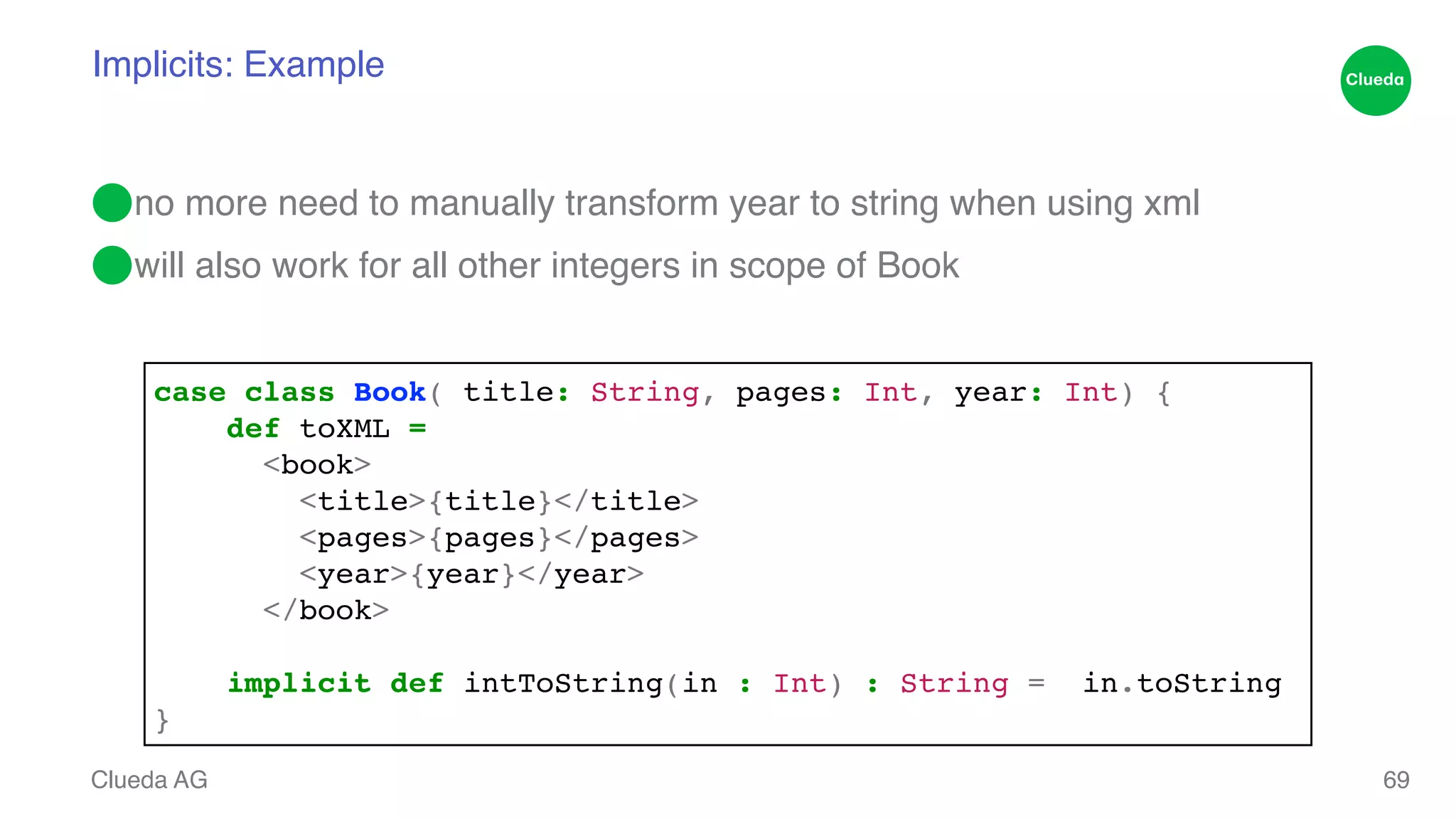
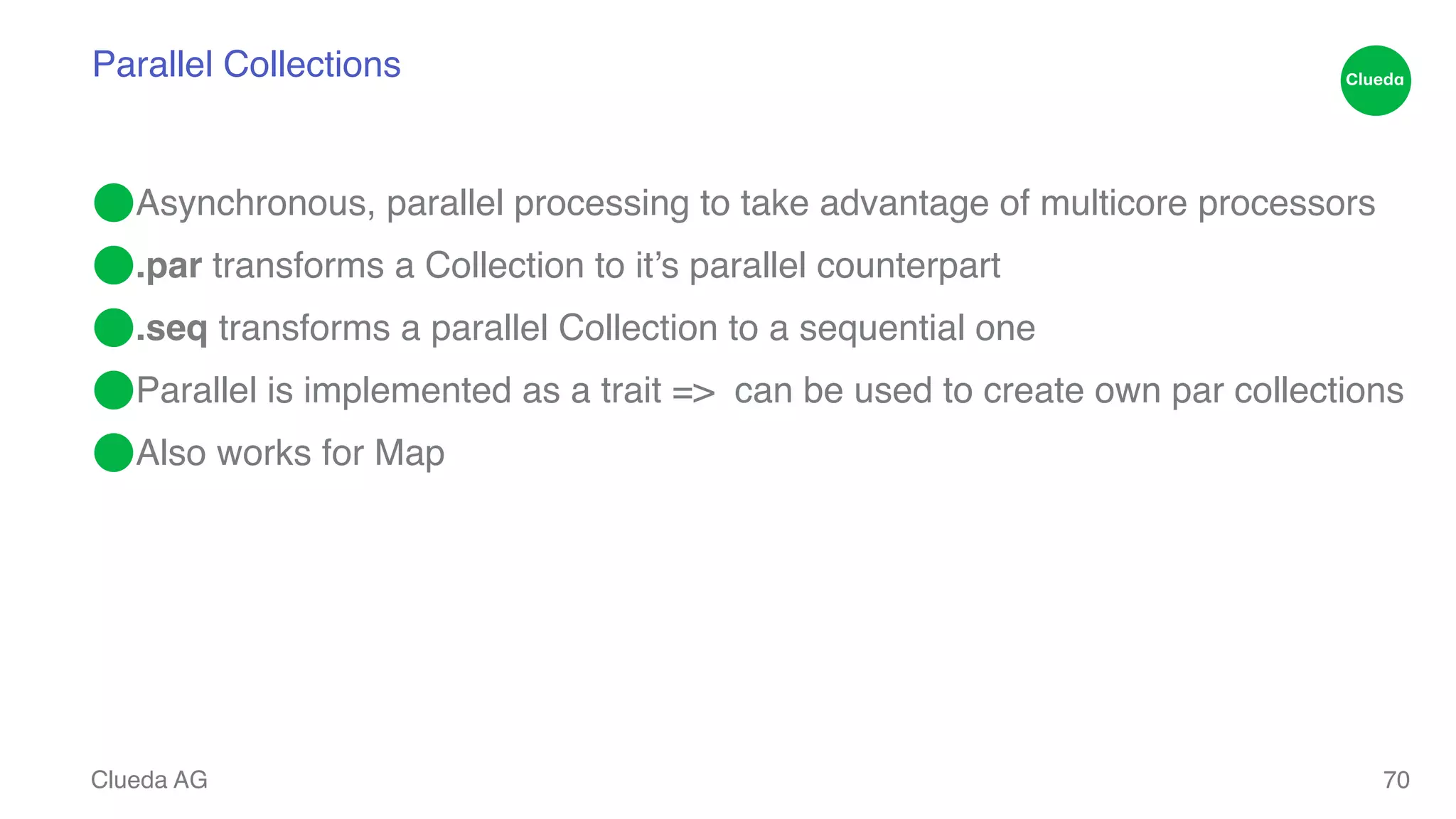
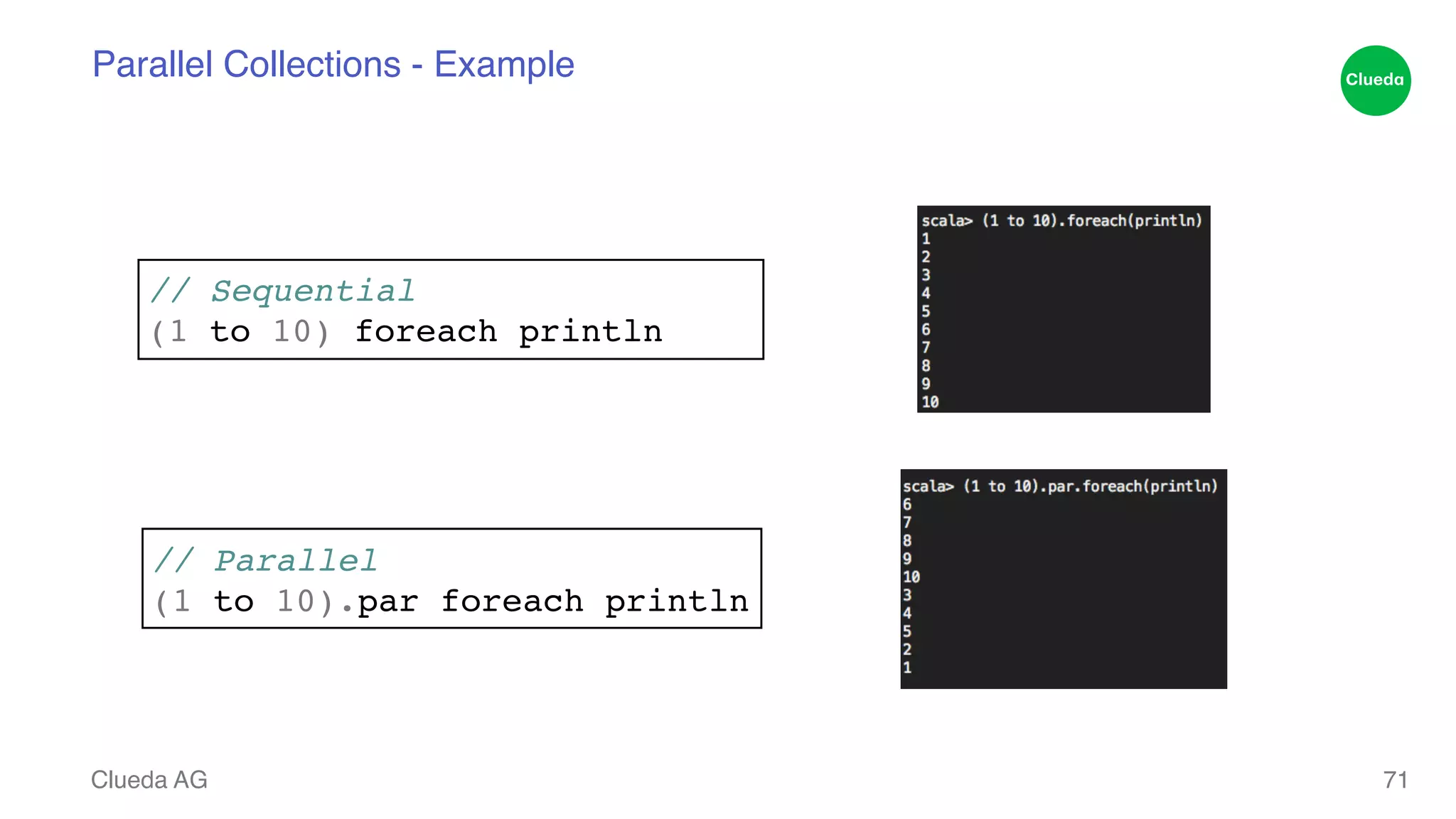
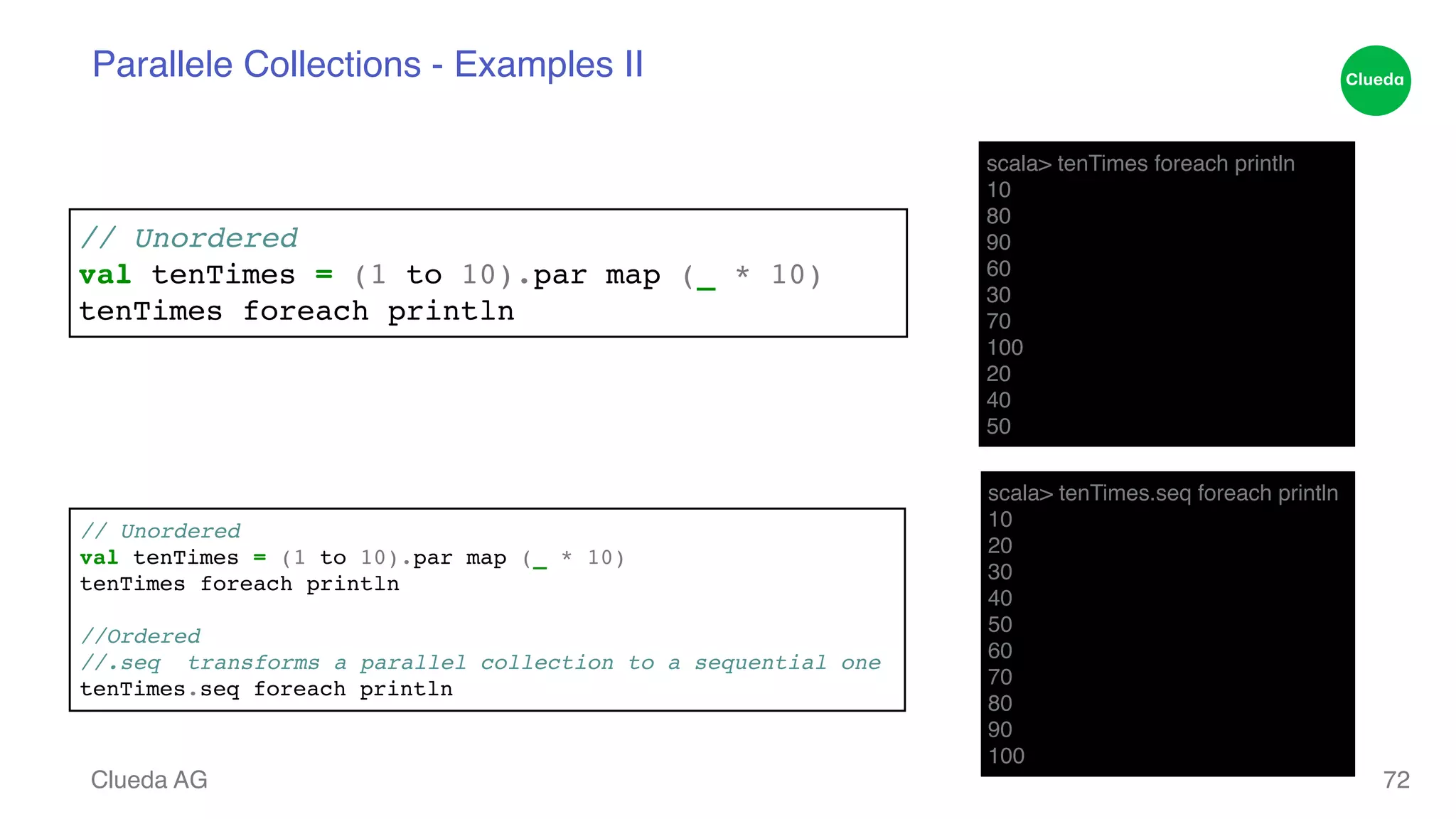
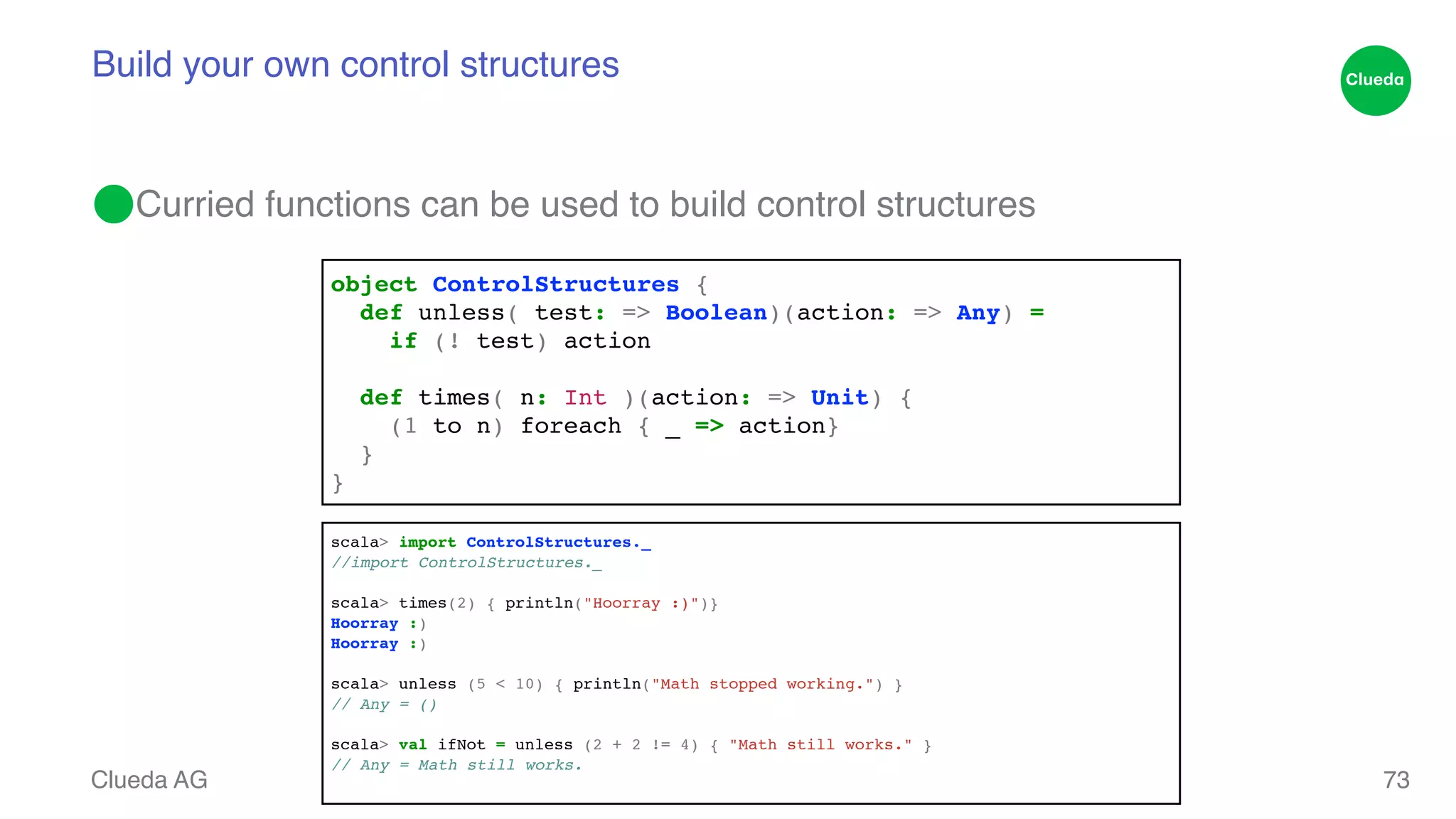
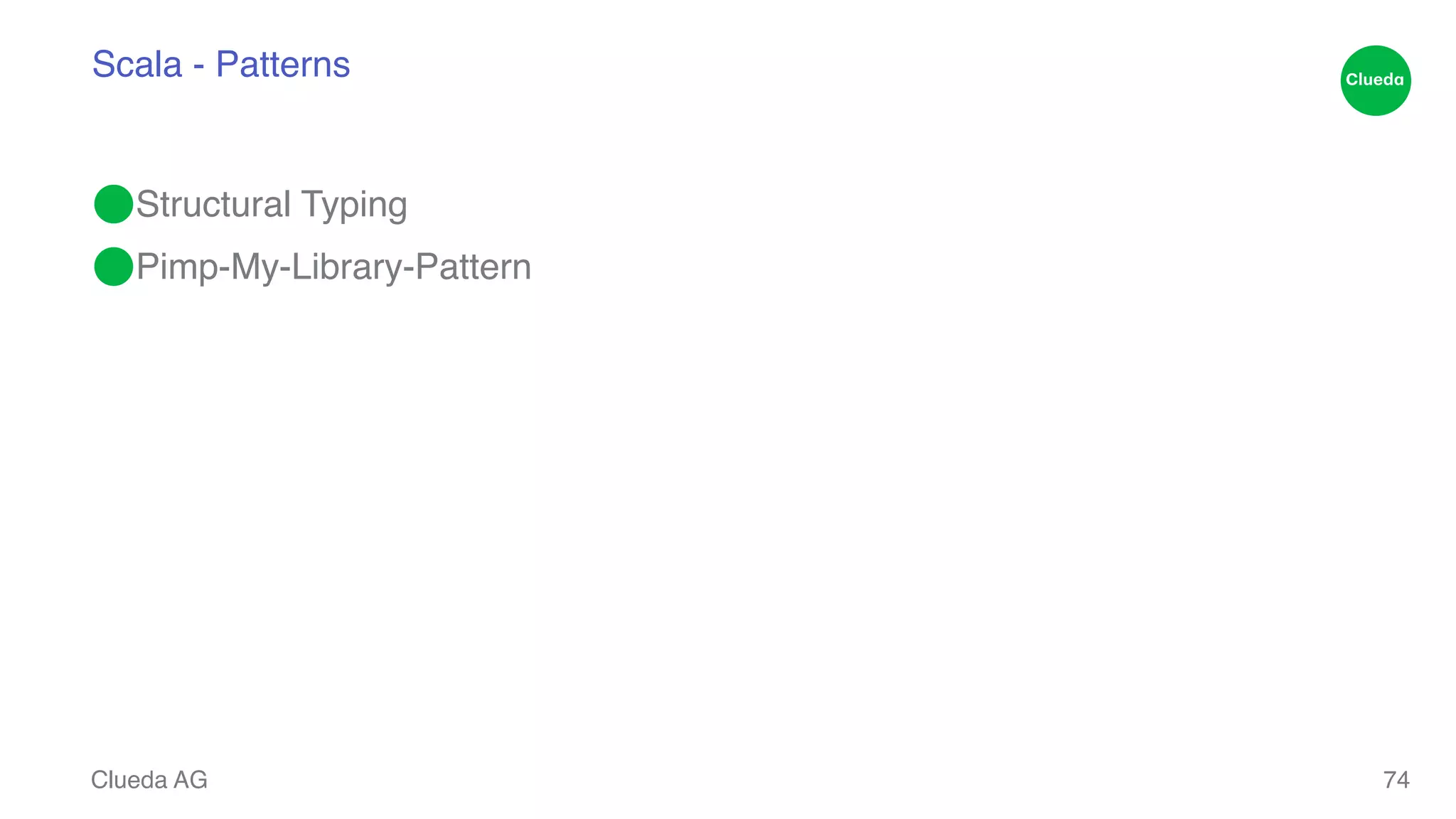
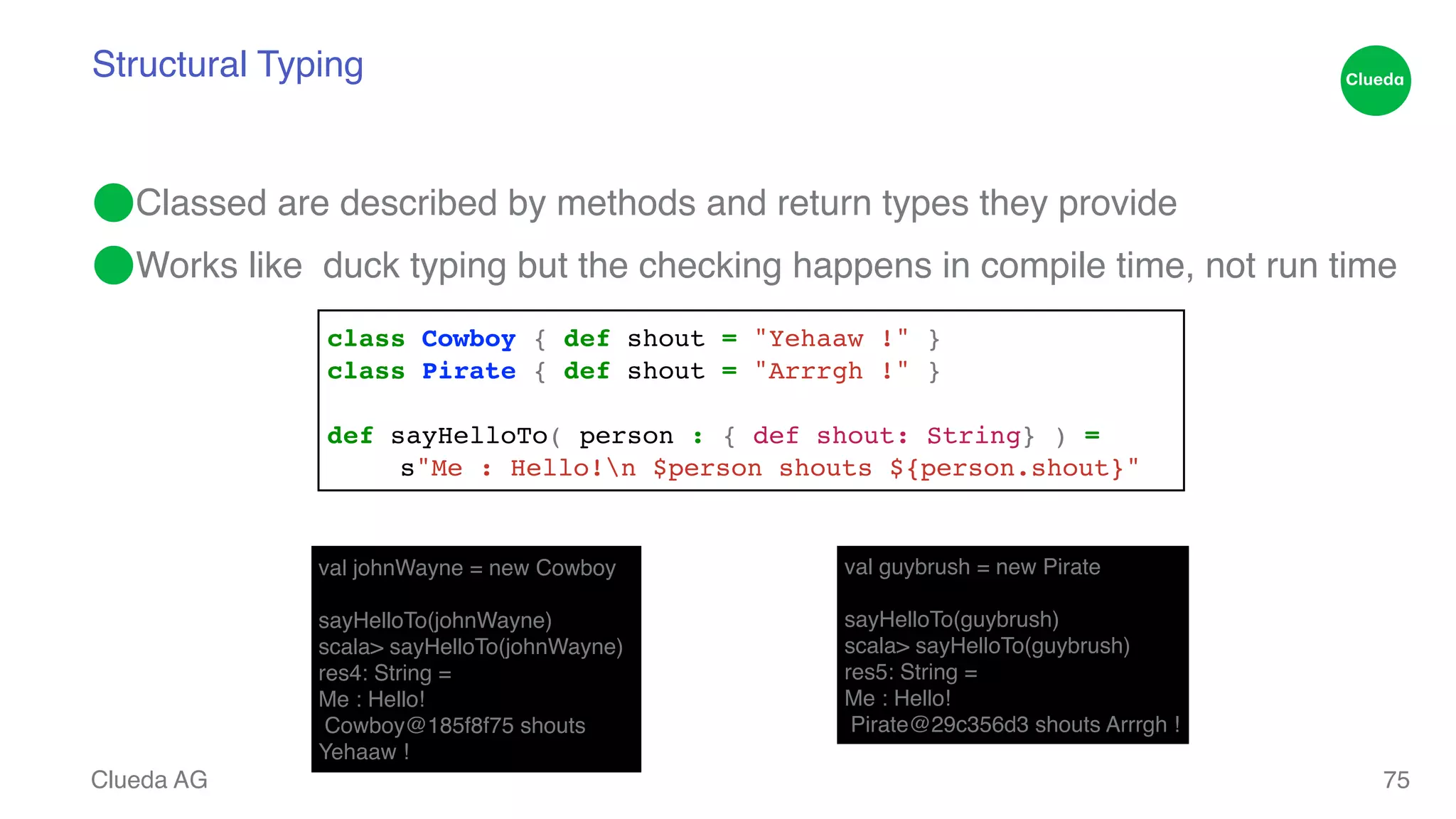
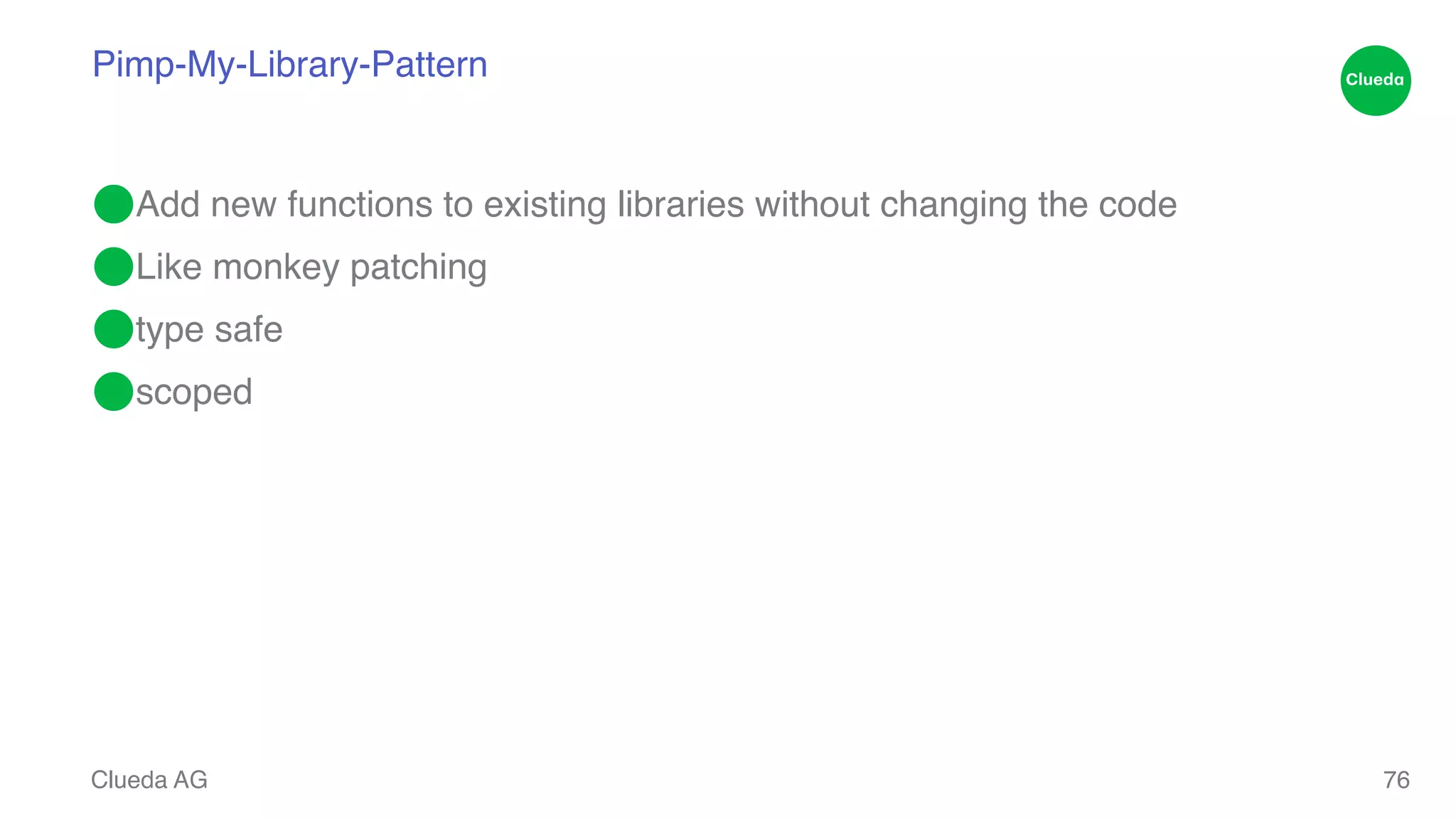
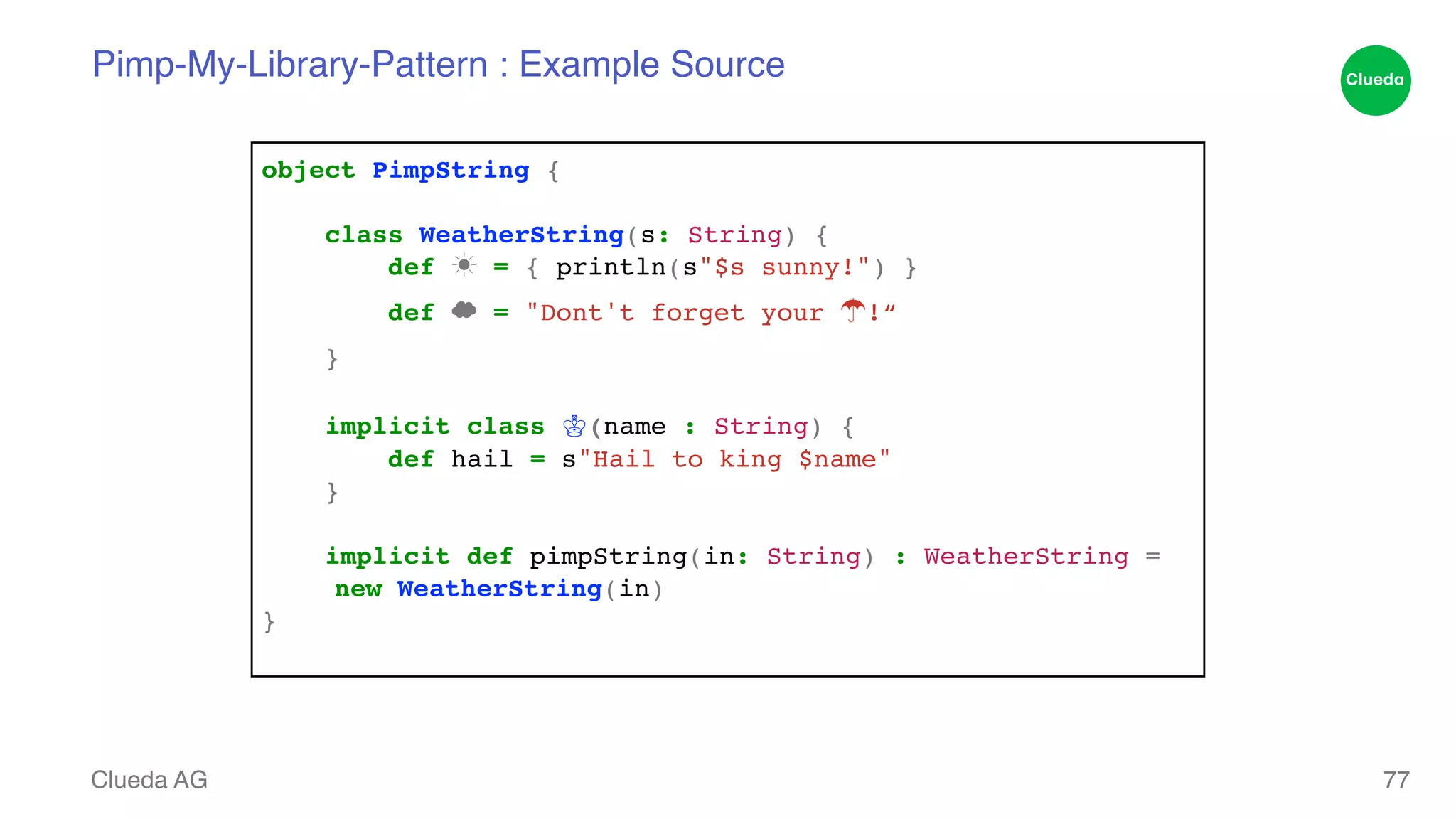
! aKing: PimpString.♔ = PimpString$$u2654@5081371! ! scala> aKing.hail! res10: String = Hail to king George 78 scala> val guys = List("James", "Louis", "Franz-Ferdinand")! guys: List[String] = List(James, Louis, Franz-Ferdinand)! ! scala> guys map (_.hail)! res13: List[String] = List(Hail to king James, Hail to king Louis, Hail to king Franz- Ferdinand)](https://image.slidesharecdn.com/clueda-scala-workshop-ci-141022021937-conversion-gate02/75/Scala-Workshop-78-2048.jpg)
